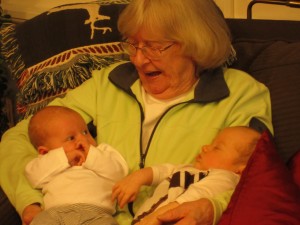Is it Rocky vs Apollo Creed, David vs Goliath? No it’s…
By Robert Fontana

Yes, ladies and gentleman, the battle of the century is upon us (as it is every year). In one corner, dressed in red, sporting a white beard, wearing a night cap, and holding a sign that reads “Shop at Macy’s,” is COMMERCIAL CLAUS, or as popularly known, SANTA.

In the other corner, wearing a priestly stole, also sporting a white beard, and carrying gifts for the poor in one hand and the shepherds staff in the other, is St. Nicholas!

LET THE RUMBLE BEGIN! It is being fought in your heart and mine. Commercial Claus is backed by the trillion dollar commercial interests from Amazon to Walmart. St. Nicholas is backed by Jesus, the carpenter from Galilee, Francis and Clare from Assisi, disciples of Jesus today, and all men and women of good will who want children to know that they are loved for who they are and not for what they possess.
December 6 is the Feast of St. Nicholas, Bishop of Myra (in modern day Turkey). He had a reputation for secretly giving gifts to people in need, which led to the rise among pious Christians of the figure of Santa Claus (Sinterklaas (Dutch: [ˌsɪntərˈklaːs]) or Sint-Nicolaas – https://en.wikipedia.org/wiki/Saint_Nicholas). Sadly, as we all know, the commercial interest of secular culture have co-opted Santa Claus for its own purpose and few people know of the saintly figure behind the secular Santa (which, ironically, means “Holy.”).
Lori and I decided when our children were small to make the Feast of St. Nicholas a special day for them so that they would understand the Christian figure behind the Santa Claus story. We are continuing that custom with the grandchildren. On St. Nicholas Day morning, they will be opening their Christmas stockings, each containing a book, a candy treat, and an orange. (Here’s a you tube link for the story of St. Nicholas for children: https://www.youtube.com/watch?v=gfsGFHbCPCM)
Here’s a reflection on the difference between St. Nicholas and Santa Claus, followed by a prayer service that families (with or without children) or friends can do to honor St. Nicholas, disciple of Jesus, and friend of the poor.
- Santa wants your credit card; Nicholas wants your heart.
- Santa will turn you into a consumer; Nicholas will help you be a servant.
- Santa is a whimsical tale of a fat old elf who gives toys to boys and girls who have been good; St. Nicholas helped children escape from poverty and slavery.
- Santa reminds us to give presents; Nicholas reminds us to give ourselves.
- Santa is controlled by the department store; Nicholas was led by the Spirit.
- Santa is a man dressed in a costume; Nicholas was a Bishop who cared for his people.
- Santa reminds us to follow the Christmas sales; Nicholas reminds us to follow Jesus.
- Santa promises us happiness through gift-giving; Nicholas reminds us that happiness is the fruit of a faithful life.
- Santa is a fun story to read to children at Christmas Eve; Nicholas was a man of great compassion who sold his possessions and gave the money to the poor so that he could do God’s will in perfect freedom.
- Santa has nothing to do with Jesus the God-Man whose birth is celebrated on Christmas Day. Nicholas’ life only makes sense because of his love and commitment to Jesus the God-Man whose birth is celebrated on Christmas Day.
A Prayer Service for the Feast of St. Nicholas, Adapted by Robert Fontana from a prayer service by Thomas G. Simons from the St. Nicholas Center.
Call To Worship
Leader: Praise God for St. Nicholas!
Children: Yea St. Nicholas!
Leader: The Spirit of the Lord was upon him.
Children: Yea St. Nicholas!
Leader: Loving God, St. Nicholas loved Jesus, and because he loved Jesus he loved children and the poor. We honor his memory today and in doing so hope to imitate his kindness and love.
Children: St. Nicholas, pray for us. Amen!
Word Service – 1 Peter 5.1–4
The following summary of the life of St. Nicholas may be read and discussed.
St. Nicholas was born to Christian parents. Legends recount the story of Nicholas’ baptism when his parents brought him to the sacred fount; he leapt from his mother’s arms into the Baptismal waters. After the death of his parents, he gave away his inheritance to the poor of Myra, and dedicated himself to serve his people first as a priest and later as a bishop.
Bishop Nicholas preached the Gospel in a Roman culture still dominated by Greek and Roman religious customs and moral behavior. He organized Churched, taught the Catholic faith, and invited non-Christians to join the community of faith. He is most remembered as a helper to the poor and to children. Once Bishop Nicholas heard that a father was struggling to feed his three daughters. He did not have the money for a marriage dowry, and was considering selling them off into slavery so they would at least have something to eat. On three occasions, Bishop Nicholas threw a bag of gold through the window into the room of the sleeping father. His daughters soon were married. Later the father came to Nicholas, fell at his feet and said, “Nicholas, you are my helper.”
This story and his many other works of charity led to the tradition of giving presents on the Feast of St. Nicholas and at Christmas. The name Santa Claus, in fact, evolved from his name.
Bishop Nicholas proclaimed the Gospel, baptized new Christians, feed the hungry and poor, and taught the truths of Christianity. He died at Myra in 350 A.D. His popularity, already great, increased when his bones were brought to Italy in 1087. Both the Eastern and Western churches honor him. St. Nicholas is the patron saint of Russia, Greece, and Sicily. He is regarded as the special patron of children. His feast is day is December 6.
If you can’t be like mother Teresa, be like Paula Mitchell
by Lori Fontana
I want to tell you about a very special person, though she may not appear special. She’s not rich or famous. You won’t read about her in the news. If you walked by her on the street, you probably wouldn’t notice her. Her hair is white; her step is slow; her hearing is failing; her hands are worn and sometimes she needs a hand to help open a jar.
But she is a beautiful woman; and she is a saint. “How so?” you might ask.
Well, I know that every day she is the hands and feet, the heart and voice of Jesus for the people with whom she lives. I follow her through the halls of her assisted living home and the adjoining nursing care home, through the dining hall, the chapel, and across the courtyard patio. Everywhere she goes, she greets each person she sees. She smiles and says each person’s name, reaching out to pat a hand, caress a shoulder. She inquires about a family member or what was served for lunch or an upcoming outing. She always introduces me, and as I greet her friends, she tells me an interesting fact or talent about each one.
The people she greets may be seated, bent over in a chair, laboriously pushing a walker, painstakingly guiding a wheelchair, or gallantly shuffling along. Always, they beam in response to her greeting, her inquiries, her gentle touch. There are some who grasp my arm to pull me closer and tell me how welcoming she is, how she helped when they first arrived, how she found a lost item for them, brought a meal to their room, refilled their teacup, showed such care for them.
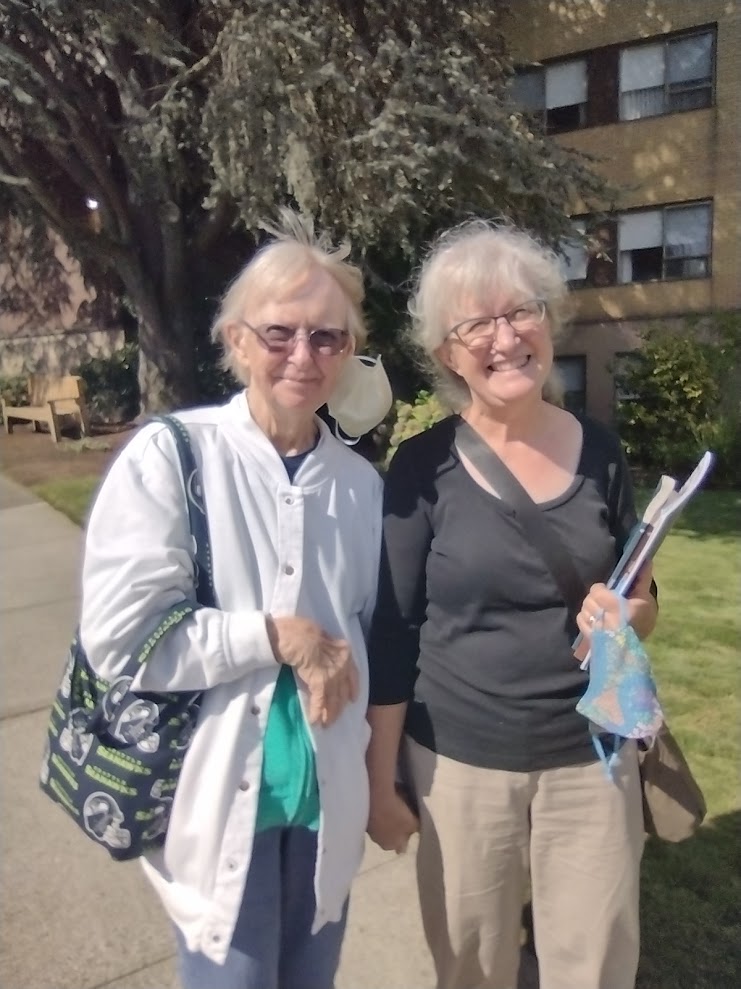
This special lady is my mom, Paula. She’s an ordinary woman in ordinary circumstances. But she has made some simple yet profound choices to live her life in an extraordinary way—the way of sainthood. St. Therese of Lisieux extols the “Little Way” of loving and following Jesus. St. Teresa of Avila knew that most of us make our journey to God in modest, often obscure ways of simply loving God and neighbor. One of her well-known prayers illustrates our common call to sainthood along a humble path:
“Christ has no body now, but yours.
No hands, no feet on earth, but yours.
Yours are the eyes through which Christ looks compassion into the world.
Yours are the feet with which Christ walks to do good.
Yours are the hands with which Christ blesses the world.”
Our vocation as Christians calls each of us to be Christ for others, wherever we find ourselves, in the providence of our everyday lives. Interestingly, my mom told me that she has changed since she moved into assisted living. She has become more outgoing, more willing to speak up, speak out, and speak to others, even folks she does not know. She confided, “I was not like this for a big part of my life. I was quiet and shy,” she said. “Not anymore. I feel confident and emboldened to speak to others, to help others, who are, perhaps, going through a hard time. I know what they are feeling, and I want to help.”
As her daughter, I know she has lived as Christ’s eyes, hands, and feet throughout her life, as a mom for many, many years in the family home. A good friend of ours pointed out at his mom’s funeral that Jesus is describing his mom (and I would say, most mothers) in Matthew’s last judgment scene:
“For I was hungry and you gave me food, I was thirsty and you gave me drink, a stranger and you welcomed me, naked and you clothed me, ill and you cared for me, in prison and you visited me.” Matt 25:35-36
This tells the story of our mothers. They have fed us, clothed us, cared for us. Jesus’ call to us is to do the same for whomever is in our circle of life. Perhaps it’s our own children; our parents or siblings or other relatives. Perhaps we have a neighbor who is elderly or alone or struggling. Maybe it’s a co-worker, a teacher or student, the person in the car ahead of us or in the grocery check-out line behind us.
Indeed, we are all called to be saints. Probably, none of us will be as influential and well-known a saint as Mother Teresa. But I do believe that we can all be like Paula—acting as Jesus would, being his hands and feet and voice, for each person we meet.
Advent & the Year of Jubilee begin December 1
By Robert Fontana
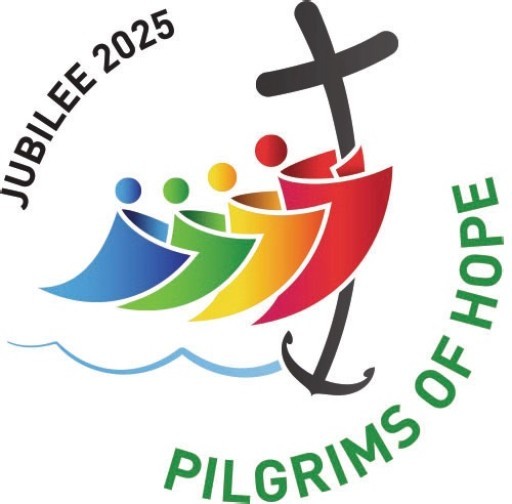
You may have missed this from the Vatican with all the fuss over the American elections in the news, but 2025 has been declared a YEAR OF JUBILEE! The custom of declaring a Jubilee Year dates back to Pope Boniface VIII in the 13th century. Boniface was not known for his holiness. Although he did not use the word “Jubilee,” he invited European Christians to journey to Rome to the place where Peter and Paul were martyred – the journey was praying on their feet, for the forgiveness of sin.
The biblical reference for a Jubilee year is Leviticus 25:10: “You shall proclaim liberty in the land for all its inhabitants. It shall be a jubilee for you, when each of you shall return to your own property, each of you to your own family.”
Jubilee 2025 begins on December 1, the first Sunday of Advent. Pope Francis writes,

“We must fan the flame of hope that has been given us, and help everyone to gain new strength and certainty by looking to the future with an open spirit, a trusting heart and far-sighted vision. The forthcoming Jubilee can contribute greatly to restoring a climate of hope and trust as a prelude to the renewal and rebirth that we so urgently desire; that is why I have chosen as the motto of the Jubilee, Pilgrims of Hope. This will indeed be the case if we are capable of recovering a sense of universal fraternity and refuse to turn a blind eye to the tragedy of rampant poverty that prevents millions of men, women, young people and children from living in a manner worthy of our human dignity.
Here I think in particular of the many refugees forced to abandon their native lands. May the voices of the poor be heard throughout this time of preparation for the Jubilee, which is meant to restore access to the fruits of the earth to everyone.
As the Bible teaches, “The sabbath of the land shall provide food for you, for yourself and for your male and female slaves and for your hired servant and the sojourner who lives with you; for your cattle also, and for the beasts that are in your land, all its yield shall be for food,” (Lev 25:6 – 7)
The spiritual dimension of the Jubilee, which calls for conversion, should also embrace these fundamental aspects of our life in society as part of a coherent whole. In the realization that all of us are pilgrims on this earth, which the Lord has charged us to till and keep (cf. Gen 2:15), may we never fail, in the course of our sojourn, to contemplate the beauty of creation and care for our common home. It is my hope that the coming Jubilee Year will be celebrated and experienced with this intention too. Growing numbers of men and women, including many young people and children, have come to realize that care for creation is an essential expression of our faith in God and our obedience to his will. (https://www.iubilaeum2025.va/en/giubileo-2025/lettera-di-papa-francesco.html)
We “Pilgrims of Hope” are being invited to pray on our feet! Pope Francis is inviting us to leave our homes and, if possible, go to Rome to pray at the tombs of the great saints Peter and Paul. And if you can’t go to Rome, go to a shrine of your choosing closer to you. Consider, especially, the diocesan Cathedral. (Lori and I are pictured below walking on the pilgrimage route to the great cathedral of Santiago, Spain.)

He invites us to leave our homes quite aware of the traumas afflicting our world. He writes about becoming pilgrims of hope without turning a “blind eye” to the millions of people suffering from intense poverty, refugees fleeing their homelands, and even the earth which is also suffering from the degradation of human exploitation. We go on pilgrimage to be transformed, to step away from what has been our normal way of doing things, and to place ourselves on a path to hear the Gospel anew. We will meet new people, have new prayer and liturgical experiences, and feel the soreness of our feet as we walk, perhaps a great distance like the 500 miles of the Camino de Santiago, or perhaps only 500 feet from the tour bus to St. Peter’s or your local cathedral or shrine.
In whatever manner we step out in pilgrimage during this Year of Jubilee, the purpose is to conform our lives more closely to the life of Jesus so that we can return home better prepared to evangelize, to share the good news of God’s love, in word and deed. Evangelization is not a “four-letter” word! Catholics resist it because we are terrified God is going to ask us to go door-to-door like the Mormons or Jehovah Witnesses or stand on the street corner like an evangelical preacher. Here’s what St. Peter says in the letter that bears his name (1 Peter 3:15 – 16):
…sanctify Christ as Lord in your hearts. Always be ready to give an explanation to anyone who asks you for a reason for your hope, but do it with gentleness and reverence…
Lori and I did a pilgrimage walk from Florence to Assisi to reflect upon the lives of saints Francis and Clare, to be inspired by their example in following Jesus. It brought us closer to each other and closer to God. It has born fruit in deepening our commitment to help migrants at the border. This Advent we will be welcoming our first migrant family from El Paso at our newly forming parish Welcome Circle. May you find the pilgrimage path that will draw you closer to God and deepen your commitment to evangelize in word and deed.
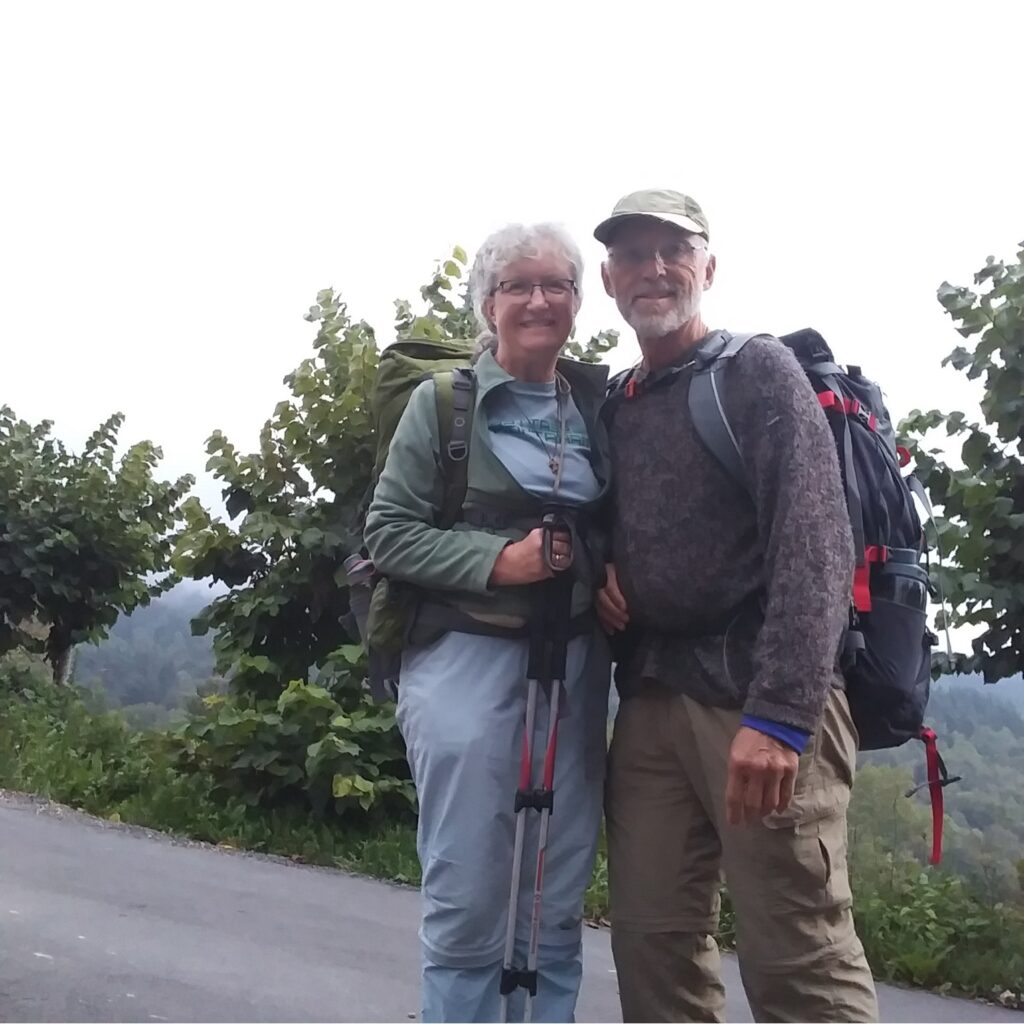
Homespun Homily: Seeing others with the eyes of faith
By Lori Fontana

What a day! In just one day, I feel like I encountered the breadth of humanity: young and old, rich and poor, people of all colors and in so many life circumstances. Let me describe.
The day began with seeing our two grandsons off to school. They are bright, curious boys with long, scruffy hair and skinned knees from soccer games and wrestling with each other in the yard. They are loving and sassy, at times cooperative. at other times, sullen and belligerent. Their lives stretch before them, filled with possibilities.
I then headed to the nursing home where my mom lives. She’s 94 and only recently has needed more care. Six months ago, she spent her days playing Scrabble or Bingo, visiting with other residents, attending prayer in the chapel, and even doing her own laundry. Now, she is pretty much confined to her wheelchair, as her legs have now decided they can’t reliably support her. Though physically declining, she is still gracious and caring to others. As we ate lunch with some other residents, she paused between bites to comment to her neighbor, “You look so nice in that red blouse,” and “Try those mashed potatoes; they’re delicious today.”
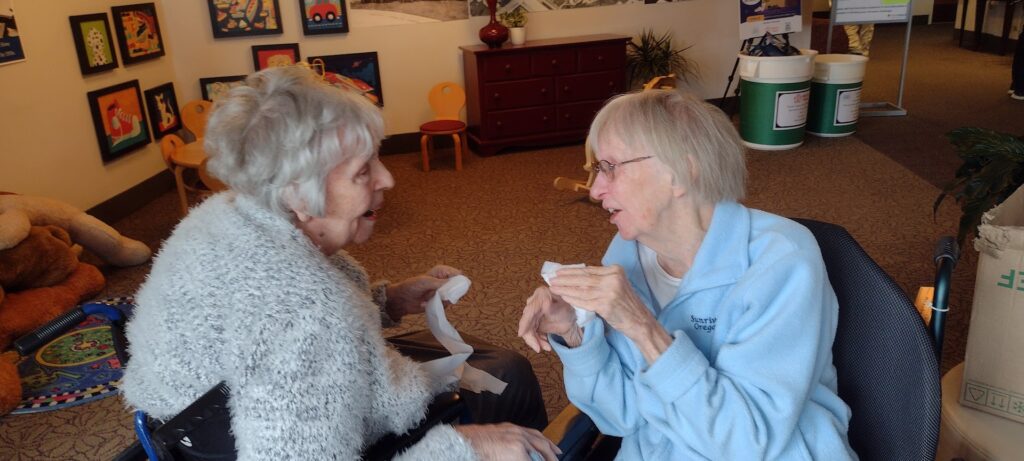
The other residents at her table were not as aware as she is; some don’t speak at all. But my mom spoke to them with gentleness and kindness. She honored them by greeting them, even when they were unable to respond.
During the meal, I noticed the nursing home staff: the busy nurses who distributed medications and charted medical notes; the aides who cheerfully visited with residents, answering questions, handing someone a drink of water, or helping some residents eat their meal. There were the housekeeping staff members – sweeping, mopping, preparing plates of food, washing dishes. Almost to a person, these were people from the four corners of the earth: Eritrea, Somalia, China, the Philippines, Mexico. They worked with a quiet dignity, showing loving respect to all the residents as well as to each other. Even when a resident was sad or agitated, the atmosphere remained peaceful and caring.
After lunch, I wheeled my mom to the first floor where there is a preschool and nursery. From the hallway, we could look into the “toddler room” through floor-to-ceiling windows. We saw little cherubs of all shapes and colors playing dress-up, cuddling with stuffed animals, painting, climbing, twirling, and at times bumping into each other or grabbing a toy. It was messy and joyful with runny noses and squeals and tears. What energy and zest! These young ones brought smiles to my mom and me, as they do to all who behold them.
From my lovely visit with my mom, I caught a city bus home. The bus riders were people of all colors and dress. There was a lovely African American woman seated next to me, looking tired but serene, reading a book, perhaps returning home after a day’s work.
Ahead, at the front of the bus, sat a young couple. Their clothing was disheveled; their hair appeared unwashed and uncombed. They carried large bundles and bags and a bulky box of Pampers. While the young man gazed out the window, the young woman leaned forward, seemingly exhausted and trying to sleep. The bus jostled her back and forth, and I worried that she would tumble into the aisle. But she didn’t. I could imagine that the couple was taking respite on the bus, warming themselves and enjoying a few moments of peace.
Behind me was a middle-aged man who, halfway through the bus ride downtown, began to talk loudly as if having a conversation with someone. Gesturing with his hands and shaking his head, he rummaged through a plastic bag on the floor in front of his seat. His loud behavior indicated some mental suffering or illness.
My initial reaction was fear and anxiety. But then my thoughts turned to an awesome truth. This man is a child of God. Yes, he appears to be suffering or perhaps not quite in his right mind. He needs care, far more than I could give. But he is a child of God.
So too the young couple, trying to get a few moments of peace surrounded by their worldly belongings on a bus – they, too, are children of God. As I thought back over my entire day: my bus companions, exuberant toddlers, the tired elderly folks, my mom, our grandchildren … each is a child of God, God’s beloved.
Life has a way of wearing us down, clouding our true nature. After just a short time of living, we’re not as bright and shiny, carefree and joy-filled as those little two-year-olds. We suffer, we doubt, we fall, we fail, and in the end, we know we will die.

But God wants more for us. God does love each one of us with an unconditional, everlasting love. When I embrace my deepest identity as God’s beloved, then it’s so much easier to open my heart to all my sisters and brothers. I can look beneath life’s tarnish and see that here in the nursing home, here on the bus, here in the nursery, here in my own home, each person is a child of God.
How does that truth make a difference? It means I look upon each person I meet with reverence. I can smile and say hello. In some cases, I’m able to help with a listening ear or directions. In other situations, it may not be wise to approach or speak to the person, but I can look with kindness upon them and say a prayer that they receive the help they need.
One more little story: as I waited at the bus stop that day, a middle-aged woman asked me for money. I replied that I didn’t have cash, but would she like to share my fig cookies? She declined and started to walk away, but then turned back, and we had a short friendly conversation. Rather than drawing back in fear, I had reached out with a humble offer, and we shared a holy moment.
It’s a good reminder: all of us begin life as innocent, pure babies. Then life happens, and we become a bit scuffed and scraped, enduring challenges and disappointments. We are all wounded. But can I rise to the call of our faith? Can I see into the heart of each person and know them as God’s beloved?
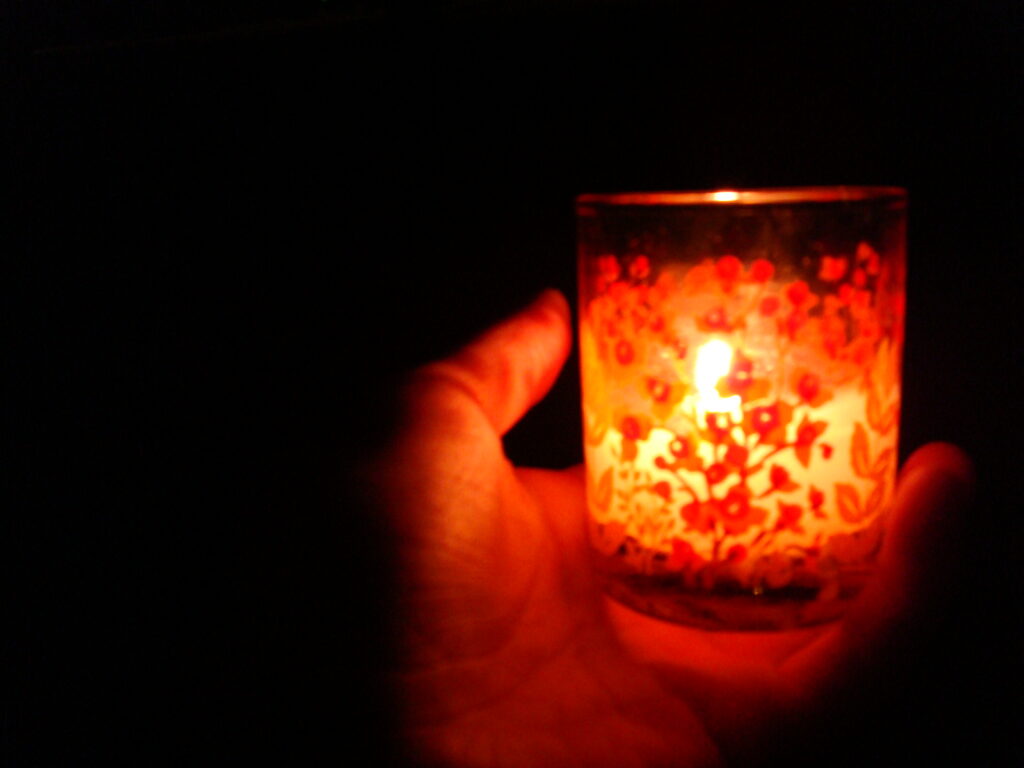
The Month of All Souls and the Altar of Remembrance
By Lori Fontana
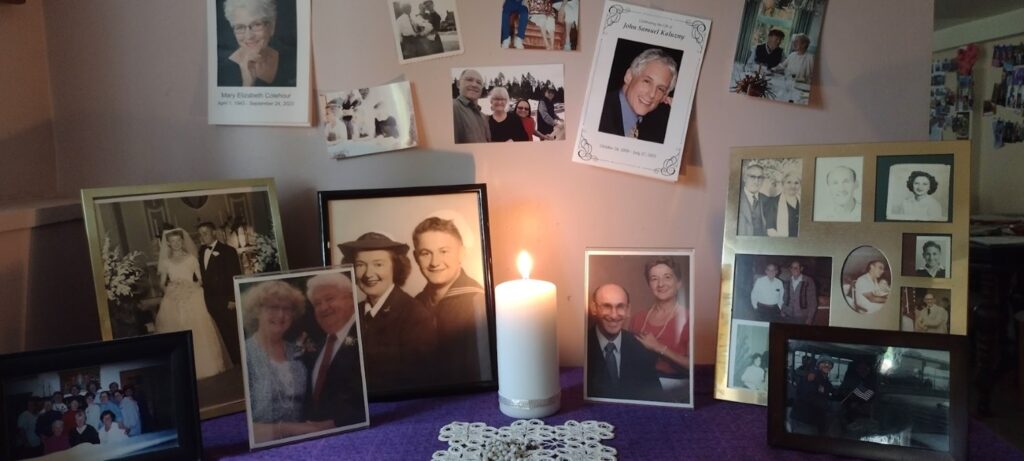
The Feast of All Saints (the feast day for ALL of us) and the Feast of All Souls—remembering our loved ones who have gone before us. Two great feast days of our church which provide the occasion to grieve and remember, to celebrate and honor. Every November, we set up an “All Saints / All Souls” altar in our home.
We gather photos of our family members and friends who have died, both recently and long ago. We display the photos on a tabletop with a nice cloth covering, candles, flowers, and other momentos which remind us of our loved ones. Through our faith, we believe that loved ones who have died are still close to us, in the communion of saints. Our November altar brings them near, reminds us to pray for them, prompts us to honor them, helps us to grieve and let go. Perhaps you can create your own home altar for this prayerful month.
HOPE IN THE RESURRECTION
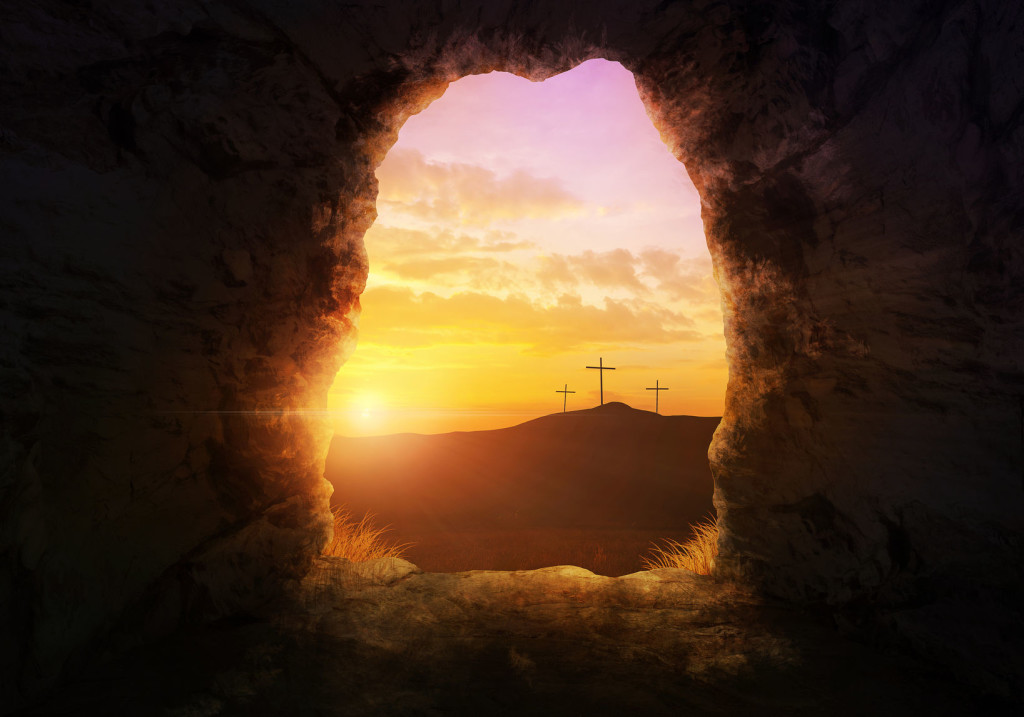
Wisdom 3:1-6 The souls of the righteous are in the hand of God, and no torment shall touch them. They seemed, in the view of the foolish, to be dead; and their passing away was thought an affliction and their going forth from us, utter destruction. But they are in peace. For if to others, indeed, they seem punished yet is their hope full of immortality; Chastised a little, they shall be greatly blessed, because God tried them and found them worthy of himself.
1 Thessalonians 4:13-18 We do not want you to be unaware, brothers and sisters, about those who have fallen asleep, so that you may not grieve like the rest, who have no hope. For if we believe that Jesus died and rose, so too will God, through Jesus, bring with him those who have fallen asleep. Indeed, we tell you this, on the word of the Lord, that we who are alive, who are left until the coming of the Lord,* will surely not precede those who have fallen asleep. For the Lord himself, with a word of command, with the voice of an archangel and with the trumpet of God, will come down from heaven, and the dead in Christ will rise first. Then we who are alive, who are left, will be caught up together* with them in the clouds to meet the Lord in the air. Thus we shall always be with the Lord. Therefore, console one another with these words.
Becoming the perfect Church…Ha! Ha! Ha! There’s no such thing, but…
By Robert Fontana
When I was young (and dumb) and beginning my life in ministry, I was filled with zeal as a Catholic and disciple of Jesus. Zeal led me to do apostolic work at a parish which served a Navajo reservation in New Mexico, and then to the seminary to see if God was calling me to be a priest. After deciding “No” to that question, I joined a Catholic household of students at LSU, hoping to capture the idealism and lifestyle of the first followers of Jesus.

I seemed to be driven by some vague notion that there was a much better way of being church than what my parents’ generation had modeled for me. There must be a way to perfectly imitate Jesus and the saints by willingly renouncing worldly possessions and living in community among the poor and spiritually abandoned. Lori and I were so captivated by this idea that we, with three small children, moved with other families to a poor neighborhood in south Louisiana to create the perfect church.
Guess what happened?
WE FAILED MISERABLY! We argued endlessly over the rules of community life, could never agree on how to integrate children into such a project, rarely shared in fun, and never learned how to resolve conflict. We tried to create the perfect structure for being the perfect disciples of Jesus without first getting to know one another, discovering how different we were from each other, and learning how to simply get along.
That failure taught us a lot – mostly not what to do. But also it opened my eyes to the illusion of trying to be the “perfect church” because there is no such thing. It did not exist when Jesus was walking with his disciples – they continued to argue about which one was the greatest; and one of them ended up betraying Jesus.
The perfect church did not exist following the giving of the Spirit at Pentecost – the widows of the Greek-speaking members were being left out of the distribution of food and services, and there were intense arguments over how to welcome non-Jews into the community.
The perfect church did not happen during early church history: in the fourth century, after Christianity was legalized, there was basically a civil war between Christians who followed Arius and those who were Orthodox or Catholic. Arius was condemned at the Council of Nicea but that did not prevent violence from breaking out between the two sides.

So, if we cannot work to build the perfect church, can we work to build the church to which the Holy Spirit is guiding us? This is the focus of our upcoming retreat scheduled for Saturday, October 26th, with Fr. Dennis Berry, ST, and Sr. Debra Wilson, MSBT (information below).
Perhaps this goal, the church desired by the Holy Spirit, is as elusive as seeking the perfect church. Indeed, how can we discern how the Holy Spirit is guiding God’s people in this particular time of history? This is not an easy task for a church that is global, is situated in a multitude of different languages and cultures, and is rocked by its own internal divisions caused by the clergy sex abuse crisis and tensions between traditionalists, moderates, and progressives.
As we prepare for this retreat, we are mindful of four dimensions of Catholic life that we hold together as we discern how to become the church that the Holy Spirit wants:
1. the New Testament witness of the life and teachings of Jesus and his first followers;
2. the example of the saints;
3. the theology and pastoral direction of the 2nd Vatican Council;
4. the leadership of Pope Francis.

We invite everyone to participate in our retreat weekend, but for those who cannot attend in person, let me ask you the following:
When you consider the tensions within the church and society today, which stories from the life of Jesus and which of his teachings and those of the New Testament writers resonate with you, and why?
When you consider the tensions within the church and society, which examples of the saints resonate with you, and why?
When you consider the tensions within the church and society today, what teachings and pastoral directions of the 2nd Vatican Council (as you understand them) resonate with you, and why?
When you consider the tensions within the church and society today, what from the leadership of Pope Francis resonates with you, and why?
You might take some time for your own retreat and reflect on these questions. I would love to have you write your responses to me (send to Robert@catholiclifeministries.org).
__________________________________________________
If you live in the Pacific Northwest, please join us for this day of prayer and study with two very outstanding presenters. You will not regret the time spent meeting new people, renewing old friendships, praying, learning, sharing in small groups, and concluding with the celebration of the Eucharist.
Place: Assumption Catholic Church, 6201 33rd Ave NE, Seattle, WA 98115. We will conclude with the vigil Mass!
Cost: $30 (single), $50 (couple) Scholarships available.
Please bring your own brown bag lunch. Snacks/drinks will be provided. To register: Email: Robert@catholiclifeministries.org that you wish to participate, and pay the fee at catholiclifeministries.org/donate/ OR bring a check to the retreat, payable to CLM.
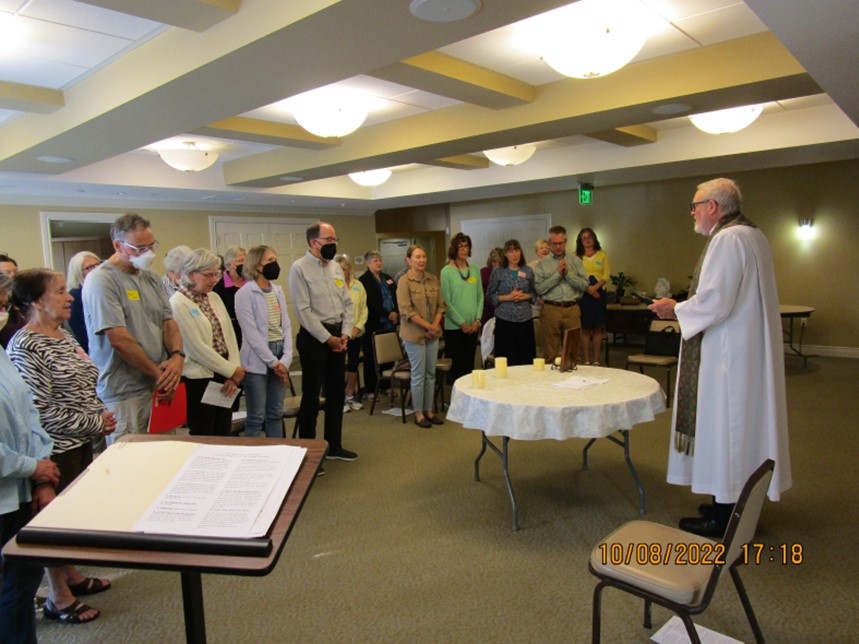
Homespun Homily: We don’t choose how we’re going to die but we can choose how we’re going to live!
By Lori Fontana
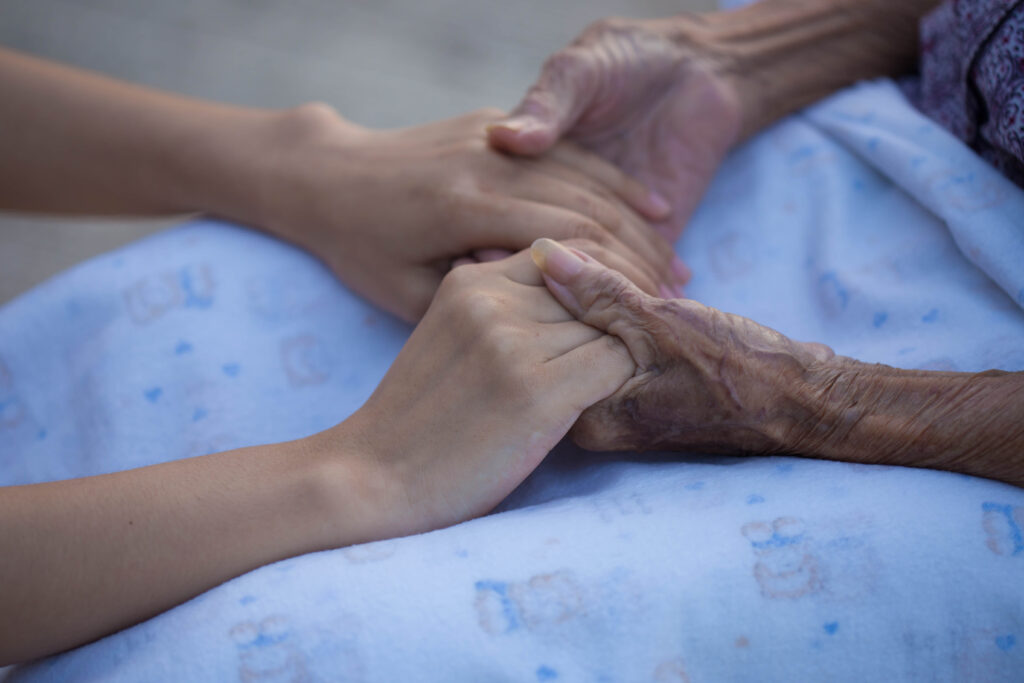
We don’t think it’s gonna happen to us. Mostly, I think we try to not think of IT at all. Aging. Dying. But it’s happening to each one of us. Right now. With every breath, every step, we’re growing older; we’re closer to our death.
This has become a daily reflection for me over the past year, even more so in the past few months. In 2023 – 2024, a dozen of our friends, people very close to us in our life circle, have died. Some had lived long fruitful lives. Others died too soon. Death came from illness or accidents; a few died from old age.
Very recently, a family member’s health has declined rapidly, and I’ve helped to care for her. It’s a beautiful task, humbling…and hard! From being quite independent 6 months ago, she now pretty much needs constant care – physical help for daily activities and compassionate reassurance throughout the day.
For several days, I tried to manage her care in my home and very quickly realized that I don’t have the strength, skills, or adequately safe environment for that. But her time with us in our home was so precious. We shared laughter, memories, family stories. We put our heads together to do the newspaper’s daily “Word Jumble.” We watched awe-inspiring and silly animal videos on YouTube – baby seals and brightly colored birds doing their mating dances. We went for short walks, I pushing her wheelchair, to see the fall colors and the rainbow of dahlias still in bloom.
Sometimes there was confusion: “Where am I?” “Why don’t my legs work anymore?” “Why am I so sleepy?” And, “God, why am I still here, on earth?”

These are questions we may all have as we age, if and when we stop to reflect on the reality that we will all die. This is a hard truth, but it’s not bad. It’s the circle of life, and it’s part of God’s plan which leads us to eternal life. Oh, we can choose to face death with fear and resistance or even complete denial. OR we can live our lives and face our death with thanksgiving and perseverance. As my loved one pointed out one morning, “We Christians don’t choose how we’re going to die… but we can choose how we will live each day.” And she so graciously does choose kindness and love each day and shares this with others.
For me, it boils down to two actions of the will – gratitude and trust. What can I thank God for today? Large blessings – I live in a safe, prosperous country (with problems, yes, but a good place overall); I have an abundance and variety of good food; I have a warm bed at night; I have loving family and friends. The list is long. And then there are small graces – morning coffee with cream; the hummingbird outside my window; the laughter of grandchildren; a good-night kiss from my beloved.
There now is science that proves that a grateful heart contributes to overall happiness and well-being, and even longer life! It’s not hard to foster the habit of gratitude. Try making a “Gratitude List,” and add to it every day. Or give thanks to God each evening before you sleep – tell God what you are grateful for from the day just lived.
The other habit I’m working at is TRUST. I think it’s a matter of asking, “Do I believe in God or not?” God promises to be always with us (Joshua 1:9); to supply our needs (Philippians 4:19); to give us good gifts (Luke 11: 9-13) and the desires of our hearts (Psalm 37:3-4); to bring good from our trials (Romans 8:28); to not try us beyond our abilities (1 Cor 10:13). Can we act out of these promises, through times both good and difficult?
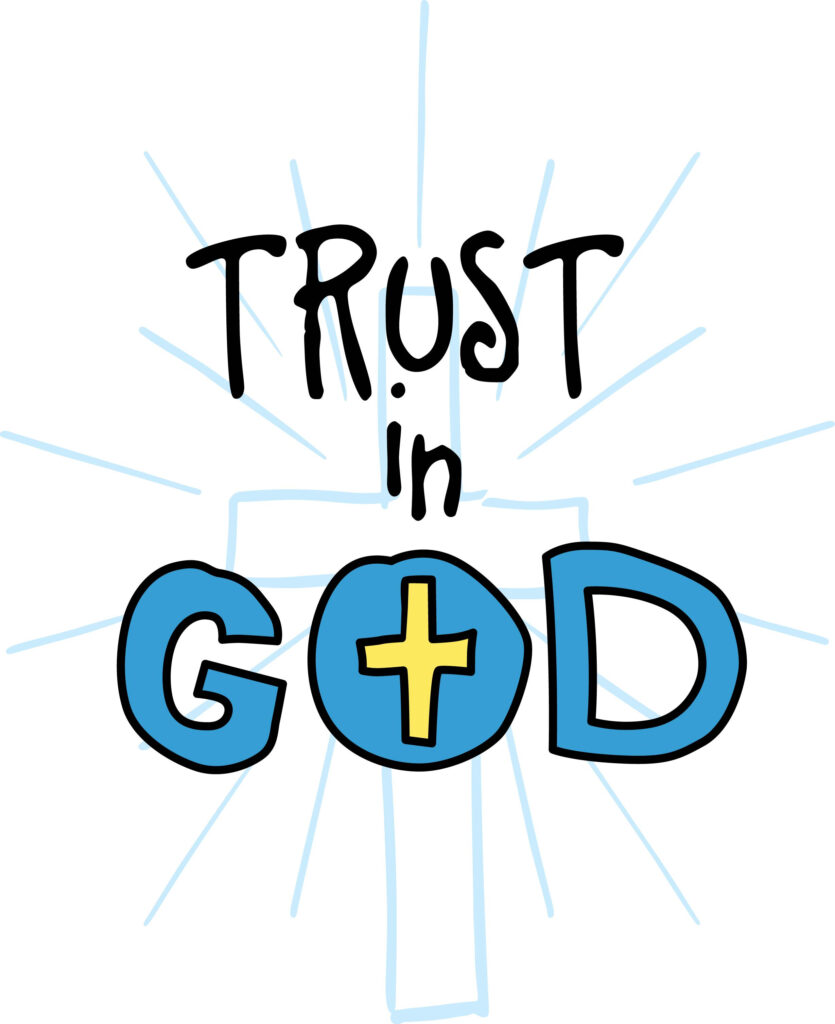
Where are we headed? What is our future? I think these are worthy reflections for us at any age. If we’re realistic and honest, these questions can guide our living, day-to-day. God doesn’t promise to take away all difficulties and challenges. But God does promises love and grace and to be with us through it all. That can make all the difference. When we trust God’s love and presence, we can have a grateful heart every day of our lives.
Christian Marriage is Beautiful…and Hard
By Robert Fontana
Christian marriage is beautiful, wonderful, amazing, and awesome because marriage, when done right, brings about what St. Paul calls the fruits of the Spirit: love, joy, peace, patience, kindness, goodness, faithfulness, gentleness, and self-control. (Gal 5:22-23) And this is true, of course, for secular marriages as well. I have a bias towards marriage as a Catholic who accepts the Catholic worldview on marriage: a life-long covenant, freely entered, that welcomes children.
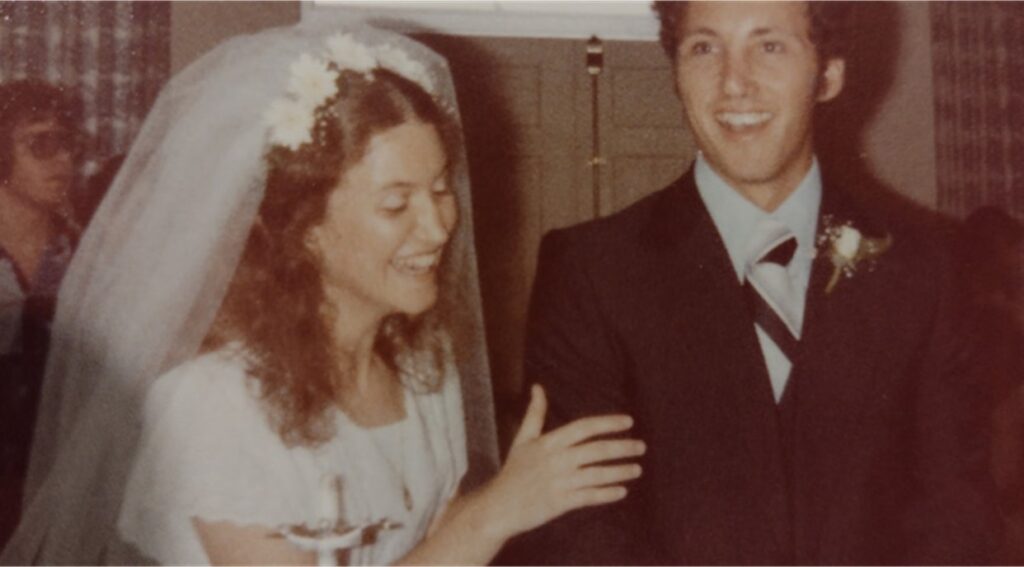
But the social research supports what Catholics and other people of faith believe about marriage. Basically, IT’S A GREAT INSTITUTION that needs to be valued, protected, and supported because successful marriages contribute so much good to society. In her book The Case for Marriage (© 2000), University of Chicago sociologist Linda Waite and co-author Maggie Gallagher document evidence from social research around the country regarding the state of marriage in America. What they discovered was that people who are married are happier, wealthier, healthier, have children who are more likely to succeed, and have better sex lives than their fellow American who were co-habiting or single (never married, divorced, or widowed). Yes, contrary to the jokes and the Hollywood image of swinging singles, married people report sex lives which have almost the same frequency as their co-habiting counterparts, more frequency than their single counterparts, and more enjoyable and meaningful than both groups!
Some might say, well Rob, that research is old. Maybe things have changed. We increasingly live in a post-marriage culture. Young people are moving in together and remaining unmarried in greater numbers. They are not having children; instead they get dogs. What does the research say about marriage in the post-pandemic America of today?

Good question. Because Brad Wilcox, professor of sociology and director of the National Marriage Project at the University of Virginia, has completed research on the state of marriage in America… and guess what he found out? The conclusions that Waite and Gallagher wrote in 2000 hold up today in 2024. Wilcox concludes in his book, Get Married, that Americans must, in fact, “save civilization” by embracing marriage and forging strong families!
THERE ARE NO LOSERS WHEN MARRIAGE SUCCEEDS! Everybody wins! In fact, contrary to popular myth, the biggest winners in successful marriages are MEN!! Marriage isn’t a ball and chain holding men down. Marriage is what most men need to mature and become their best selves.
Certainly, women and children thrive when marriage succeeds, but the evidence shows that men especially do. Married men enjoy more physical and mental health, live longer, and report happier and more meaningful lives than their single male counterparts. Single men, as they age, suffer more episodes of depression, struggle with isolation, turn more often to alcohol, drugs, porn, and watching sports to cope, and die younger than their married counterparts.
Christian marriage adds a special purpose to marriage that both enriches married love and spreads its goodness. Christian marriage is all about Jesus and his mission on earth, to announce the good news of the Kingdom of God. Jesus described the Kingdom of God as a “treasure” discovered in a field and a “pearl of great price” for which one is to sell everything to purchase. (Mt 13:44-46)
The “Kingdom of God” is nothing less than the Holy Spirit fully alive and active in creation: working for love to overcome hate, hope to conquer despair, and faith to be victorious over sin and suffering. The Kingdom of God is vast and present in creation and among all people who sincerely seek God and strive to be guided by love. It is most visible in the life, death, and resurrection of Jesus.
Jesus proclaimed the Kingdom of God not simply to get you and me to heaven but to bring heaven to earth. Indeed, he taught us to pray that “thy kingdom come; thy will be done on earth as it is in heaven.”
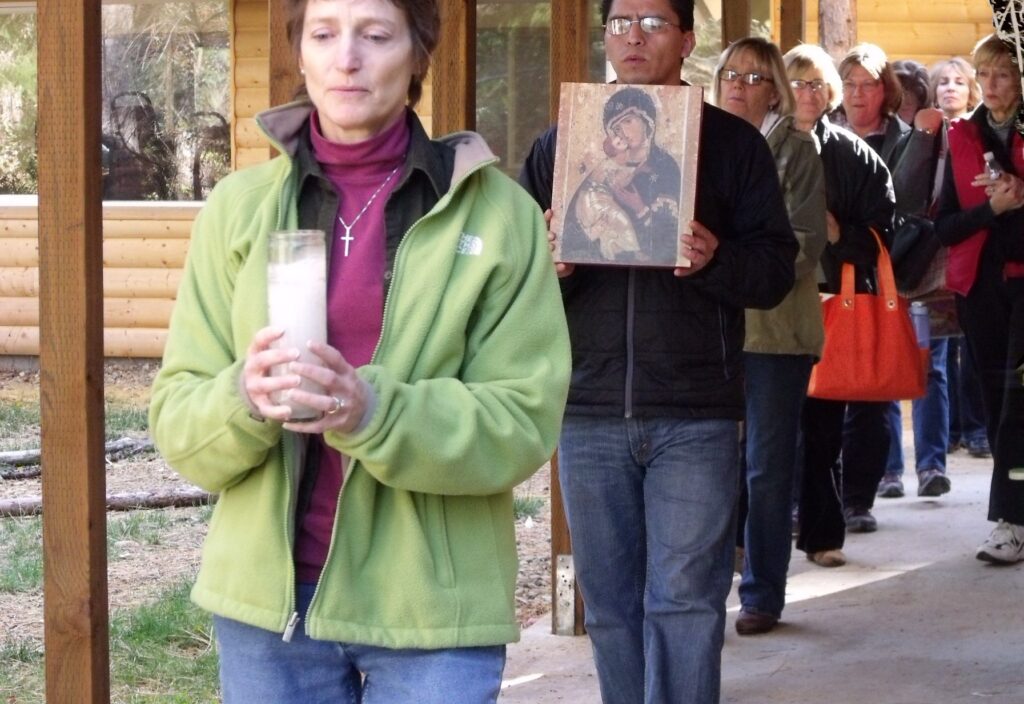
Christian marriage, as a sacrament of the Church, is a building block for the Kingdom of God on earth. It is a visible and tangible institution that God uses to build strong individuals, families, neighborhoods, schools — the foundation for a good and just society. It is a visible sign of God’s love for humanity and all creation (Ephesians 5:21-33). This doesn’t mean that Christian marriages are problem-free. In fact, Christian marriages have all the problems that every marriage has when two people who are very different from one another try to love one another and their children within the challenges and complexities of everyday life. And it is in the very process of spouses’ working at loving and forgiving one another as disciples of Jesus that God’s kingdom unfolds. It is truly a “treasure hidden in a field.” This is how Lori describes it:
I’m convinced that my marriage, too, is that hidden treasure alluded to in Scripture. My marriage in Christ, a sacrament of life and love, is worth whatever sacrifice is necessary to make it work. It takes all the faith, hope, and love that Jesus has given me to love and serve my spouse and family. Marriage comes at a great cost – EVERYTHING! The happily-ever-after scenario from the fairy tales is just that; a fairy tale, unless both spouses are willing to risk everything – their egos, independence, self-centeredness, personal hopes and dreams, etc. – to become one in Christ. Thankfully, we have a lifetime to do this because it does take a lifetime for couples to love one another, grow in friendship and trust, work together as a team especially as parents, and forgive one another.
Marriage is the hidden treasure. It demands of us every ounce of energy, every skill at communicating, and every reserve within our hearts to live up to the promise we made in our marriage vows: “to love, to be true, and to honor.”
What is the “hidden treasure” that could be worth such a sacrificial way of life? Peace! In John’s Gospel (14:27, 16:33) we read, “Peace I leave with you; my peace I give to you. Not as the world gives do I give it to you…I have told you this that you might have peace in me…”
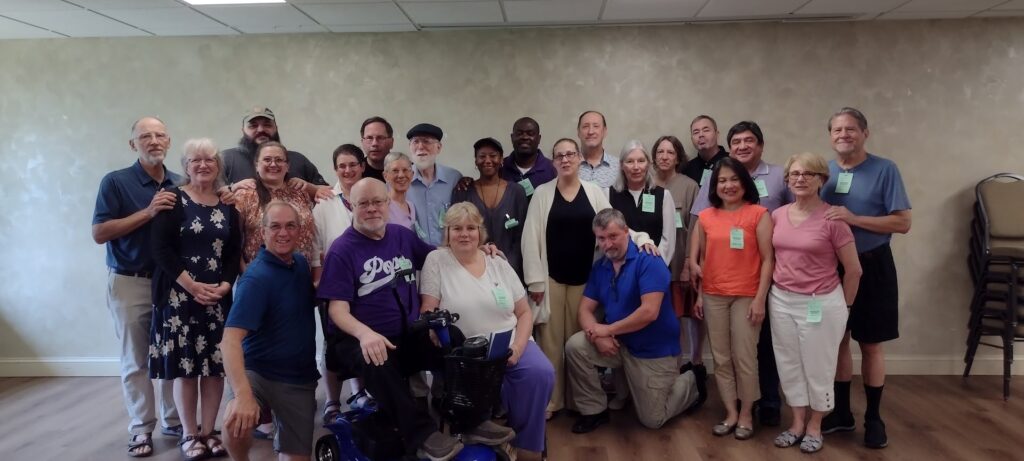
Christian marriage is beautiful. When done right, when we create a pattern of working together as Lori described above, we gain a taste of heaven as described by Paul. We gain the fruits of the Spirit: love, joy, peace, patience, kindness, goodness, faithfulness, gentleness and self-control. (Gal 5:22-23)
(Next article, Christian Marriage is Beautiful…and Hard, Part II.)
1933 Nazi Germany, the National German Church and 2024 USA, Christian Nationalism
by Robert Fontana
Something terrible happened in 1933 Germany. The previous year the Nazi party won enough local elections to become one of the dominant political parties in Germany, with enough political clout to warrant the naming of Adolph Hitler as chancellor of Germany. Hindenburg, the German president, did not want to name Hitler chancellor. He feared Hitler’s aggressive and intimidating tactics. But the old president was persuaded by advisors that Hitler would be restrained by wise counselors. They were wrong. Hitler was not to be restrained. He quickly seized power and made Germany a one-party state.
As terrible as that was, that is not the event I am referring to. No, the event I am referring to is the absorption of 28 regional Protestant Churches into the National Reich Church which fully supported the Nazis and their policies. Pro-Nazi German Christians wanted a “nazified version of Christianity.” Their leader, Ludwig Müller, was a rabid Nazi and antisemite who was named the first bishop of the National German Church. [1]
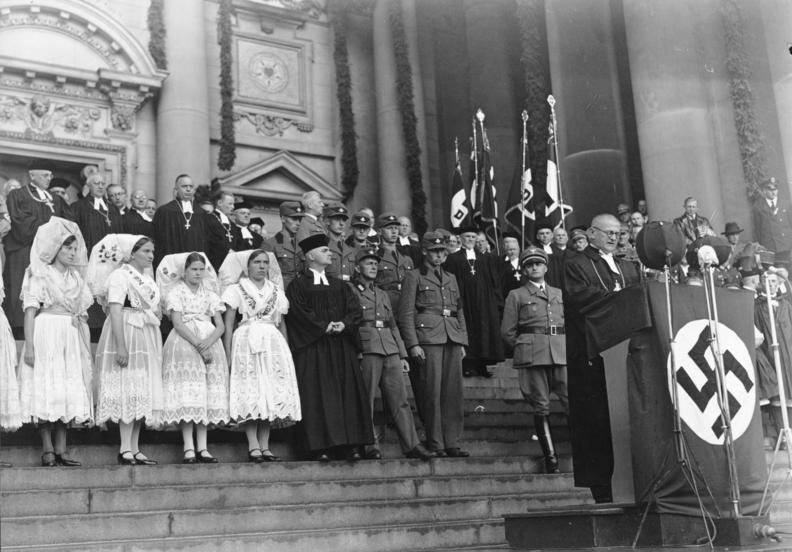
Initially the only Christian group who opposed the Nazis and the German National Church were evangelical Lutherans led by Martin Niemöller and Dietrich Bonhoeffer. Niemöller and Bonhoeffer demanded that the church of Christ centered on the Word of God not be co-opted and replaced by the state. This was idolatry of the worst kind. They formed the Confessing Church in opposition to the Protestant National German Church and the Nazi regime, knowing full well of the opposition to come.[2]
The Vatican initially tried to work with the Hitler regime. On July 20, 1933, the Vatican signed an agreement with the German foreign minister which recognized Hitler’s role as chancellor, giving him international legitimacy. With this agreement the Vatican withdrew support for the Catholic political party that had been challenging the National Socialists/Nazis. In return, the Nazi government gave the Catholic Church freedom without government interference to exercise its mission of churches and schools in Germany. This, of course, was a commitment that Hitler did not keep. As Hitler increased the use of violence against his political enemies and enacted antisemitic laws and harassment of Jews, he also pressured Catholic leaders to remain silent.[3]
The Pope refused to be silent. On March 10, 1937, Pope Pius XI issued an encyclical (Mit brennender Sorge/With Deep Anxiety) condemning the Nazi regime’s violation of the 1933 agreement and the neopaganism and worship of the state that had replaced true religion in Germany. Pius defended the dignity of the human person which must be protected by the state: “man as a person possesses rights he holds from God, and which any collectivity must protect against denial, suppression or neglect.” Pius did not explicitly name Hitler and the Nazi regime his encyclical, but he did make a reference to a “mad prophet” leading the people. Mit brennender Sorge was written in German and not Latin. Fearing Nazi censorship, the Vatican smuggled 300,000 copies into Germany. The encyclical was read from the pulpit of every Catholic church on Palm Sunday, March 21, 1937. Hitler was outraged. The next day the Gestapo, the German secret police, raided Catholic churches across Germany to confiscate copies.[4]
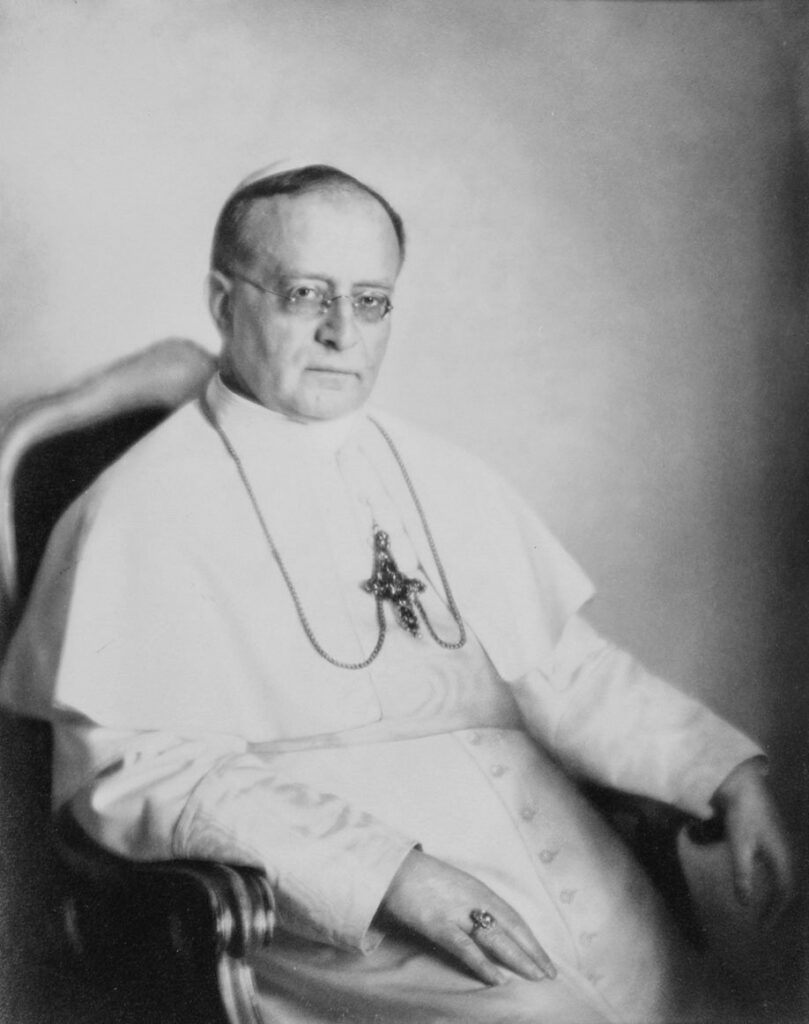
As Germany edged closer to war in Europe, all opposition to the Nazis, both Protestant and Catholic, was crushed. The Confessing Church was closed, its seminarians conscripted into the army, and its leaders arrested. Catholic schools and religious institutions were closed, and Catholic leaders, clergy and lay, who spoke out against the Nazis were also arrested.
I see disturbing similarities between the Germany of the 1930’s and the United States in 2024. There is a new fascism in the US led by the former president that has broad support from evangelical Christians. Much like German evangelicals who supported Hitler without question, Christian nationalist support Donald Trump without question. They see Donald Trump as God’s instrument to return the U.S. to its Christian foundation and conservative values.[5]

Christian Nationalists are supporting Trump despite the following:
- Trump has refused to accept the results of the 2020 election and has repeatedly lied to the American public that the election was fraudulent and stolen (even though Trump’s own attorney general told Trump the election was free from fraud.
- Trump was willing to use violence to overturn the 2020 election. He invited supporters, including violent extremists like the Proud Boys and Oath Keepers, to assemble at the Capitol on January 6 and pressure the Republican congressional delegates and Vice-President Pence to reject the results of the electoral college. (JD Vance stated that had he been Pence, he would have rejected the certification of the electoral college vote giving Biden the win in the 2020 election.)[6]
- The Justice Department indicted former President Trump on four felony counts for his efforts to overturn the 2020 presidential election.[7]
- A Fulton County, Georgia, grand jury indicted former President Trump and 18 others including his chief of staff Mark Meadows for unlawful efforts to change the outcome of the 2020 election in that state.[8]
- A Manhattan federal jury found former President Trump guilty of sexually assaulting E. Jean Carroll in a dressing room in a luxury department store.[9]
- Another Manhattan federal jury found the former president guilty of 34 counts of falsifying business records. This trial featured hush money Trump paid to a porn star, Stormy Daniels, to keep her from going public about their sexual encounter before the 2016 election.
Christian Nationalists proudly proclaim, “Jesus is my savior, Trump is my president.” They see Trump as God’s instrument to “Make America Godly Again.” They pay little attention to Trump’s lies or immoral and criminal behavior. They support Trump right or wrong and will use violence if necessary to reach their goals.[10]
One thing that was present in 1937 but is missing in 2024 is the voice of Catholic leaders publicly naming the lies and threats of the new fascism and condemning them.
- Where is the Catholic bishop who will declare that sexually assaulting women, lying to the nation, and undermining trust in the democratic process and in the judicial system is a grave sin?
- Where is the Catholic bishop who will declare that attempting to overturn a duly elected president by violence and deceit is a mortal sin?
- Where is the Catholic bishop who has the wisdom and courage of Pope Pius XI to write a pastoral letter to the people of his diocese, to be read at all the Masses, naming the lies and threats of the new fascism and condemning them?
This is not taking a partisan position, Democrats over Republicans. This is about spiritual discernment and reading the “signs of the times” of the very real threat that the Christian Nationalists and former president Donald Trump pose to the constitutional government in United States in 2024.
Having the Pope speak out did not stop the Nazis in 1937, but it was the right thing to do. Having the bishops speak out against the current rise of fascism promoted by the former president and his followers may not stop them either, but it is the right thing to do!
[1] https://encyclopedia.ushmm.org/content/en/article/the-german-churches-and-the-nazi-state
[2] Ibid
[3] www.americanmagazine.org/faith/2003/09/01vatican-concordat-hitlers-reich
[4] https://en.m.wikipedia.org/wiki/Mi_brennender_Sorge
[5] Freedomforum.org
[6] https://www.npr.org/2022/12/23/1145209559/jan-6-committee-final-report#:~:text=After%20roughly%2018%20months%20of%20investigations%2C%20the%20House,Donald%20Trump%20for%20his%20role%20in%20the%20attack.
[7] https://www.pbs.org/newshour/politics/read-full-the-indictment-against-trump-for-his-efforts-to-overturn-the-2020-election
[8] https://www.pbs.org/newshour/politics/read-the-full-georgia-indictment-against-trump-and-18-allies
[9] https://www.cnn.com/politics/live-news/e-jean-carroll-trump-trial-verdict-05-09-23/index.html
[10] https://apnews.com/article/trump-christian-evangelicals-conservatives-2024-election-43f25118c133170c77786daf316821c3
Homespun Homily by Lori: A Day at the Shelter
Sunrise is about 5:45 these days. I know because the curtain on my east facing window hangs about three inches above the bottom of the window. The morning sky is beautiful, heralding another HOT desert day.
Morning duties begin by 6:30. Unlock the many doors of the house. Fill the giant cooler with ice and water. Turn off night lights, empty garbage cans, restock the bathrooms with TP and clean hand towels. And perhaps most important, brew the morning coffee.
The “casa” is quiet at this early hour except for the chorus of birds singing in the patio. In the background are the sounds of whirring and voices and traffic from the construction site next door. On most days this is the calm before the “storm.”
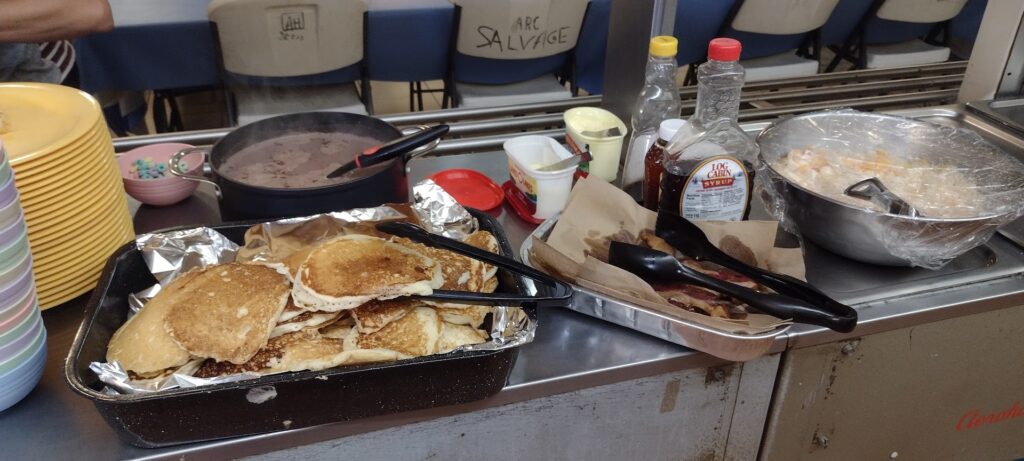
Before the 8:15 breakfast, the church bells peal, announcing the daily 8:00 Mass at the church next door. Then there is the laughter and padding of little feet, the toys banging and the occasional cries over sharing a toy among the several young children staying here. Very slowly, adults appear in the hallways, tired eyes and tousled hair. All of us wish for a little more sleep.
Each day is structured around meals and chores, and appointments for health issues, school registration, and immigration paperwork. There is family to contact, travel arrangements to make. At 10 every morning there is a YouTube English lesson for young and older to learn the English alphabet and vocabulary for time, money, days of the week, body parts, verbs. English is a difficult language –because there are rules…and, oh, by the way, there are all those exceptions to each rule.
As much as we plan out each day, there are always surprises. In our six weeks here, there have been “field trips” to the nearby shopping center and a water spray park. There have been medical emergencies, clinic and dental visits, a brand-new baby, and many last-minute grocery runs for cooking oil, avocados, pinto beans, or ice cream. There have been the everyday ailments of scrapes and coughs, headaches and mosquito bites. And we’ve enjoyed the fun of Bingo, a pizza party, a sidewalk chalk art show, a dance, and bi-lingual karaoke on the patio.
There have been many trips to the airport and a couple of walks with guests to the bus station in the middle of the night, though we really discourage those late-night, early-morning departure times. Many of our guests have never traveled by bus or plane. They are anxious because they don’t know what to do on a plane or bus, nor do they completely understand where they are going.
However, there is a wonderful network of people here to help, providing duffle bags and backpacks and food for the journey, and there is even a group of people who greet the departing migrants at the El Paso airport and accompany them through security and all the way to the door of their airplane.
There are planned weekly events to look forward to: a community member comes once a week to help in the kitchen and prepare a delicious meal. Fr Iggy, a Franciscan friar, celebrates Mass with us in our lovely chapel every Wednesday and usually stays for lunch to visit and share his joy and compassion. Sister Guadalupe leads a prayer group twice a week for whomever wants to attend. Participants sing and pray, reflect and share stories of their lives and their faith. Sister concludes her visit with a sweet treat for everyone and a raffle drawing for a prize for one lucky winner. (Robert and Lori pictured below with Sr. Deidra, an immigration lawyer.)
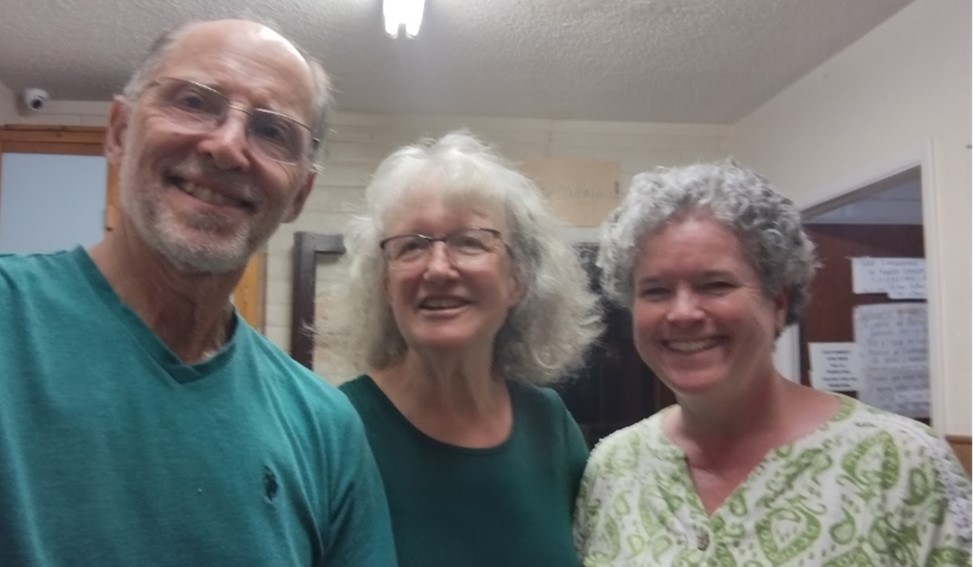
We’ve had ice cream cones and water balloon tosses, cooling off in the sprinkler and watching fireworks in the neighborhood for the 4th of July. We rounded up lots of coloring books and washable markers for our budding artists PLUS there is an artistic community member who has helped the children (and some of the adults) paint pictures and decorate rocks and mold playdough into imaginative sculptures. We even got some novels in Spanish to make a little library for the teens and adults. And every night after supper, there is a popular movie in the “sala” (community room), dubbed in Spanish.
Life in the shelter, Casa Papa Francisco, is mostly the normal day-to-day life. But there are also the hopes and dreams, the fears and anxieties of our guests, who are desperate for a better life for themselves and their children. In this country, all of us, except for the Native American peoples, have in our family tree ancestors who journeyed to here with these same yearnings, the same hopes for safety, enough food, and the dignity of work with just pay. Can we extend welcome to this new generation of migrants?
20 years ago I was attacked by a woman with an ice pick (And your invitation to support Catholic Life Ministries!)
By Robert Fontana

There is a saying that “Fools rush in where angels fear to tread.” Lori often quotes that verse to me when I make a suggestion to her like, “Why don’t we go to El Paso and work in the shelter for the summer?” But I digress from the story about being attacked by a woman with an icepick. It’s true.
I was working at the Diocese of Yakima late one fall evening. The sun was beginning to set, I was alone at the office when the phone rang. I answered it, and the woman on the line pleaded desperately for help: “I NEED A PRIEST! I NEED SOMEBODY TO HELP! MY DAUGHTER IS POSSESSED!” I could hear the daughter screaming in the background. Her mother continued, “Can you help? Please! She says she’s in hell. She’s been listening to heavy metal music all day. I don’ know what to do!” I asked the woman if her daughter had been drinking or doing drugs. “Absolutely not!” (Of course, that wasn’t true. She had been drinking heavily.)
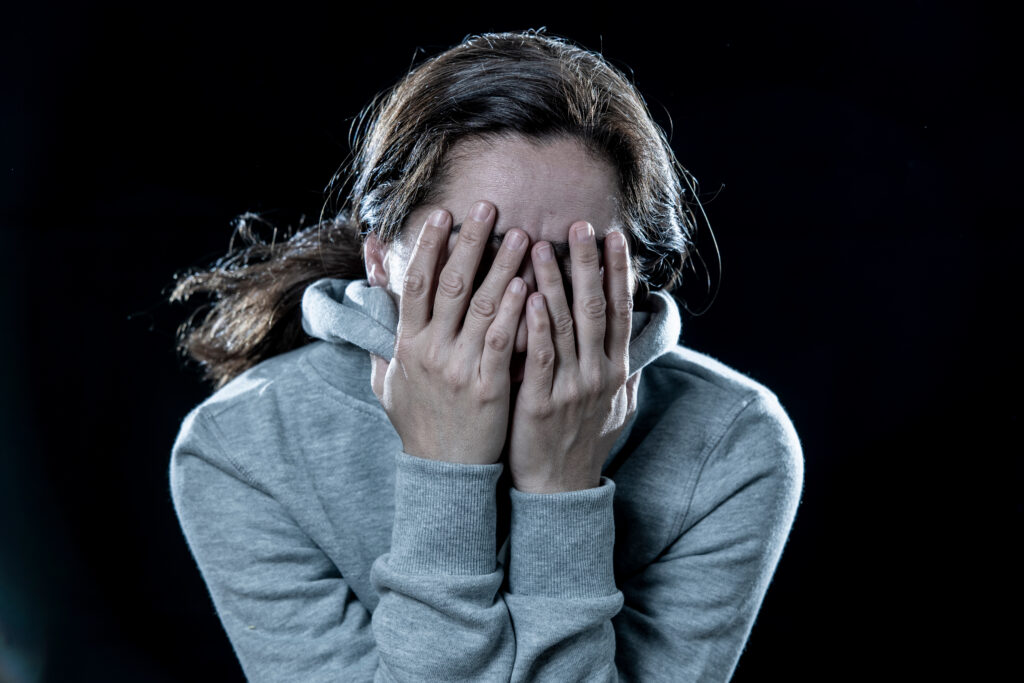
I took her address and phone number and vowed to get help. I called a local priest and asked for his assistance. “I WOULDN’T TOUCH THAT WITH A 10-FOOT POLE. CALL MENTAL HEALTH.” I was a little offended by the priest’s response. When someone calls the Church for help, the Church ought to be there for them even though other professionals need to get involved as well. I called the mental health hotline and the dispatcher said he would organize a team to go to the woman’s house, but it would take “an hour or so.” I decided I would go ahead of them and help comfort the mother.
What unfolded can only be described as a scene out of an Alfred Hitchcock movie. The woman and daughter lived in a rural section of Yakima County, at the end of a long gravel road. I stepped out of the car. I kid you not, the wind was blowing, her screen door was slamming open and shut, and a dog howled in the distance. I had the thought, “I might be killed. Maybe this isn’t a good idea.”
I knocked on the door, and the panicked mother let me in, so grateful that I would come to help. “Okay, maybe I won’t die.” She described the events leading up to her daughter current state and led me to the young woman’s room. We entered, and I saw a terrified 17-year-old sitting curled up on her bed with her back against the wall. She was holding a large plastic container of something I assumed was soda.
As I approached her, I had the strong notion to sing Amazing Grace. I was hoping it would be familiar, show to her I was not a threat, and help her to calm down. Her mother was right behind me. I was able to get right up to her when suddenly she leaped at me, brandishing an ice pick in her hand. She slashed and nicked my back. Soda splashed all over me and her and her mom as Mom and I tried frantically to grab the ice pick from her. When I pulled the ice pick away, the girl retreated to her bed, and Mom and I fled to the kitchen.
I called the Mental Health Hotline. “What’s taking you so long?” “We’re on our way.” I told them about the ice pick. The dispatcher said, “Oh, I forgot to tell you to remove all dangerous objects from her room!”
The mental health crisis team eventually arrived, and I handed off the mother and daughter to the professionals. Mom was eternally grateful that I came to her house. It truly helped her calm down. And I learned a valuable lesson. Do not try to do good beyond my expertise. Comforting the mother? I knew what I was doing. Helping the girl? I was out of my league.
Now what does this story have to do with my asking you to pray for and donate to Catholic Life Ministries? We do work that you believe in and can’t do yourself – marriage enrichment and preparation; spiritual development; service days for the elderly and poor; mental health counseling for individuals, couples, and families. We reach out, take risks, learn from our mistakes and strive on to awaken young and old alike to the great love God has for us in Jesus and the Holy Spirit. It doesn’t stop there, we challenge ourselves and those we serve to return God’s love by loving one another, especially those on the margins, the poor and spiritually abandoned.

We also write about the graces and challenges of living as disciples of Jesus within the contemporary world. We do so, not as experts, but as sinners struggling to be saints within the circumstances and events of our daily life. We are not above criticisms and disagreements, and we welcome both, along with your suggestions/comments.
If you are already a sponsor of CLM, we thank you with grateful hearts, and ask you to renew your commitment. If you are not a sponsor of CLM, we ask you to consider becoming one. Our commitment to you is to do effective ministry and to address difficult topics of integrating faith with life. We aim to “think with the Church,” as one spiritual mentor said, and we add, “and help the Church think!”
To Donate to online go to: https://www.catholiclifeministries.org/donate/
To donate by US Post:
Make checks payable to CLM. Mail to:
Catholic Life Ministries, 1827 NE 58th St. #B, Seattle WA 98105

Homespun Homily: Notes from the Border
By Lori Fontana
How bad would it have to be that you would choose to leave your home, your extended family and friends, your country, and perhaps even your children or spouse to travel to a place where you desperately hoped life would be better? How bad?
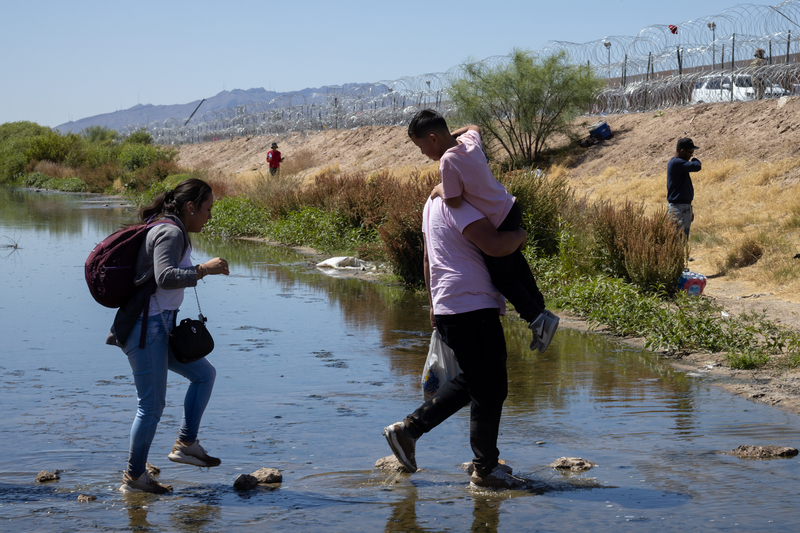
How bad would it have to get for you to choose to travel thousands of miles – not via plane, train, or bus, but crammed in an open train car, or locked in the windowless trailer of a semi, or walking through thick jungle teeming with poisonous snakes and insects, through hostile cities plagued by corrupt police officials, through barren desert, with no relief from the heat, the tiredness, the hunger and thirst?
These are the “travel” stories we’re hearing here at the border. The people we meet are beautiful and brave. They arrive at our shelter having endured trauma, first in their own communities which are unstable, at times to the point of collapse, under the weight of high inflation, few jobs, and high- priced and / or scarce food and necessities.
Many have endured physical deprivation and abuse on their journey. They’ve paid their life savings to hire a “coyote” who promises safe passage, but instead they have been mistreated with verbal and physical violence or even left stranded along the way, without food or water.
Some of our migrant guests have been the target of gang violence. They’ve been threatened, extorted, beaten, stabbed. One person who wouldn’t cooperate with the local gang was thrown into a pond of crocodiles. Gang members have threatened to kidnap or kill their children and other family members.

As I see it, and as our guests tell of their own experiences, it becomes apparent that people migrate to our United States of America for two basic reasons: lack of food / work and threat of violence. And I very much believe that if faced with either of these scenarios, I, too, might risk everything to end up in a place where I could find a job and have enough to eat, where I could send my kids to school and to bed each night without worrying that they might be kidnapped or killed.
Our borders, immigration – it is all very complicated; and yet, it’s simple. Native Americans were the first inhabitants of this land from sea to shining sea. And all of the rest of us are immigrants or come from a line of migrants to this country. Being a U.S. citizen is not the result of anything we’ve done – we were just born here! Many don’t see it this way. Loud voices decry migrants of today – they’re taking our jobs, crowding our schools, packing welfare rolls.
But, please, open your eyes. Look around. On an ordinary day in my hometown, someone delivered my newspaper (I still read one!) to my doorstep; someone cut my hair – both recent migrants. I rode the city bus – the driver was from west Africa; I ate some Thai food – the chefs were from Thailand. I passed a shoeshine stand, a laundromat, a nail salon – each of the proprietors was a recent immigrant. Our doctor is from China and our dentist from Korea.
How many “Help Wanted” signs do you see each day? Restaurants, hospitals, construction companies, schools, tech companies, daycares, retail stores, parks departments, farms and grocery stores – all segments of our economy are begging for workers. Where will they come from?
In 1886, in New York Harbor, the Statue of Liberty was dedicated. Did you learn Lady Liberty’s inscription as a school kid?
Give me your tired, your poor, your huddled masses yearning to breathe free, The wretched refuse of your teeming shore, send these the homeless tempest-tossed to me. I lift my lamp beside the golden door! ~Emma Lazarus
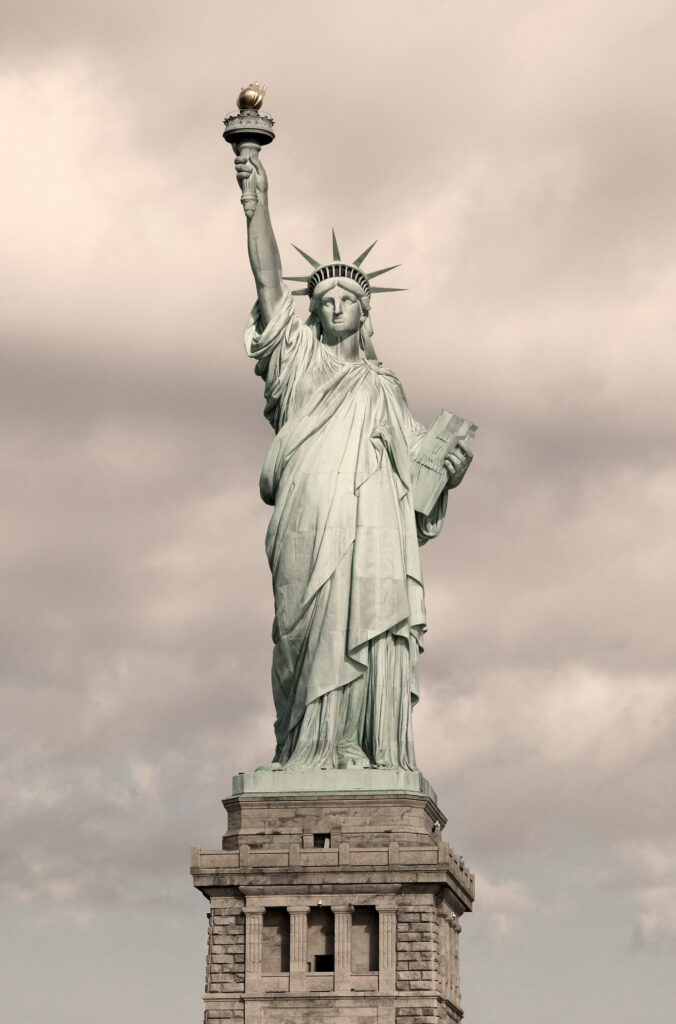
In the 1880’s, the tired and poor coming to our “golden door” were O’Malleys and Salvatores, Bukowskis and Ovrelids (like my grampa from Norway), Schmidts and the English counterpart – Smiths. Today it’s Sanchezes and Aguileras, Fouches and Bekeles, Smirnovs and Wangs. People yearning for, and willing to work for, an opportunity at the “American Dream.”
If the Statue of Liberty doesn’t compel you to reflect on immigration in 2024, I hope you will turn to the words of Jesus:
“For I was hungry and you gave me something to eat, I was thirsty and you gave me something to drink, I was a stranger and you invited me in, I needed clothes and you clothed me, I was sick and you looked after me, I was in prison and you came to visit me.” Matthew 25:35 – 36
It is clear that our immigration system needs work. In the meanwhile, as Christians we are challenged that migrants are “Jesus” at our door. What part am I called to do? I can’t fix the global problems. But I can welcome the stranger at my door and offer a cup of cold water. This is the mission of Annunciation House.
El Paso Journey from Seattle Vs El Paso Journey from Ecuador
By Lori and Robert Fontana
The day before we left Seattle I took a walk through my favorite green space, the Ravenna Ravine. I walked slowly, knowing that Lori and I were going to be living in El Paso, a city in the high desert, close to our southern border which is crowded with buildings and has very few trees. I breathed in the cool air, listened to the wind and the birds, and savored the moment.

We then said our goodbyes to our children and grands, finished packing our car, and left early on the morning of May 29 for our four-day “grueling” drive to El Paso. First stop was Spokane, Washington, to see good friends Mike and Mary who served us a delicious homemade soup for lunch. We continued to Missoula, Montana, to spend the night with George and Mary. We laughed with their son Liam, engaged in world-saving conversations, enjoyed delicious home cooking and a good night’s sleep.
Then it was off to El Paso, driving through southern Montana and Idaho listening to upbeat tunes from “The Chicks,” Abba, the Beatles and praying with Michael W. Smith, Taize, and the Brooklyn Tabernacle Choir. We drove over the Continental Divide twice and saw magnificent scenery in the Rocky Mountains. We hit traffic passing through Salt Lake City just when we were feeling exhausted from driving. AGH!! Spent the night in Provo at a quaint Airbnb and then off again for another ten-hour day of driving (we had a few old bladder pit-stops), an overnight in Albuquerque, and then our final day, a short five hours to El Paso.
Of course, along the way, we had all the coffee, cold water, snacks – kettle-corn for when we were drowsy – and food necessary. We arrived in El Paso late Saturday afternoon and were welcomed with open arms by Ruben Garcia (director of Annunciation House), and other volunteers.
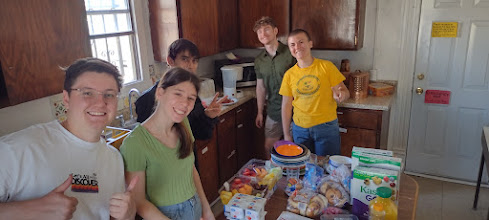
On Sunday we were given a short orientation as to what to expect at the A-House shelters and our forthcoming jobs. Then we were given the rest of the day off to recover from our travels. Whew, we needed that rest. Work began on Sunday.
In contrast, some of the guests we received just this week had very different travel experiences. They did not simply “leave” their homes, friends, and family members, they fled! They fled from Bolivia, and Ecuador, Mexico and Venezuela. Ruben asked us, “Why would a person flee one’s homeland?” He provided the answer: “Fear and Food.” Fear of the local criminal organizations and gangs threatening them with violence, kidnapping their children, and extorting them for money to leave them alone. They also leave because of the poverty they experience and the inability to work and properly feed their children.
The guests who arrived this week came from Ecuador, Venezuela, Bolivia, Mexico, and Guatemala. They arrived here via a combination of flying from their country to another one, e.g. Ecuador to El Salvador, and then boarding a crowded bus to Guatemala. Some must walk through Guatemala; others may take a bus or hire a driver to get to Mexico. Once in Mexico they still have 2,100 miles to travel to get to Juarez which is the sister city to El Paso. Several traveled through the treacherous Darien Gap – dense jungle that connects Colombia and Panama.
Once in Mexico they make their way north, walking, traveling in an open train car packed with dozens of other migrants, and some even in a freight container being pulled by an 18-wheeler truck. By this time, our guests who are traveling with children have little money, food, or water. They are in hot, cramped quarters. One woman told me that it was so hot in the container in which they were placed, that an older person died from the heat. She told me that the entire trip was very scary, especially for her baby with severe medical challenges.
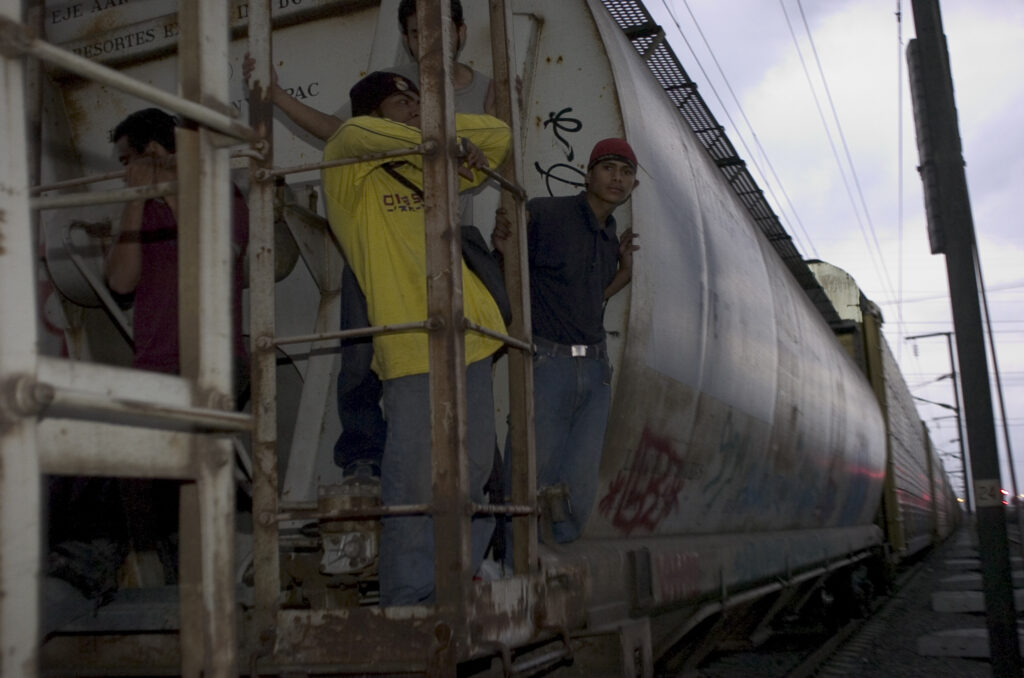
All of our guests reached the US – Mexico border at Ciudad Juarez. Some spent many days at a shelter in Juarez before presenting themselves at the border to US border patrol asking for asylum which is provided for by US law. Officers take the migrants into custody and do an initial interview to determine if they have a valid reason to seek asylum. If they do, they are given paperwork that gives them legal status for being in the United States.
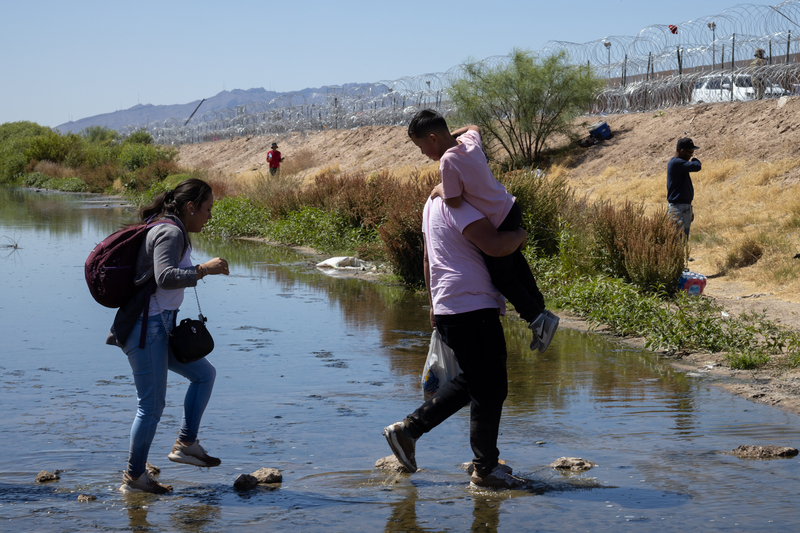
THIS IS IMPORTANT: MIGRANTS WHO HAVE ASKED FOR ASYLUM AND HAVE BEEN GRANTED PERMISSION TO BE IN THE US AND HAVE TO REPORT AT A FUTURE DATE BEFORE AN IMMIGRATION JUDGE TO REVIEW THEIR CLAIM FOR ASYLUM, ARE HERE LEGALLY. THEY ARE NOT “ILLEGAL ALIENS.”
Migrants who need assistance to get wherever they want to go in the US are brought to one of the Annunciation House shelter sites in El Paso by US immigration officers. This is not the end of their journey. Here we welcome them, give them cold water, coffee, and food and assist them in contacting their family members and friends in the States who are expected to purchase a ticket for bus, plane or train to get them to their final destinations. Most guests speak Spanish and very little English. Some speak a little Spanish because their primary language is an indigenous one. If necessary, they are welcome to sleep at the shelter until their travel arrangements are completed.
There are occasions when some migrants were injured in their crossing and need long-term medical care. These people stay at the house in which we are working, Casa Vides.
The guests we have received are all extremely grateful to be welcomed and assisted. The most moving time for us has been when they share their difficult journeys with us, and then when we join hands in prayer to bless them as they leave. Their journey has not ended until they have landed in Oakland, Nashville, Tallahassee, Arlington, etc. and are received into the arms of their loved ones.
Why do Ruben Garcia and the hundreds of volunteers who come here year after year do this work of hospitality? It is simple. They (and we) are guided by the words of Jesus who said that when we feed the hungry, welcome the stranger, clothe the naked, etc. we feed, welcome and clothe Jesus himself. (Matthew 25: 31-46).
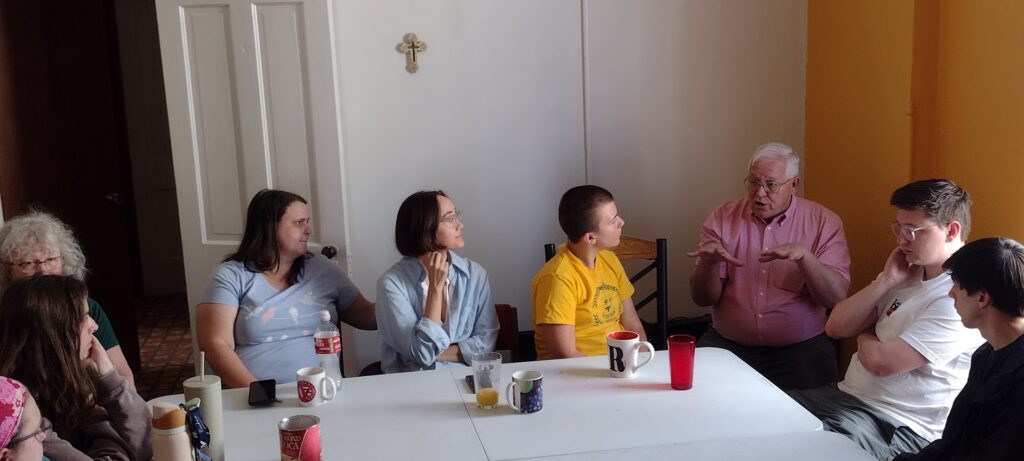
As we reflect on the many journeys that have brought each of us to Casa Vides in El Paso, we’re humbled. There is no comparison, really. We were traveling / journeying as a choice. We had resources: a car, food, money to buy whatever we needed; we knew exactly where we were headed and exactly how much time it would take us. Our migrant sisters and brothers have none of this certainty or security. They set out on a journey in desperation, and they hope they will survive. Our country’s immigration policies need great reform. But meanwhile, we also need those who will welcome the stranger at our door as Jesus commands.
We’re volunteering at Annunciation House this Summer!
By Robert Fontana
What’s Annunciation House or A-House and why are we volunteering there in El Paso, Texas, for the summer at the hottest time of the year?
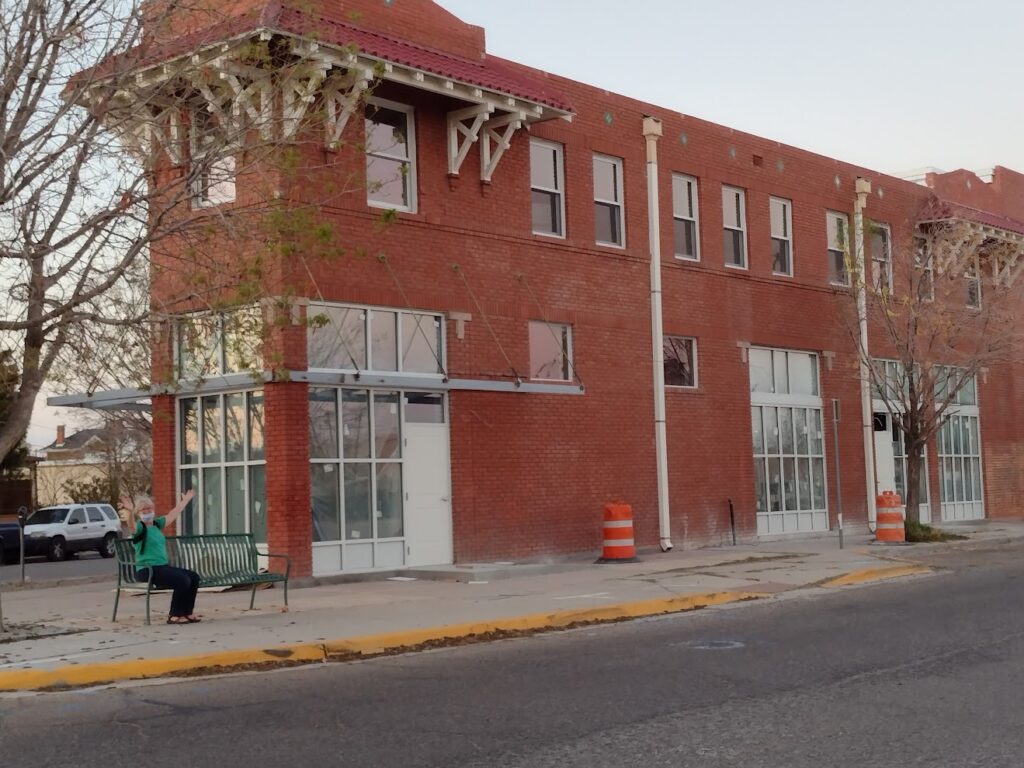
In the winter of 1976, a small group of young adults first gathered to consider and discuss the possibility of undertaking a journey that would one day be known as Annunciation House. Their gathering was fostered by a desire to experience the Gospel more deeply. Especially strong was the realization that the Gospel calls us all to the poor and that the life and presence of Jesus in the Gospels is so completely in relation to the poor.
In the fall of 1977 the second floor of an old building owned by the Diocese of El Paso became vacant. With the help and blessing of then Bishop, Sidney M. Metzger, the diocese loaned the building. On February 3, 1978, five of those young adults moved into the building with no money or other resources, and only vague ideas about how the poor would be served. What was certain was that in making themselves available to the poor, the poor would show the way and do the teaching.
The beginning was difficult. After arriving it became clear that there was no real sense of who the poor were, and if a poor person were to come, there was a sense that the group would not know what to do with him or her. Fortunately for the volunteers, the building was in need of cleaning and repairs. This provided an initial agenda for the group while they waited to come to some understanding of what God was asking.
One day a call came asking the group to take in a teenager who had been living in the streets. In accepting this young man Annunciation House made the first of two basic decisions that would define the work it would do. In accepting this young man, it in effect said that Annunciation House would be a house of hospitality for the homeless poor. It was not long before a second guest was accepted, then a third, then a fourth and so on. There would come a time when there would be more than 100 guests at the house at one time.
The second basic decision about the work of the house came with the realization that in the El Paso community, there was an entire group of people who were unable to receive any of the social services that are ordinarily available to the poor.
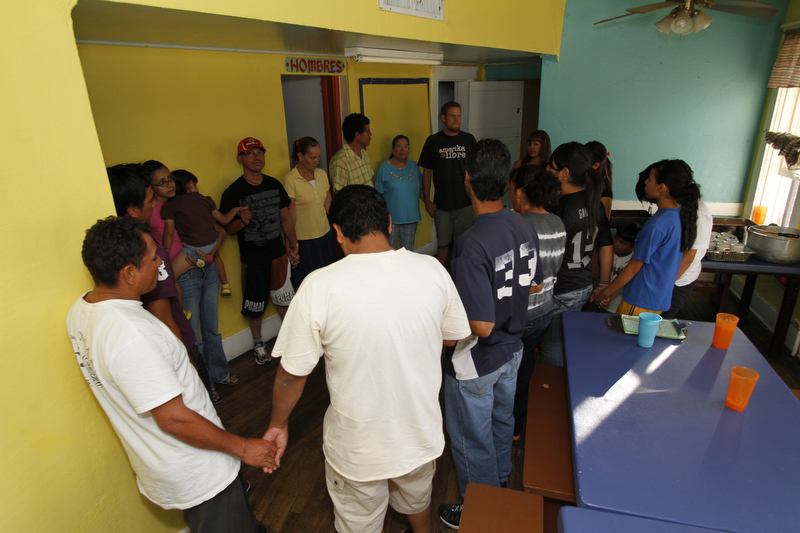
When referred to an agency, they would return to the house saying, They say they cannot help me because “no tengo papeles,” because “I have no papers.” There was no place where the undocumented could receive such basic services as food, shelter, clothing, and medical attention. In the El Paso community the undocumented were among the poorest and the most in need. And thus the decision was made that the undocumented would be the ones whom Annunciation House would primarily serve.
And so it was that little by little the volunteers were taught about who the poor were, about welcoming them and about serving them. With time the life and work of the house evolved, as did the volunteers themselves. Some left and new ones came. There has never been but a small number of volunteers living and working in the house at any given time. So also has the work never been but a tiny effort in the face of great numbers and tremendous needs.
There is always more left to be done at the end of the day than there was when it started. There is always a never-ending flow of guests to be welcomed and assisted. There is always a new opportunity to discover the meaning of Johns words, Little children, let us love in deed and in truth and not merely talk about it. There is always a never-ending opportunity to serve and meet Christ among the poor and to little by little experience the Gospel more deeply and try to live it more fully. (from https://annunciationhouse.org/)
Why we are we volunteering at A-House?
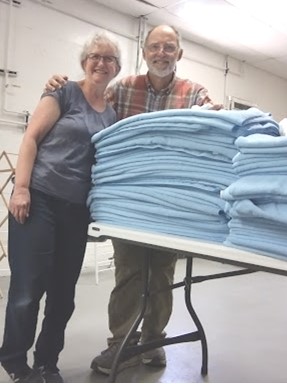
We have a historical and emotional connection to Annunciation House. Two of our daughters, Mary and Colleen, following their graduations from college (Mary in 2004, Colleen in 2014), spent 15 months living and serving at A-House. They each had profoundly enriching experiences that shaped their futures. Mary remained involved with A-House serving as a member of the advisory board and as a volunteer in-charge of volunteer applications. Colleen, a journalist major in college, has chosen to work professionally with non-profits that serve as advocates and trainers for low income workers employed as house-cleaners, yard workers, laborers, etc. Many of these are Spanish speaking migrants.
In 2021, when Covid broke out across the country, Mary reported to us that A-House was struggling recruiting volunteers. We immediately thought, since I could continue my counseling work over telehealth from El Paso, there was no reason why we could not volunteer. We spent three weeks at an A-house shelter mostly doing laundry, mopping floors, and emptying trash. We were able to meet with one of the A-House founders and director, Ruben Garcia (pictured) below.
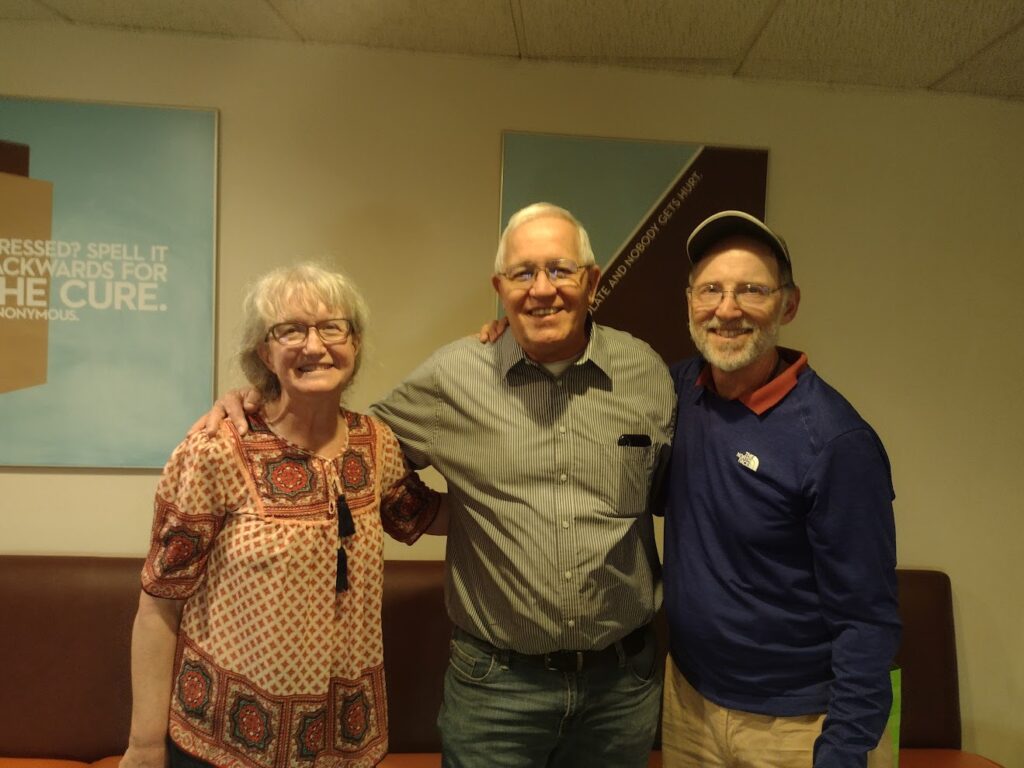
We are returning to A-House this summer for similar reasons. A-House is having a hard time recruiting volunteers because they are being scared off by:
Texas Attorney General Ken Paxton has sued Annunciation House, a nongovernmental organization (“NGO”), to revoke their registration to operate in Texas. The Office of the Attorney General (“OAG”) reviewed significant public record information strongly suggesting Annunciation House is engaged in legal violations such as facilitating illegal entry to the United States, alien harboring, human smuggling, and operating a stash house. (https://www.texasattorneygeneral.gov)
This is not true. Guests are brought to A-House by federal immigration officers who have processed the person’s asylum claim and given him/her paperwork allowing entry into the country until the claim can be heard at a future court date.
The Old Hound Dog, the Old Farmer, and the Risen Jesus
By Robert Fontana

There was once an old farmer talking with a young farmer about the coming harvest when they noticed an old hound dog chasing a rabbit into a thick grove of trees and bushes. The rabbit would run in and out of the thicket with the old hound dog hot on his trail. Soon other dogs, seeing the old hound dog chasing something, joined in the chase. They too went in and out of the thicket of trees and bushes, following the old hound dog who was following the rabbit. But after some time, the other dogs tired of the chase. One after another quit. The old hound dog, still catching glimpses of the rabbit at this turn and that, continued.
The young farmer mused out loud, “I wonder why those other dogs dropped out?”
The old farmer replied, “I guess they never saw the rabbit.”
As true for many mainline churches, the Catholic Church has a membership crisis. People, young and old, who have been raised Catholic, received the Sacraments, attended Catholic schools and/or some form of religious education, have left /are leaving the faith of their childhood. Many are leaving religion all together. They claim to be “spiritual but not religious.” Like the dogs in the story above, they never “saw” the rabbit, never encountered Jesus as truly alive and present, and never had the Holy Spirit stirred up in their hearts.
The reasons for this are many, but one primary reason is this: American culture offers an alluring vision for the good life that is simply contrary to the Gospel and hard to resist – play, pleasure, power, possessions, privilege, and position, all made possible by money. Fr. Richard Rohr calls these the “Poison P’s.”

What makes it very challenging to recognize how I am hooked into the “Poison P’s” is that they easily get embedded in the families, friendships, jobs, politics, entertainment, social media, etc. in which we participate. The Christian faith invites us to a disciplined life that is, in fact, a challenge to the “Poison P’s” rooted in American culture. As Christians, we are challenged…
- To use our privileges (e.g. education, good health, family upbringing, job opportunities, etc.) to reach out to the under-privileged.
- To live simply, minimize our possessions, and care for the earth and its resources.
- To wait until marriage to be sexually intimate (and to remain celibate if one is unmarried).
- To use our power to act justly towards one another and be a power for good in all circumstances.
- To welcome the stranger and the immigrant.
- To care for the elderly, the sick, and those with physical, mental, emotional challenges.
- To love one’s enemies and pray for one’s persecutors.
- To be faithful in marriage and open to welcoming children into the world.
- To forgive all who have hurt us.
- To be quick to listen, slow to speak, and slow to anger.
- And most importantly, to find our fundamental identity as persons not in what we do or possess, but in our relationship to God as God’s precious children.
It is the living relationship with God that enables a person to step into the modern world of the “Poison P’s” and reorganize them so that being a disciple of Jesus and following the lead of the Holy Spirit transforms how we play, seek pleasure, enjoy privilege, obtain possessions, and use power.
When I have “seen the rabbit,” and I’m not just one of the other dogs chasing a dog for the fun of it,” then I will be motivated to “stay in the chase.” When I know God’s love deeply and personally, when I can feel the risen Jesus close to me, and when I am filled with the joy of the Holy Spirit, then I am ready to begin the spiritual journey as God’s beloved daughter or son by:
1. Inviting Jesus to shape my character.
2. Asking Jesus to show me God’s will for my life.
3. Asking Jesus to show me the specific gifts of the Holy Spirit given to me to be a power for good in the world.
Besides the allurement of the world’s “Poison P’s,” there are other reasons why people young and old are leaving the Catholic Church. For some the Church is too liberal, with too much focus on social justice issues. For others, it’s too conservative, with too much rigidity around the sacraments or sexual issues. And for others, it’s the criminal and sinful behavior of Catholic leaders involved in clergy sex abuse and cover-up. These issues need to be addressed. However, in my opinion, the greatest need we have is to find effective ways to help one another, especially our youth and children, encounter God and embrace a life-giving relationship with Jesus through the Holy Spirit. Having just celebrated the great Church feast of Pentecost, let’s remember to pray to the Holy Spirit for strength, guidance, and wisdom to help us move forward together as a faith community.

Photo 24356482 © Sabphoto | Dreamstime.com
Marriage is a foretaste of heaven (or hell)
By Robert Fontana

The Scriptures are clear: heaven begins this side of heaven. Paul writes, “So whoever is in Christ is a new creation: the old things have passed away; behold, new things have come.” (2 Cor 5:17) John writes, “See what love the Father has bestowed on us that we may be called the children of God. Yet so we are.” (1 John 3:1)
This is not simply meant as a theological truth while we toil in this “valley of tears.” We should experience the fruits of being a “New Creation,” a “Child of God” this side of heaven, through how we love one another. This is especially true for couples who marry in Christ Jesus. As a pattern, Christian married life ought to bring us “love, joy, peace, patience, kindness, generosity, faithfulness, gentleness, self-control.” (Gal 5:22-23)
Sadly, for too many Christian couples, marriage is a foretaste of hell rather than heaven. The current data on divorce rates among Christian couples is 28% for Catholics, 33% for Protestants. UGH! Furthermore, from my experience as a marriage therapist, many long-term Christian marriages are unhappy.

There are a variety of reasons for this, but a primary one is that couples do not work on their marriage. By not giving their marriage attention, couples begin to take one another for granted, other things become more important, and couples grow apart. They may go to Church and look like the “Holy Family” on the outside, but on the inside, they are lonely, hurt, and disillusioned. This does not have to be. There is a solution!
Work on your marriage!
It’s not just working on learning better communication skills, doing relationship inventories, reading self-improvement books, and going on retreats – although these are all good and important. Working on your marriage especially involves maintaining friendship and having fun together. Marital friendship, according to the research, is the key ingredient to sustaining happiness in love over a lifetime.
Marital friendship means turning to one another as the primary person to give and receive affection, trust and openness, fun, admiration, sexual intimacy, acceptance, and, of course, forgiveness. With marital friendship fosters a “holy communion” between spouses with the fruits of the Holy Spirit being present as a pattern in the couple’s life: love, joy, peace, forbearance, kindness, goodness, faithfulness, gentleness and self-control. (Gal 5:22-23) Now wouldn’t that be a taste of heaven before heaven?
Work on your marriage and your marriage will work! If you need help, attend a workshop or retreat together. Lori and I are presenting a retreat for couples at the Bon Secours Conference Center, Marriottsville, Maryland. (Details are below; join us if you can!) There are many good workbooks for couples. A favorite of mine is John Gottman’s The Seven Principles for Making Marriage work. Lori and I also have a workbook for couples that you might consider using. It’s called “Hidden Treasure: Discover the Amazing Gift of Your Marriage.” You can get it on Amazon or Barnes and Nobles.
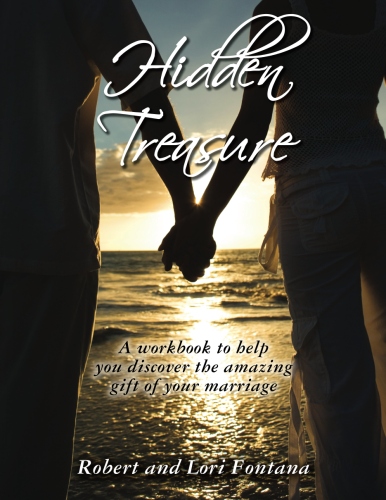
Of course, if you are really in conflict, go to couples counseling. I’m seeing couples who are preparing for marriage, recently married, married for a dozen years, and married for over 30 or 40 years. Conflict that turns into fighting happens at all stages of married life. Do not hesitate to get help if you are stuck in a rut and are unhappy in your marriage regardless of how short or long you have been married. God and a good marriage therapist can help bring joy back to your marriage.
Christian Marriage Is Beautiful…and Hard
Friday, August 23 (4 pm) – Sunday, August 25 (11:30 am) at the Bon Secours Retreat and Conference Center, Marriottsville, MD
Join us for a marriage/relationship enrichment retreat for all marriages and committed couple relationships: those strong or struggling; recently married or married for years; divorced and remarried with blended families; and couples who are not married but want relationship help. This retreat is guided by Robert & Lori Fontana.
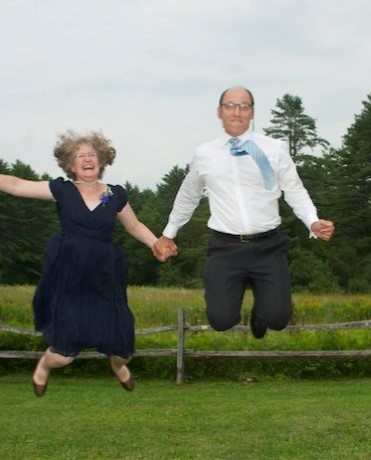
Presentations will include a mixture of prayer and reflection, music, skits, stories, and excellent information based on Scripture, Catholic teaching, and clinical experience. You will reflect on the beauty of Christian marriage, the social evidence on why it is hard to live out, and the ingredients of a successful marriage. This is a participatory retreat with opportunities during each session for spouses/partners to separately complete relationship inventories related to the topic, share their answers with each other, and dialogue. You may gain new skills in self-awareness, communication, and conflict resolution or strengthen these skills that you already have.
The price of $500 is per couple. Please place both names within the name field (i.e First Name: John&Jane, Last Name: Doe/Smith). For single rooms or commuter options, please email Doris.Gallagher@BonSecoursRCC.org.
Check-in begins at 4pm and an orientation session will be held at 5:30pm. Mass will be available on Sunday. Please note that lunch is not included on Sunday before departure.
To register: https://bonsecoursrcc.org/event/christian-marriage-is-beautifuland-hard
A Resurrection Story: “My life was a living hell surrounded by the walking dead.”
By a friend of the Fontanas who wishes to remain anonymous
I’d like to briefly share my struggles with drug addiction and the road that led to my recovery in the hope of inspiring anyone who may be struggling or knows someone who is struggling.

I am middle age and a software engineer by trade. My childhood was a tale of two cities. On one hand, I was blessed to belong to a very large, supportive, and loving extended family. But on the other hand, at home, in a low-income neighborhood, my immediate family was very dysfunctional. My mom and biological father separated when I was a baby. My mom remarried and my stepdad became my dad. My parents divorced when I was 5 years old, and my siblings and I were left living with our single mother who struggled financially with a minimum wage job and four young kids to support. She then married a physically and emotionally abusive man, got hooked on cocaine and crack. From there our home life was filled with chaos, violence, and pain. Mom died from a drug overdose when I was 13 years old.
After she died, my siblings and I went to live with our father who had remarried a woman who drove a wedge between him and our family. I wasn’t fond of her, and began to act out. I was putting a strain on his marriage, so he told me it was best that I leave. I called up my grandparents and moved out at 16. He and I are still estranged to this day.
I started to smoke pot. My weed use led me though different social circles, where eventually I met a girlfriend who introduced me to meth. I immediately loved the euphoric feeling it gave me. It suppressed all negative emotions and only amplified positive ones. There were no more feelings of worthlessness and self-loathing. This revelation then inspired me to try anything and everything else I could get my hands on; crack, cocaine, heroin, LSD, mushrooms – you name it, I consumed it in abundance. My late teens and 20s were a complete blur, oscillating between addiction and sobriety, my grandma’s house and slapdash living arrangements, unemployment and various odd jobs like a delivery driver, auto mechanic, and bus boy.

Miraculously, during one of my sober stretches (imposed by a very bad DUI conviction), I graduated from the university with a degree in mathematics. Shortly thereafter, I landed my first professional job as a business intelligence developer. I was dating someone again, but a week before my first day at the company, the perfect storm happened. My girlfriend and I broke up, and while in despair I bumped into an old acquaintance with whom I used to do drugs, and we smoked some meth. From that day forward, every day for the next 5 years, I was a full-blown meth addict.
For a while I was a high functioning meth addict. I would crush it up and mix it with some juice or coffee that I’d keep at my desk and just sip all day long. I used it every day – before work, during work and after. While everyone around me was moving forward in life, getting married, having kids, getting promoted, going places – I was content just standing still, hunched over a computer screen in a corner, getting high and writing software. At the end of the day when all my colleagues returned home to their families, I returned to a drug den to get high with very bad people. I was under the illusion that they were the people I belonged with, the unwanted, the outcast. That’s the narrative I force-fed myself, and eventually believed.
This went on for 3 years. A day came when I was barely functioning at all. I would go days without sleep and show up to the office with pupils so dilated my eyes were black, barely able to string together complete sentences. My personal hygiene had gone down the drain, not showering or washing my clothes. I started to skip important meetings with executives, missed critical presentations, and disregarded important deadlines. And my attendance started to slip.
During all this time, my manager, who was a very empathetic person, had tried his best to reach out to me, as he obviously sensed something was profoundly wrong. He repeatedly made efforts to help me – vacation time to rest, flexible scheduling, new projects to work on. But it finally came to the point when one day he took me into his office and gently fired me.
My addiction had fully metastasized and taken over my life. I hung out at dope spots, getting high and going nowhere. Within 6 months I was completely broke. I had burned through my savings and was 80k dollars in debt from maxed out credit cards. My car was repossessed. I was borrowing money from as many people as possible and not paying them back, burning bridges left and right, flaking out on anyone who still bothered to be in my life. I had reached a point of total desperation, as I had an insatiable drug addiction, and no money to buy drugs. The only vestige of stability left in my life was living at my grandmother’s house, but I managed to screw that up too when I stole from her to buy drugs and was kicked out onto the streets.
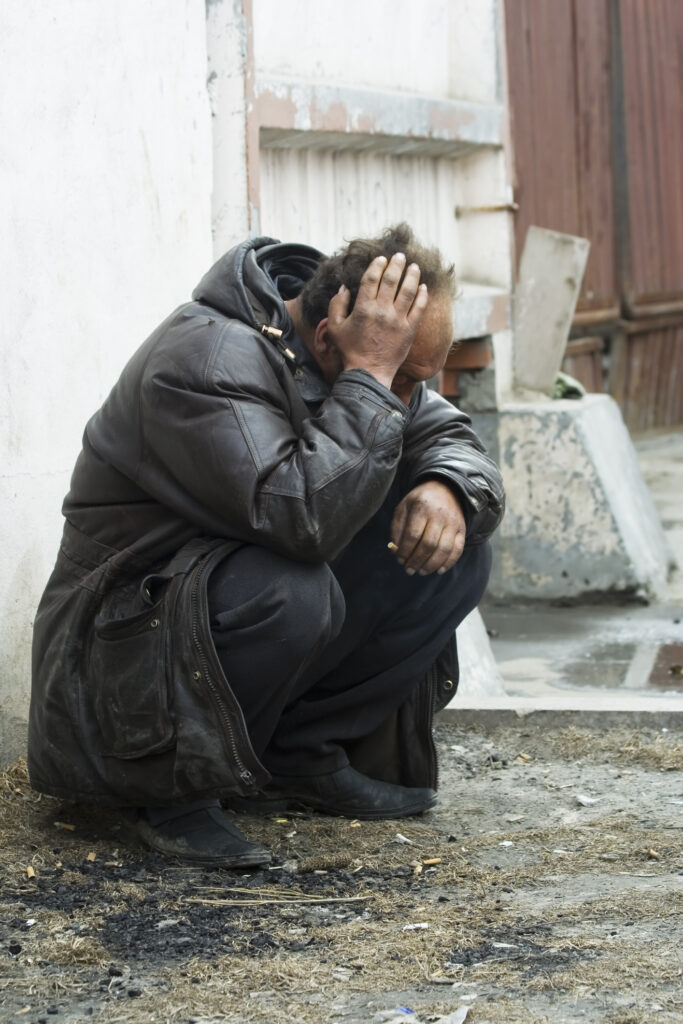
My life was a living hell surrounded by the walking dead. I was homeless for an entire year and ran around with addicts, dealers, felons, thieves, and convicted murderers. I slept in green belts, gutted RVs, backyards, front yards, cars, tents. I did whatever I could to get dope. I had multiple encounters with the police. I knew people who died from gun violence, suicide, and fentanyl overdose. My entire life revolved around one sole purpose which was to acquire meth.
For a while I had accepted my fate because I truly believed I possessed no inherent value as a human. In a way it was all a penance, a restitution for being unworthy of love, and for bringing shame upon my family. But from time to time, I would reach out to certain family members with a borrowed cell phone just to maintain a tether to the land of the living. Sometimes I’d talk to my brother, other times my cousin. Late one night as I was walking aimlessly through the streets, I had the epiphany that I had hit rock bottom, and it wouldn’t be long before I was either in jail or dead. I realized I wanted to live and so the next day I called my cousin, and he helped set up an intervention with my extended family. This intervention included my biological father who was a big part of my recovery.
After the intervention, my family generously put their money together and sent me to Mexico to receive an experimental treatment known as Ibogaine, which is one of the world’s most powerful hallucinogens, derived from a tree bark indigenous to Africa. It’s an intense therapy where you are administered a large dose and then monitored by nurses in a controlled hospital setting as you hallucinate for 24 hours straight. It was one of the most terrifying experiences of my life. At first, I relived the most painful events of my life, but later in the trip the fear slowly faded away into acceptance, forgiveness, and finally a deep peace that I’ve carried with me to this day. Ibogaine was nothing short of a miracle drug for me. I’m happy to see that its applications to not only addiction, but also depression and PTSD, are becoming more well known.
When I returned to my family my lovely aunt and uncle graciously allowed me to stay with them. They housed me, fed me, helped set up outpatient treatment, treated me like their own child. After 4 months there, I moved into a halfway house where I lived with other recovering addicts, gradually easing my way into independent responsible living. Within 2 months I landed a job as a data engineer and had my own apartment.
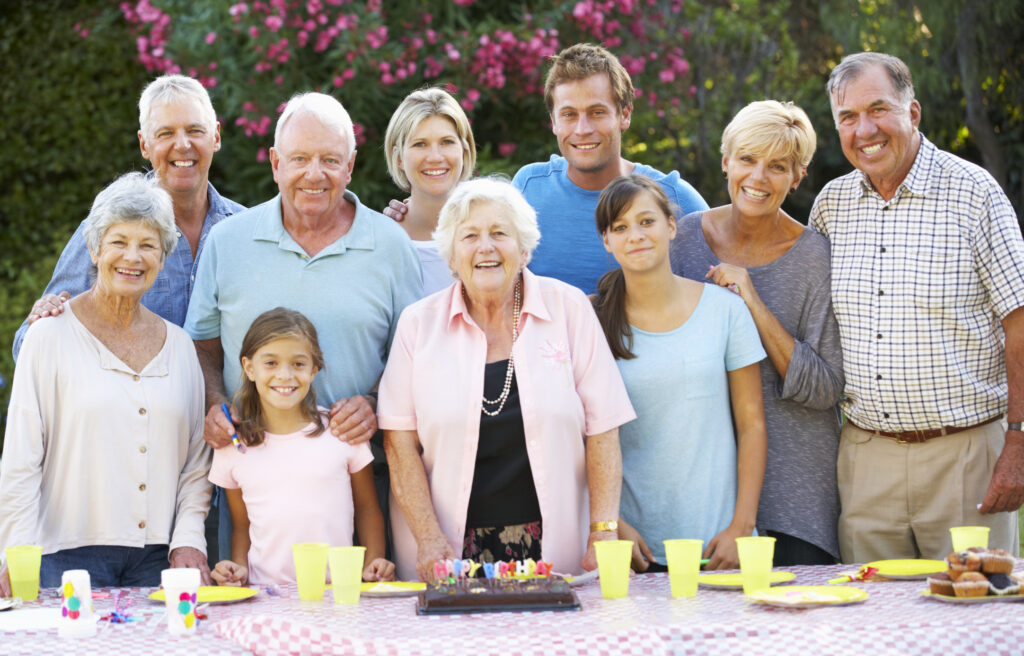
Fast forward 8 years and I am still sober. I’ve paid off 100k in debt, got another car, gone through numerous promotions at work, and recently bought a house. I was able to reconnect with one of the guys I knew on the streets and started sponsoring him. He’s been sober for 3 years now and has completely transformed his life. Most importantly, I repaired my familial relationships, including my grandmother whose heart I once broke.
It’s a wonderful feeling to be loved by so many people. Rather than having 2 parents, it’s like I have dozens, which is pretty special. In the end I realized that love is the one redemptive force in the world, and family is its purest form. From love extends all good things in life: forgiveness, redemption, peace, sobriety. All it takes is for one person to love someone else, to show that person they are worthy of love and in doing so, perhaps most importantly, teach that person to love themself. Luckily for myself, I had dozens of beautiful people to teach me: brothers, sisters, cousins, aunts and uncles, grandparents, nieces and nephews.
I am also especially grateful for my siblings, who, having gone through the same painful experiences I had, were much stronger than I, and managed to process and overcome their pain without succumbing to the pitfalls that befell me. Their strength is an inspiration to me.
Thanks for taking the time to read this.
God Bless.

Resurrection of the Body
By Robert Fontana
Happy, Holy Easter! Because of the resurrection of Jesus, we proclaim in the ancient Creed: “I believe…in the resurrection of the body, and life everlasting.” I was reflecting on this truth following the deaths of a number of friends whose remains were entered into the earth. I wondered, if earth could speak, what would Mother Earth say to the corpus of one being laid to rest with hope in the resurrection of the body. This is what came to me:
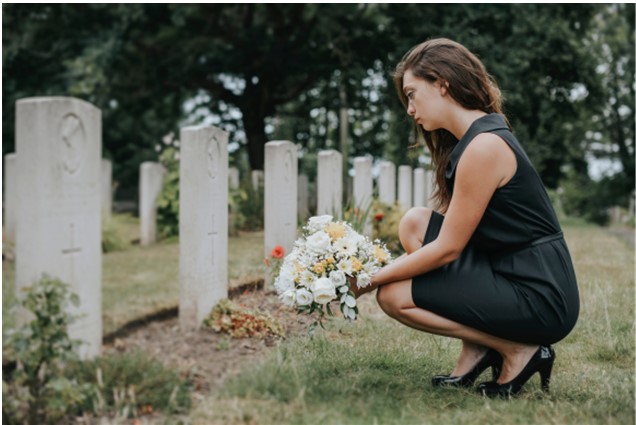
Mother Earth’s Letter to the Corpus of Friend
Dear Body of Friend, O holy corpus, O sacred bones and skin! Friend has been called home; you are still here. He has stepped into God’s time; you are left on earth time. I know you grieve your soul’s departure, the soul that animated your flesh and bones, that breathed air into your lungs, and sent life-giving blood through you heart. Be patient, O sacred corpus of Friend, in God’s good time, you will be united again.
In the meanwhile, you, O beautiful and grace-filled flesh and bones of dear Friend, you will be returned to the earth, to the soil from which you came. Earth comes from the stars and the galaxies, which in turn come from the Great Beginning when God unleashed the Spirit’s creative powers into the universe. Earth, like a tender mother, through powerful and mystical forces guided by the Spirit, gave birth to the great seas and land masses, to the creatures of the air, water, land, and those below the land, and finally, in the last age, to woman and man.
You, sweet body of Friend, holy relic, are being returned to the soil that gave you birth. Do not be afraid. I will hold you until that great day when the dead shall rise, and you have been fully reunited with Friend in the transfiguration of the dead. Until then, be at peace.
Good Friday Reflection: Jesus’ death means more than opening the doors to heaven.
By Robert Fontana

Jesus is not content to have his followers remain in the upper room, in Greek, “Cenacle.” The Cenacle is that warm place of close friendships, Eucharist, foot-washing, and drawing near to the Father’s love in the Son and through the Holy Spirit. The entire purpose of the Cenacle experience is to prepare its participants to leave its safety and security and enter the graced and broken world to be a power for good. It is into the “world” that God so loves that he sent his only Son, not to condemn it, but to save it. John 3:16
The “world” does not mean secular society and culture as opposed to life in the Church with its focus on faith and religious practice. “The world” in Scripture refers to the collective power of sin that shows itself in selfishness, self-centeredness, and violence; the abuse of human rights, break up of families, and the denial of dignity to so many: the unborn, migrants, the elderly, the imprisoned, the disabled, the ill in body and mind.
Jesus leads us out of the Cenacle into the world, a journey that always leads to the cross:
So they took Jesus; and carrying the cross by himself, he went out to what is called The Place of the Skull, which in Hebrew is called Golgotha. There they crucified him, and with him two others, one on either side, with Jesus between them…
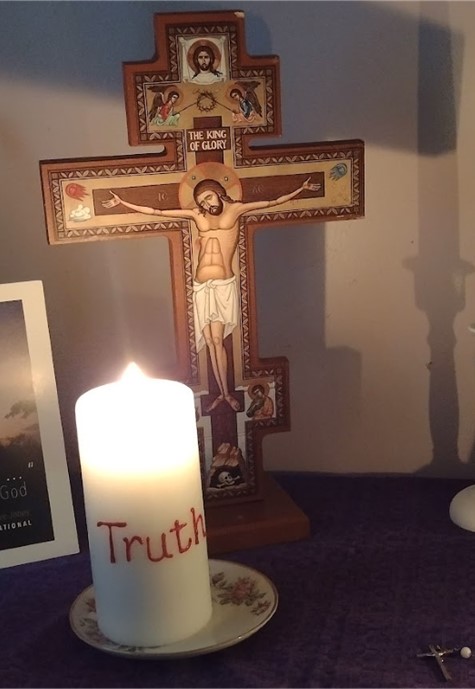
A few women from the Cenacle, including Jesus’ mother, and the “Beloved Disciple,” remained with him at the cross. They remained because of love, because they knew that Jesus, who was condemned as a criminal, was just the opposite. But they did not understand, could not understand until after the resurrection, the full meaning of this death: it was a life-giving death, a world-saving death for every human being that had ever lived and would ever live, and for creation itself. For Jesus’ death reconciled the world to God and paved the way to eternal life:
…now Christ has been raised from the dead, the first fruits of those who have fallen asleep. For since death came through a human being, the resurrection of the dead came also through a human being. For just as in Adam all die, so too in Christ shall all be brought to life, but each one in proper order: Christ the first fruits; then, at his coming, those who belong to Christ… (1 Cor 15:20-23)
But Jesus’ death means more than simply opening the doors to heaven. Jesus leads his followers to the cross because in his dying Jesus embraces suffering humanity and invites his followers to do the same. Some of his followers could not bear to be with Jesus in his suffering, and they fled. But others who were more stout-hearted, mostly women including his mother, stood with him in painful solidarity:
Meanwhile, standing near the cross of Jesus were his mother, and his mother’s sister, Mary the wife of Clopas, and Mary Magdalene. When Jesus saw his mother and the disciple whom he loved standing beside her, he said to his mother, “Woman, here is your son.” Then he said to the disciple, “Here is your mother.” And from that hour the disciple took her into his own home…
Good Friday reminds us that we too can stand with the suffering Jesus today, not merely liturgically but personally, by risking to step into the lives of suffering people and assist them in bearing the burden of their suffering. Clearly that is the meaning of Simon of Cyrene who helped Jesus carry his cross. Can we help children, the sick, the mentally ill, the immigrant and refugee, the unemployed and underemployed, the elderly and lonely, know the love of God through sharing our care and compassion?
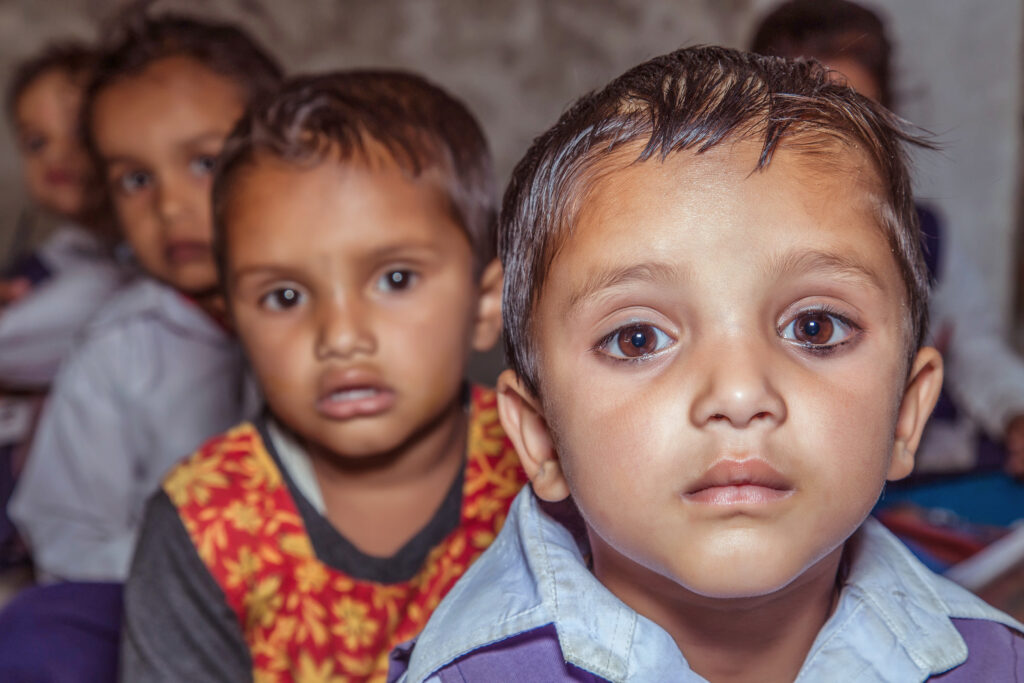
Fr. Thomas Judge, the founder of the Missionary Cenacle Family to which Lori and I belong, understood this as well. He insisted that the abandoned Christ on the cross, “the naked, crucified Jesus on Calvary,” is the Christ of the Cenacle (Meditations, p. 327); and Christ crucified can only be truly loved and comforted by loving and comforting the poor and spiritually abandoned in the world, those individuals and groups of people who do not know God’s love or the love of their neighbor. The Cenacle that stands at the cross in solidarity with the suffering Jesus is the Cenacle that stands in solidarity with suffering humanity.
On Good Friday we are reminded of the salvific death of Jesus, a death that bore the sins of the world and opened for all of humanity and creation itself, life everlasting. With this truth is a corresponding truth: we disciples of Jesus most effectively remember Jesus’ death by our personal solidarity and service to the suffering people we meet within the providence of our everyday lives.
Holy Spirit inspired “books” for Lent:The Bible and National Geographic
By Robert Fontana
For all of you observing Lent, reading and praying through the Bible is a no-brainer. I can see your raised eyebrows with my suggestion that you also read the National Geographic magazine. First let me comment on reading and praying the Bible.
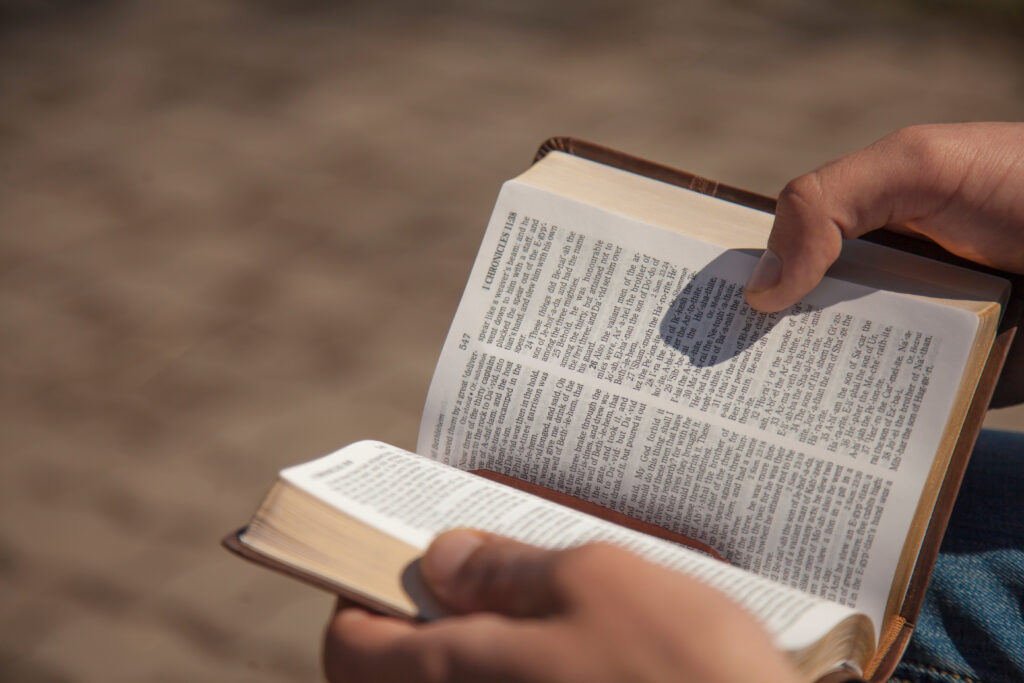
When I was in graduate school, a professor posed this question to the class: Is the Bible prescriptive for the life of believers today or descriptive of life of believers of the past? What do you say to that question?
Biblical fundamentalists lean towards the “prescription” side of the question, believing that the Bible prescribes in specifics how we must live today. We dare not veer from its direction less we incur the wrath of God. Of course, there are real problems with this view. The Hebrew and Christian Bibles support slavery, a non-scientific view of the origins of the known universe, strict male dominance in the family and church, and religious domination of the nation. Christian nationalism is an outgrowth of this view of the Bible.
There are also real problems with saying that the Bible is only “descriptive” of how the people in biblical times lived and does not have serious guidelines for us today. Radical proponents of this view reject anything unique in the Bible. For them, Jesus is another figure in history like Moses, Buddha, and Mohammed. The goal of the spiritual life is self-actualization. “Sin” consists fundamentally of the social structures that sustain racism, consumerism, and power.
As so often happens in the spiritual life, the truth lies in a “both/and” approach to the issue. There are teachings and insights in the Bible that we need to insist are prescriptive for us today, e.g. belief in Jesus as the Beloved Son of God, and the ethical standards of the 10 Commandments and the Beatitudes. But clearly, not everything is prescriptive. We are not going to blame all mental health problems and disease on the devil and depend solely on praying with greater faith for healing.
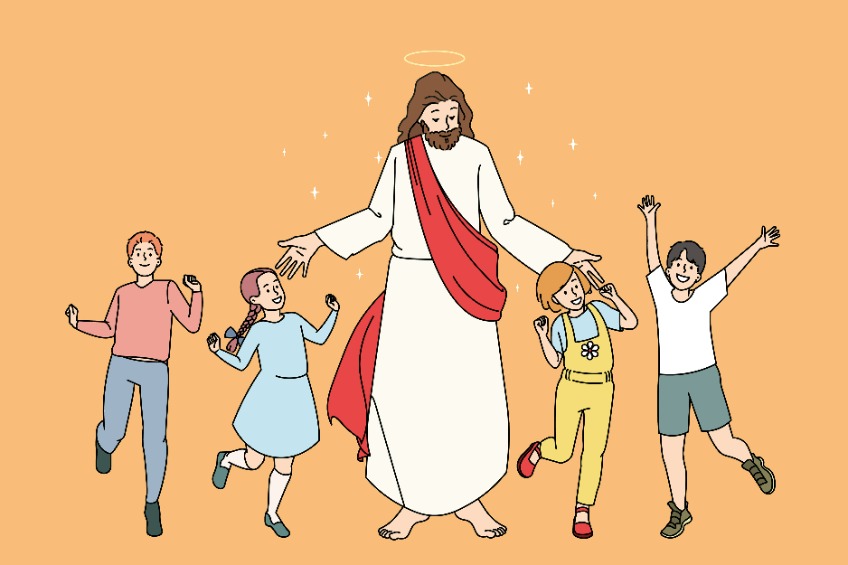
When you read and pray the Bible this Lent, remember this: before there was ever one written word of the Bible, there was a community of faith, the Hebrew people from the time of Abraham to Jesus, and, after the Resurrection, a Jewish-Christian people. Until the time of King David, the Hebrews lived their lives of faith without any written “Word of God.” Furthermore, the Hebrew Bible as we know it did not reach its full form until the time of Jesus. Without a written “Word of God,” how did they pass on the revelations they had received from God? The answer lies in the living faith of the people – their music, stories, laws, rituals, and symbols.
The same is true for the early followers of Jesus. There was no written New Testament as we know it until the end of the fourth century. How did the early Christians pass on and interpret the revelation of Jesus without a written Bible? Again, – through storytelling, music, laws, rituals, and symbols.
Clearly the “Word of God” is not fully contained in a book, the Bible. For Christians the “Word of God” is the Risen Jesus who is present to His people in the written word which gives testimony to how the first followers of Jesus understood who he is and how they were to live as his disciples. Jesus is also present in the lives of holy men and women in history who teach how to follow Jesus in their particular time and place. And we know the presence of Jesus through the lived experience of God’s people today. Each generation of believers gets to pray through the Scriptures and discern what the risen Jesus is saying through his word in Scripture, through his word in Church history, and through his word to the living Church today.
We take the Scriptures seriously but not literally. According to the Catechism of the Catholic Church, “we must acknowledge that the books of Scripture, firmly, faithfully, and without error teach that truth which God, for the sake of our salvation, wished to see confided to the Sacred Scriptures.” (Art. 107) We discern with the Church, the community of faith, what is descriptive of the life of believers from the past and is not binding for us today, and what is still prescriptive from the past and must be adhered to. An example of the first (descriptive) is the biblical acceptance of slavery. A prescriptive biblical passage is Jesus’ teaching:
“But to you who hear I say, love your enemies, do good to those who hate you, bless those who curse you, pray for those who mistreat you…Do to others as you would have them do to you. For if you love those who love you, what credit is that to you? Even sinners love those who love them.” (Luke 6:27-28, 31-32)
The Bible is not a science book. It does teach that God created the world, and we build on that with the scientific evidence gathered over centuries, from dinosaur bones to pulsars.
The Bible teaches that created things can manifest the presence of God. St. Paul makes this clear in his letter to the Christians in Rome: “Ever since the creation of the world, his invisible attributes of eternal power and divinity have been able to be understood and perceived in what he has made.”
(Romans 1:20) Many sources illuminate and illustrate the unfolding of God’s creative power in the vastness of the universe and in our tiny universe of planet Earth.
National Geographic helps me to better understand God’s creative power, active in the world. I am humbled and amazed with every issue as its writers and photographers reveal the beauty, complexity, and even fragility of the Earth, God’s creation, which we share with flora and fauna great and small.

For example, in a recent NG magazine on whales, the writer tells the story of a researcher who observed a baby beluga whale through the glass of an aquarium tank. As the two stared at one another, the researcher, smoking a cigarette, blew a cloud of smoke towards the baby Beluga. The baby swam off, returning a few seconds later with its mother who proceeded to release her mother’s milk, creating a cloudlike display which resembled the puff of cigarette smoke. WOW!! What is going on here? A Beluga watching a human. A baby whale communicating with its mother. Mother whale mimicking the human. I’m in awe.
The Holy Spirit inspires the Bible, but we must discern what in the Bible is “prescriptive,” as we prayerfully distinguish what we hold on to for our lives today.
The Holy Spirit is the creative power that brings forth life on our planet. Through different sources, such as scientific journals, we can learn more about the Spirit’s creative power and how to cooperate with it so that life continues on our planet.
Along with the Bible, National Geographic can be great spiritual reading for Lent.
The Lenten Journey, when Jesus comforts the afflicted and afflicts the comfortable
By Robert Fontana
Lent is fast approaching. And in Providential irony, Ash Wednesday is also St. Valentine’s Day (February 14). How about that for a divine challenge! Ash Wednesday invites us to fast, pray, and give alms. St. Valentine’s Day invites us to splurge on dinner, show love to those we love, and give flowers and lots of chocolate. And it follows that other day of great splurging – Fat Tuesday aka Mardi Gras. The last big “let the good times roll” before the disciplines of Lent take hold (with exceptions, of course, for St. Patrick and St. Joseph feast days).
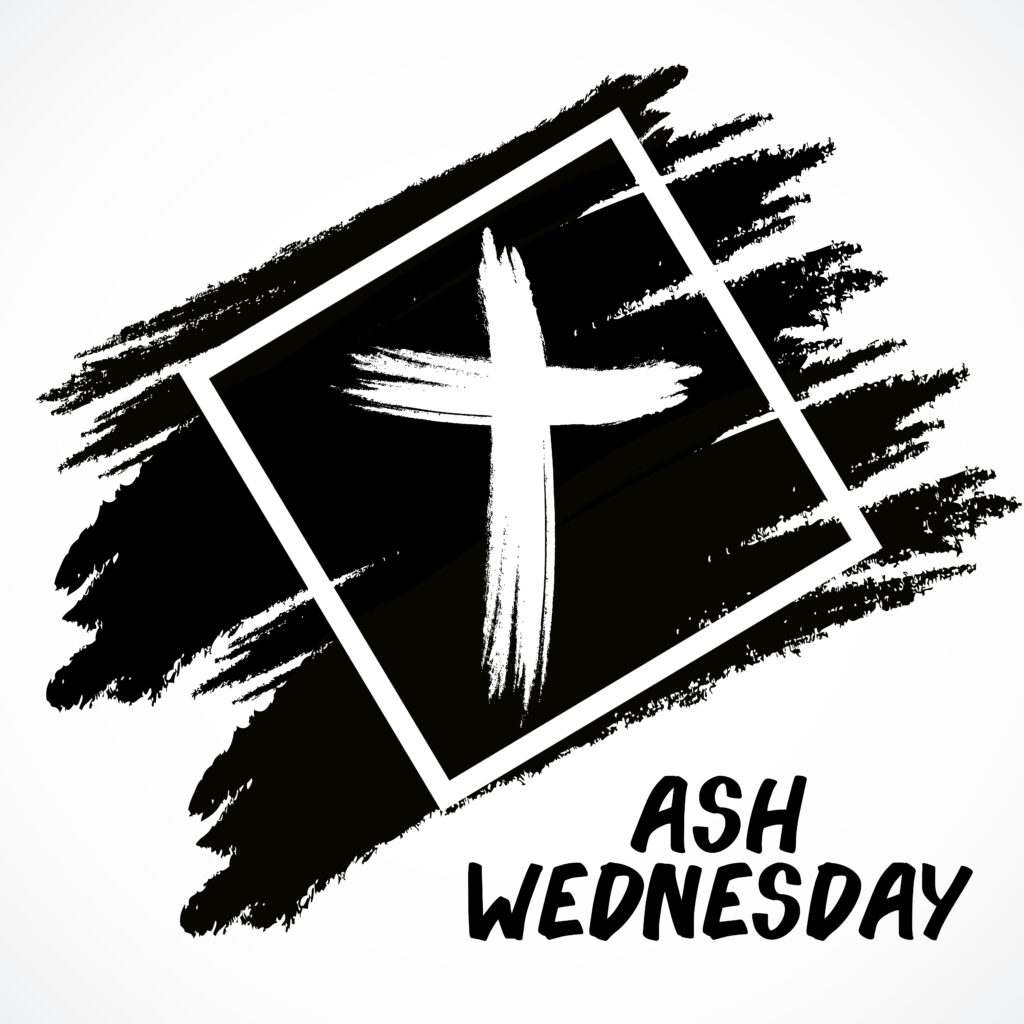
However you resolve the dilemma of Ash Wednesday’s coinciding with St. Valentine’s Day, prepare yourself now for the spiritual journey you want to take during the great 40 days of Lent. On this retreat we followers of Jesus are invited to encounter the Lord with all the honesty and authenticity that we can muster. If we do this, if we sincerely prepare ourselves to encounter Jesus anew, it can be a wild and crazy ride because Jesus does not fit neatly into our liberal – conservative categories.
We don’t get the Jesus we want. We get the Jesus we need.
Keep in mind, the Jesus who said,
“Come to me all you who are weary, and I will give you rest,” (Mt 11:28)
is the same Jesus who said,
“Do not think that I have come to bring peace upon the earth. I have come to bring not peace but the sword. For I have come to set a man ‘against his father, a daughter against her mother, and a daughter-in-law against her mother-in-law; and one’s enemies will be those of his household.’” (Mt 10:34)
At first glance it might seem Jesus is being schizophrenic, a Dr. Jekyll and Mr. Hyde. However, most parents, teachers and anyone who cares for children and youth know that we must do this delicate balancing act of “comforting and afflicting (or challenging) our children all the time.
For example, your son, trying to impress a girl with his driving skills, backs into a car. The other car has very little damage but the rear of your car is crushed. Your son, with tears in his eyes, comes to tell you what happened. You, of course, are glad that no one was hurt and feel bad for your son who clearly shows remorse. You hold him in your arms, tell him you love him, remind him that cars can be fixed and that you are glad he is alright. He feels consoled, cared for, and comforted. The “afflicted is comforted.” He is reminded that he is absolutely loved no matter what!
But wait, that’s not the end of it. You look your son in the eyes and say, “Of course, you will have to pay for the repair out of your work money.”
He looks at you with horror in his eyes. Six months later, after making his last payment to you for the repair of the rear hatchback, he says, “I sure hate making money at my job and handing it directly to you.”
The “comfortable” has been “afflicted.” He needed to be held accountable for his behavior and accept the appropriate consequences so that he could mature and grow into a wise, thoughtful, and healthy contributor to society.
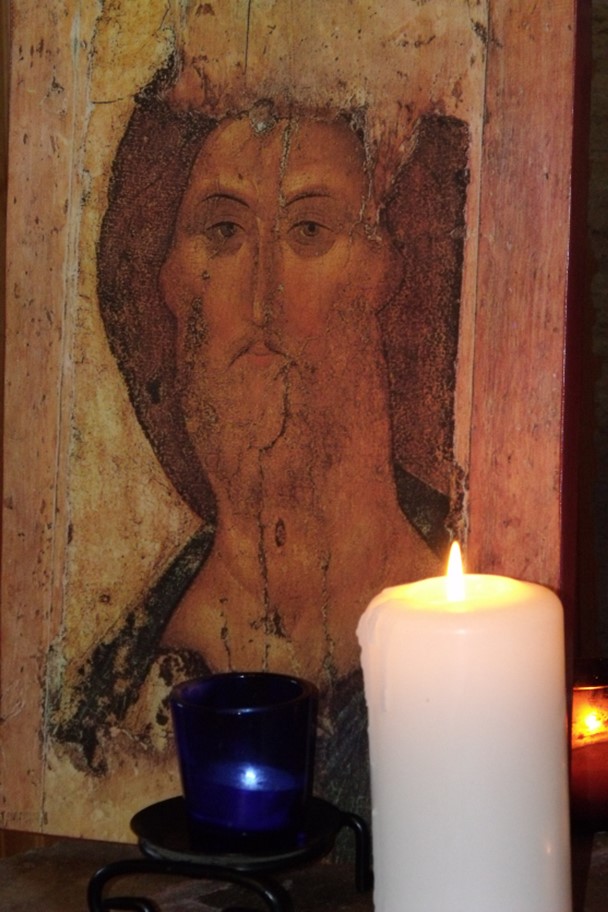
Something similar happens when we encounter Jesus in an honest authentic way. We do not simply get the Jesus we want, the One who consoles and comforts us, we get the Jesus we need, who wants us to learn from our mistakes, hurt, conflict. For example:
Charlie goes to see Fr. John because he is having marital problems. Fr. John greets him with great compassion, listens to his pain, and offers him a safe place to unload. The “afflicted” has been “comforted.“
Fr. John, being a wise spiritual director, also invites Charlie to examine his role in the conflict. Charlie admits that he’s been under a lot of pressure at work, has been drinking too much at home, and that his wife complains of being hurt and neglected. Now Fr. John gets to ask Charlie, who’s an active Catholic, “Are you the person you want to be in this marriage? Are you being the husband and father that you want to be in Christ?” The comforter has now become the afflicter (in a loving and kind way).
Charlie thinks about it. “No, I’m not being the person I want to be.”
“Well, who is that person you want to be in this marriage and family? And what are you doing that’s getting in the way of your being the husband and father you want to be and can be?
There’s silence. Fr. John lets it sit there for a while then says, “Tell me about your relationship with alcohol.” And for the first time in his life Charlie admits that he can’t manage his drinking. It’s out of control.
If Fr. John had offered only comfort, it would have allowed Charlie to hide behind Fr. John’s kindness and care. He would not have been challenged to mature, to grow up and take responsibility for his part in the conflict at home nor to make a realistic assessment of his drinking habits. This is not uncommon. Many active Catholics, Protestants, and Evangelicals use religious practices and friends to hide from the difficult and complex issues that keep them from maturing into healthy adults. They turn to Jesus for comfort but do not stick around for the “affliction/challenge” that they need to grow and mature in faith.
The beautiful thing is that when Jesus does “afflict” us, he walks with us every step of the way as we take a hard look at ourselves, address the issues within that are keeping us from growing in faith, and find the courage to mature.
Whatever your Lenten plan is, draw close to Jesus, receiving both his comfort and his “affliction.” In your prayer, at worship, with a spiritual companion or director, bring your struggles, your questions, your fears to Jesus. Allow Jesus to bless you with tender love and guide you along a path of life in the Trinity.
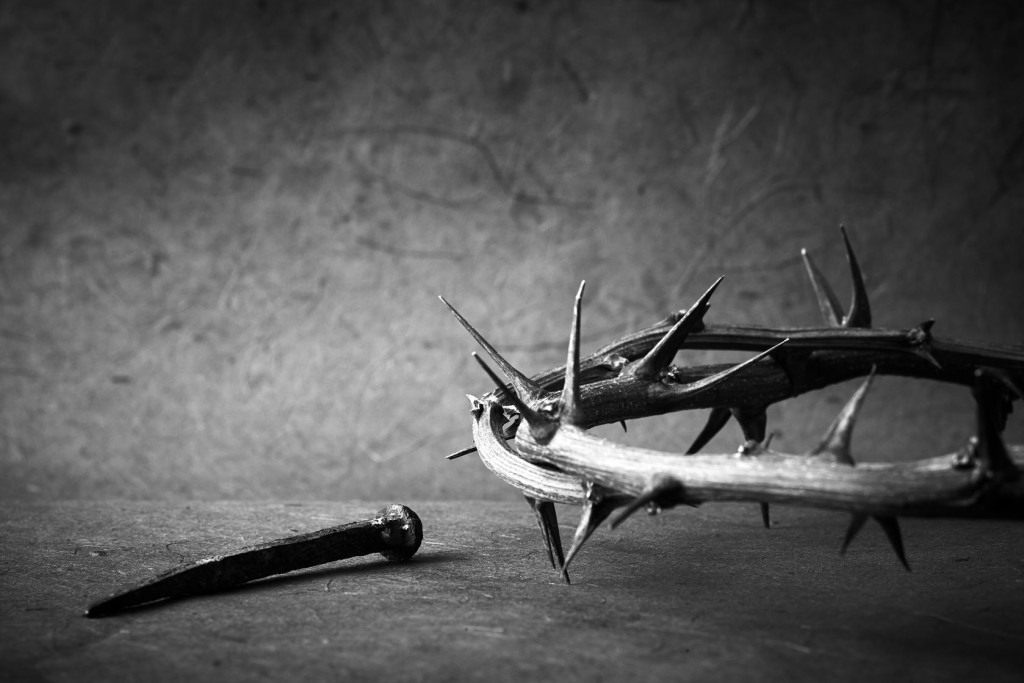
Fun, Spring Cleaning, and St. Brigid’s Day
By Robert Fontana
(reprint from 1/31/2016)

Faith can be fun for kids and adults alike. In fact, if it is not fun some of the time, even for us older folks, faith will lose its power to touch our imaginations and enrich our lives. One way to keep faith fun in the home is to select a few of your favorite saints – perhaps those saints with whom your children share a name or with whom your family has a cultural connection – and plan to celebrate their feast days in your home with good food, a children’s version of the saint’s story, and some sort of prayer ritual.
We Fontanas like to observe the Feasts of St. Joseph (March 19) who is the patron saint of Italy, St. Clare (August 11) and St. Francis (Oct 5), and of course, our Irish patrons (Lori’s side of the family) saints Patrick (March 17) and Brigid (Feb 1).
St. Brigid’s feast day is Thursday, February 1, which, in Ireland, also marks the first day of Spring. So on St. Brigid’s Day we are going to gather with family for some good Irish stew and some good Irish faith-fun, including the following prayer service:
Begin with this Prayer to St. Brigid
Saint Brigid, daughter of Ireland and lover of Jesus, draw us by your prayers into the living flame of God’s love. Help us to clean our hearts and homes of all that is selfish and sinful. Pray that we will be attentive to the poor and spiritually abandoned, that we will practice the Beatitudes in good times and bad, and that the warmth of God’s love will animate all that we say and do.
Each member of the home then takes a bandanna, handkerchief, or even a cloth napkin in hand and walks through the house, dusting the furniture, TV, books, and lamps, etc. singing “Alleluia, alleluia, alleluia.”
When the house has been thoroughly dusted, all go outside and tie the cloths on the branches of a shrub or tree (or porch railing). Then together, pray this prayer:
All: St. Brigid, come this day to our home and hearts; come by the power of God and be our guest. And help us, dear Brigid, to wipe away the dust of too much “me, and my, and mine” that we might love others with a selfless heart. We pray this in the name of Jesus. Amen.
Our Father…
Return to the house for dessert (Irish mint ice cream!)

Countdown to Epiphany, this prayer can help
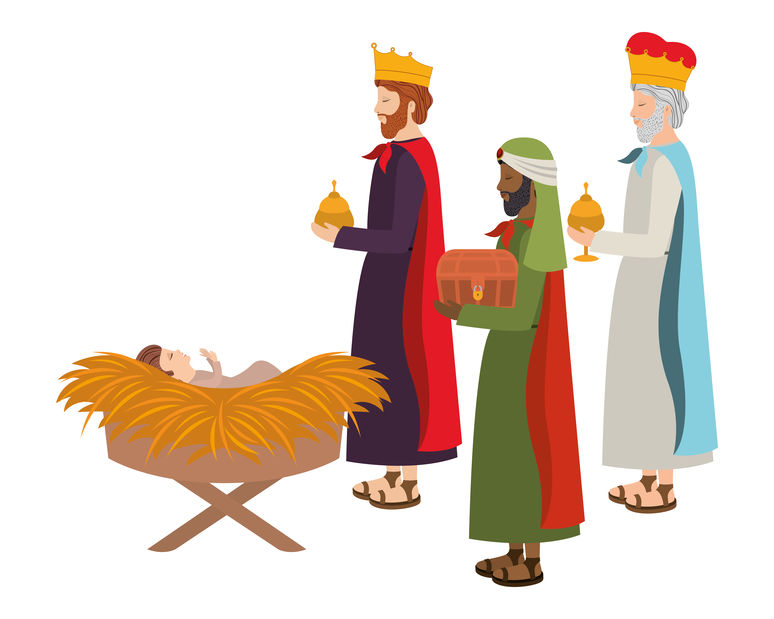
Many Catholics and other Christians do not celebrate the great feast of Epiphany which commemorates when the “Magi from the East” visited Bethlehem and the Christ child. They follow the secular trend of ending the Christmas celebration on Christmas Day or shortly thereafter. They might sing the popular Christmas carol, The Twelve Days of Christmas, but they do not understand its meaning. The title of the song refers to the 12 days between Christmas and Epiphany. Here’s what Wikipedia writes about this time period:
In many Western ecclesiastical traditions, Christmas Day is considered the “First Day of Christmas” and the Twelve Days are 25 December – 5 January, inclusive, making Twelfth Night on 5 January, which is Epiphany Eve. In some customs, the Twelve Days of Christmas are counted from sundown on the evening of 25 December until the morning of 6 January, meaning that the Twelfth Night falls on the evening 5 January and the Twelfth Day falls on 6 January.
We have a special family gathering on the Feast of Epiphany. It’s when we exchange gifts with one another, have a great meal together, make crowns of the Three Kings for all to wear, play games and sing carols. And to help us countdown from Christmas to Epiphany we have this prayer ritual at dinner for the Twelve Days of Christmas:
- Light three candles representing the gifts of gold, frankincense, and myrrh. Pray the following prayer together:
- To Bethlehem we travel with the Magi from the East, across the days of Christmas to the Epiphany Feast. Give us the courage of the Magi as we begin our search for you. Give us the eyes of the Magi that we might see the star that leads us too. And when we get to Bethlehem on that Holy Epiphany Day, give us the heart of the Magi that humbles us to pray.
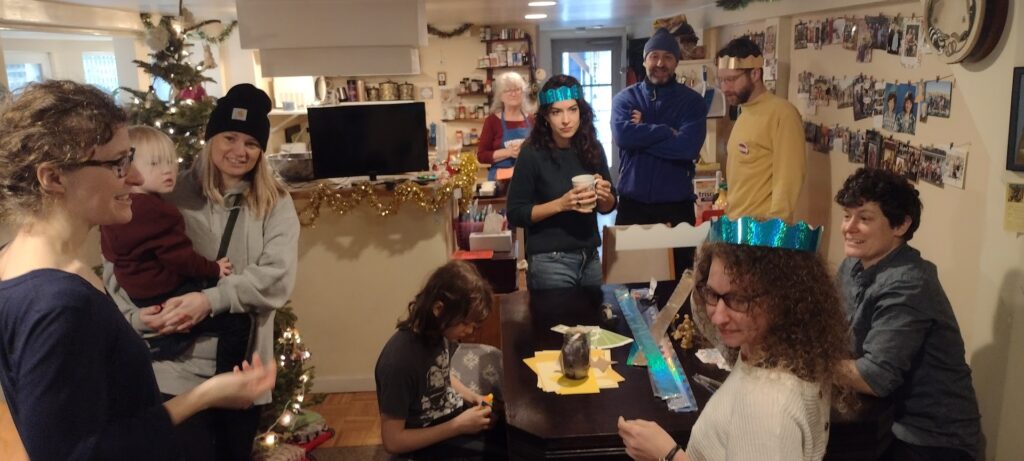
Plan a fun gathering for your family and friends for Epiphany on January 6, 2024. Happy Christmas – Epiphany season!
A love note to a Christmas tree
By Robert Fontana

I love you, O beautiful tree of Christmas. You enrich my life and the lives of all who gaze upon you in wonder and delight.
Your coming was awaited with childlike anticipation. And when you arrived, the busyness of the house stopped so all could welcome you. Treats were shared and wine was poured as you took your place in the corner of the family room, an honored guest.
You are lovely in your simplicity. Still, we dressed you with a string of lights that glow like fireflies in the night. Then your magic began, for it seems you are some sort of mystical portal to the past. I can see my father toasting his sons with a glass of Mogan and David and my mother, cigarette dangling from her mouth, laying tinsel strand by strand on the Christmas tree of my childhood.
Other memories emerge as we grace your branches with ornaments, some homemade, some gifted, some in honor of the holy event we commemorate, and some as playful as a toy plane, a doll, or an elf from Santa’s workshop. With each adornment, stories are shared. With each sharing, new images from the past flow around us: cousin Wade running in from the outside delirious with joy; my brothers in their red Boys Choir blazers preparing for midnight Mass; and friends gathered around the piano to sing “Sister Mary Had a-But One Child” to Mom’s accompaniment.
O Christmas Tree, I see in you all the Christmas trees of my past, from the great pine my brother John and I cut down and dragged into the family living room, to the silver one that shone brightly at Grandma’s house, to the very first tree of our marriage, a “tree” that Lori and I created from cast-off boughs collected at the Christmas tree lot because we could not afford even the $10 for the smallest tree.
We have gathered our children around you, and now our grandchildren, all in memory of the God of love who sent us Jesus to teach us how to love. You, O Christmas Tree, have been a sacrament of this season, a source of beauty and unity of past and present. And like the Christ-child who will give his life for all of creation, you give your life so that we may celebrate these days in the grace of your presence.
I do love you, O Christmas Tree, and I thank you!

Homespun Homily by Lori: The Chaplet of Divine Friendship
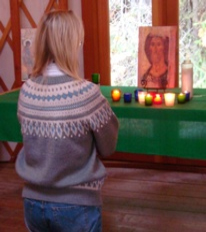
During the months of lockdown in the pandemic, one benefit we enjoyed was that Robert and I grew in our appreciation of the Chaplet form of prayer. We prayed the Divine Mercy Chaplet with family members and friends over Zoom. Soon we discovered the sung version of this chaplet, which I especially enjoy praying and singing through.
Eventually, Robert developed our own simpler form of the chaplet type of prayer, calling it the Chaplet of Divine Friendship. The format is very similar to other chaplets, with an introductory prayer, the antiphon chanted before each of the five “decades,” and the ten repetitive short prayers, prayed in the call and response pattern.
The chaplet prayer has much in common with the rosary. Its repetition allows for calm reflection. It doesn’t require a lot of thinking but rather touches the heart and the spirit. This is one reason why I appreciate this form of prayer so much – when I pray / sing the chaplet, my worries are pushed to the side. My anxious thoughts are drowned out by the simple declarations of faith in the chaplet’s prayers. Praying the chaplet helps me in my everyday life. It is a form of contemplative prayer.
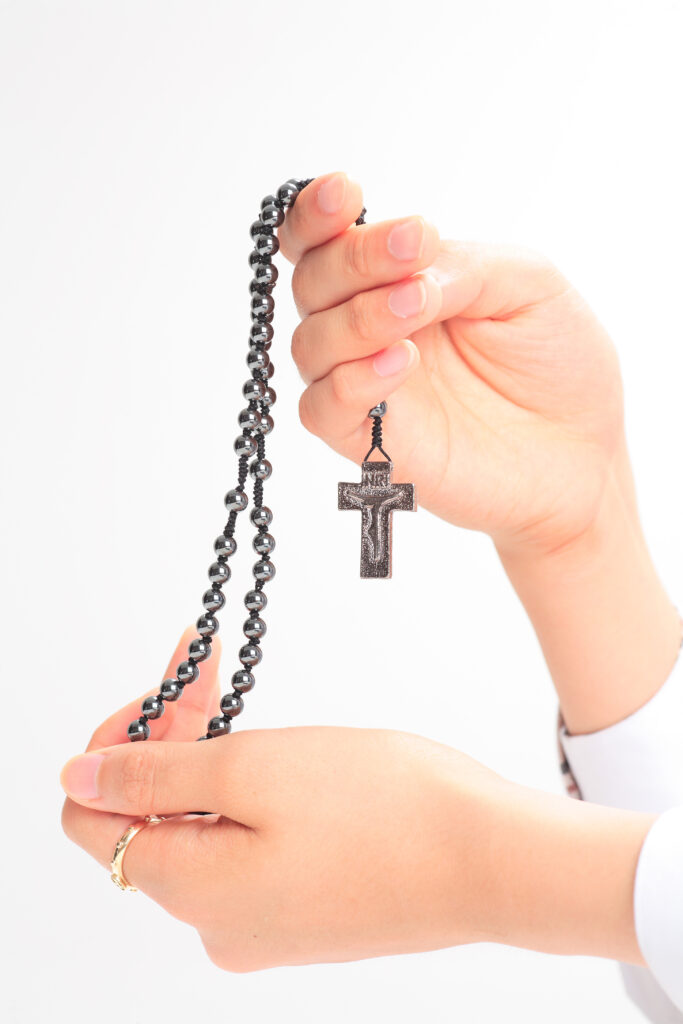
I pray it when I’m driving – I can hum the prayer and still pay close attention to the crazy Seattle traffic. I pray it when I’m waiting – in grocery check-out lines or at a grandchild’s soccer practice. I pray it when I’m walking to the post office or library, when I’m worrying about a problem as I wash the dishes or clean the bathroom, when I awake in the night and can’t sleep. Increasingly, I’ve been intentional about turning to this simple prayer because I KNOW it’s so much better, so much more productive than complaining or ruminating or drowning in “what if’s.”
We hope that you will take a look at the Chaplet of Divine Friendship which we’ve recorded at this YouTube link: https://youtu.be/xX_idGXc-20
Try it for Advent. Use your rosary to help you keep count of the chaplet decades. May it be a help to you, a calming, encouraging reminder of the great love of Jesus for YOU.
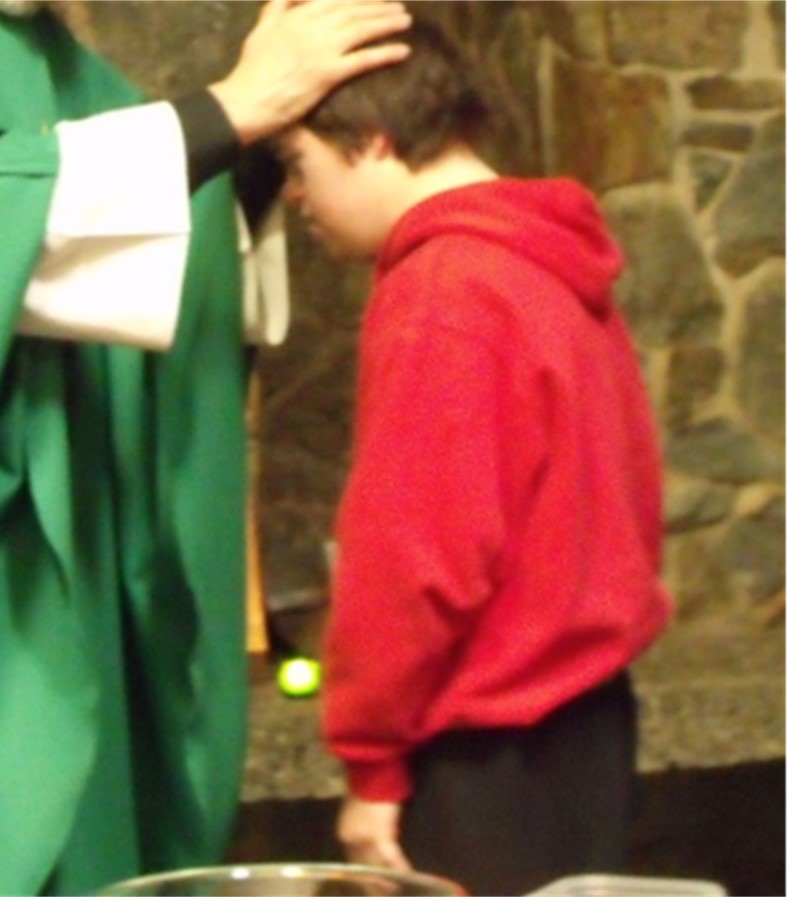
An Advent Spiritual Practice: The Chaplet of Divine Friendship_________________________________________
Opening Prayer – In the name of the Father…Abba Father, Lord of heaven and earth, you created woman and man in your image and likeness and planted them in the garden of earth to love one another and to care for the flora and fauna of the earth. You did not leave them alone but walked alongside them as you walked alongside our biblical ancestors Abraham and Sarah, Isaac and Rebekah, and Jacob and Rachel. And in the fullness of time, you sent your beloved Son Jesus, to be not merely our Lord and Savior, but our friend. Jesus said, “I have called you friends, for everything that I learned from my Father I have made known to you.” (John 15:15) (5 decades)
All– Abba Father, so loved the world, he gave His only Son, not to condemn the world but to save everyone, to save everyone.
Leader – Jesus our brother, kind and good (10 x’s)
All – I trust in you, I trust in you.
After the 5th decade:
Closing Prayer: Abba Father, Lord of heaven and earth, thank you for giving us Jesus as our friend and brother. Help us to return His friendship by being attentive to the Holy Spirit’s working in our lives and in the world and having the courage to follow the Spirit’s prompting always. In the name of the Father…
A Reflection on Women in the Church (guest writer)
Lorene Davidson was asked by our pastor to give a reflection on Women in the Church in place of his homily on the Feast Day of ST. Phoebe, deaconess and companion of St. Paul (Romans 16:1). She has given us permission to reprint it here.
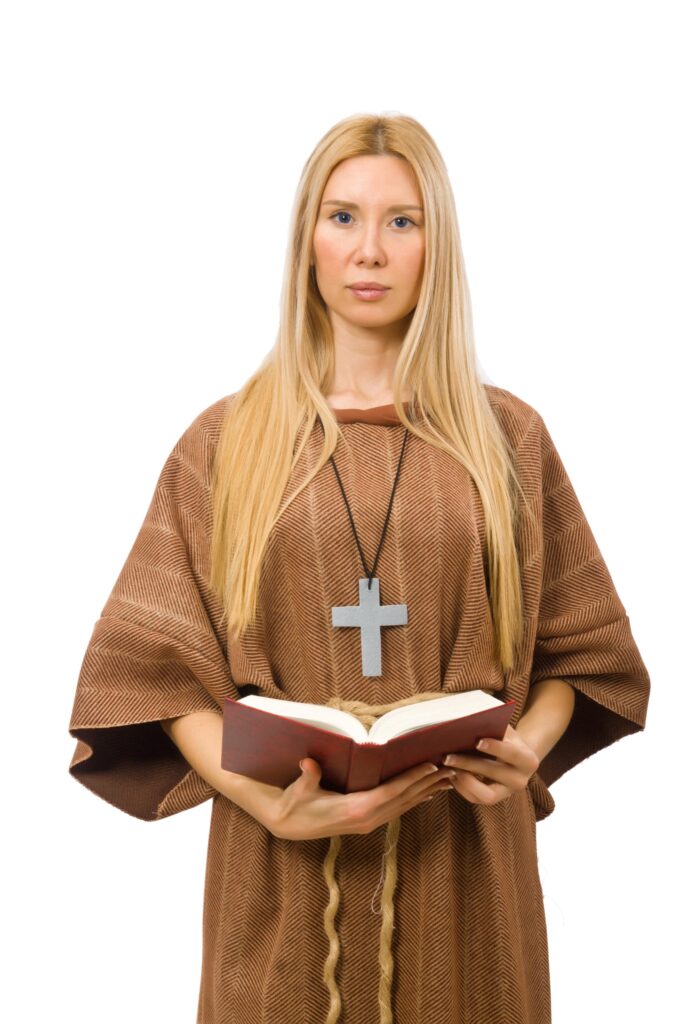
When Fr. Oliver asked me to offer this reflection, I had just heard Maria Laughlin from St. James Cathedral share her experience of the synod gatherings in our archdiocese. It filled me with hope for the future of our church. People of all ages and backgrounds came together to listen to each other intentionally and share from their hearts what they envision for the future of our church. She said that the Holy Spirit’s presence was evident.
When the results of the first phase of the global synod were published, I felt uplifted and energized. People from all around the world believe that there is an urgent and critical need to rethink women’s participation in the church. The number of priests is dwindling. We need more vocations to the priesthood, but we also need laypeople to step forward to help – both laywomen and laymen. Religious women and men are also a great resource.
There are nuns all over the world carrying out leadership roles, but they often lack official recognition or support. There are women in the Amazon acting as deacons with the blessings of their bishops. Because there are so few priests, some remote communities do not see a priest for six months to a year. These women are baptizing, officiating at marriages, and ministering to the spiritual and physical needs of the communities. And yet, these women cannot be ordained as deacons.
Where is St. Phoebe in all this? St. Phoebe was a deacon and benefactor of the church in Greece. She, along with other women and men, spread the gospel across Asian Minor and east to the Roman Empire. St. Paul himself commended her to the Christian community in Rome, asking them to receive her in the Lord and treat her in the manner of the holy ones. Paul said that she was a benefactor to many including himself. (Romans 16:1-2). Think of the courage it took for a woman to travel 700 miles to a country and community she did not know. Imagine that strength of her faith. She is a reminder that there is historical precedent for women deacons in the Catholic Church.
I have seen so many changes in our church during my lifetime. When I was a child, we did not have “Altar Servers,” we had “Altar Boys.” There were no lectors or Eucharistic ministers. The priest did it all. Of course, most parishes had two, three or more priests to divide the labor. Our priests need our support. And many of them would welcome it.
My mother is often on my mind when I am a server, lector, or Eucharistic minister. She and many of the women in her generation would have welcomed the opportunity to serve in the way women can now serve. I am so thankful that I can participate more fully in the life of our church. The last few years I have been serving at daily Mass with a team of eight other women and men. As a server I feel even more connected to the liturgy and the Eucharist. As a Eucharistic minister I feel a special bond to each communicant. I am in awe of offering them the body of Christ. As a lector, the connection to the word of God, studying it, reflecting on it offers new insights into God’s message.
And His message can change in different circumstances. For example, Mark 16:18 says, “they will pick up snakes with their hands, and if they drink poison, it will not harm them.” I could not relate to this until I went to healing ministry with two women from our parish. They gave me several Bible verses to meditate on while I was in treatment for cancer. It was like the Holy Spirit turned a light on in my head. These words were spoken 2000 years ago, before there was chemotherapy, and yet they are a perfect description. It brought me peace and calm. It gave me hope.
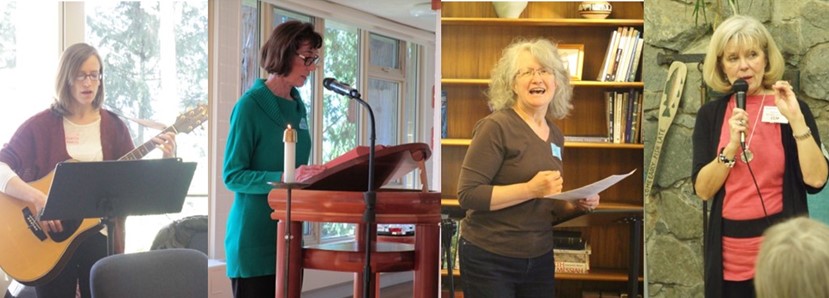
This healing ministry is just one example of the important work women in our church are doing. Look around you in our parish – at Mass and in the wider community, women are serving the needs of others. They are Eucharistic ministers, ushers, lectors, members of the RCIA team, teachers in religious education, members of St. Vincent de Paul, members of the parish council and countless other ministries. There is a saying, “Women hold up half the sky.” Women and men need to serve together, but as equals.
We all become disciples at our baptism. We all have different gifts, through God’s grace. God wants each of us to use our gifts to support each other and our community. As I look around our parish, I am amazed at all the time, treasure and talent that is given. This is exactly what is needed to strengthen our faith and our church. As we approach the start of the synodal assembly [in October], I am optimistic. The members of the synodal assembly will gather in Rome to discern what steps the Holy Spirit invites us, the Universal Church.
To grow as a synodal church, the pope has appointed 450 participants, including dozens of religious women and men and lay people from around the world, to attend the general assembly of the synod of bishops. The voting members number the pope plus 363 cardinals, bishops, priests, religious, and lay women and men. Out of the 364 members who can vote, 54 are women…either lay or religious. This seems very positive to me. Let us pray for the members’ thoughtful discernment and blessings on church renewal.
The Long Road to Rome
By Robert Fontana
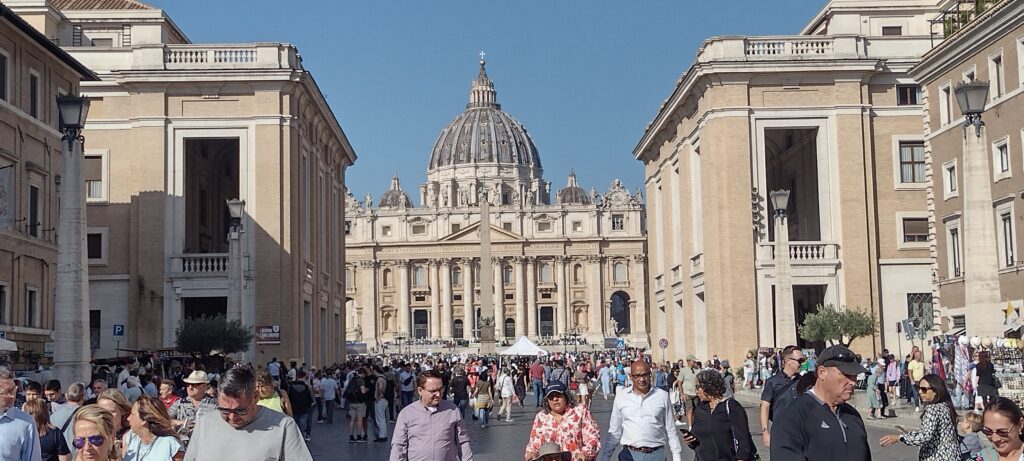
When Lori and I first confronted the issue of cover-up of clergy sex abuse by our then bishop and friend Carlos Sevilla, our first instinct was that I should resign from my position as Director of Evangelization and Deacon Formation for the Diocese of Yakima. We wrote about our decision to our family in Louisiana. My sister-in-law, Lise, whose husband, my brother, has represented hundreds of victims of clergy sex abuse as their attorney, wrote back with, “Don’t do it. That’s exactly what they want! They want you out of their way.”
We took her words to heart, prayed, and heard Jesus say to us, “Do you love the Church enough to stay in and work for change? You don’t have to do this. But somebody needs to bear the cross that working for change entails.”
It was clear to us that if we do not work for change then we must not only quit ministry but quit being Catholic. Otherwise, knowing what we know and not speaking up would make us complicit. That was true then, and it is true today. Over the past 21 years we have organized listening sessions to have survivors of sex abuse tell their stories; written the Pope’s ambassador to the US twice (never heard back from him); met with the Cardinal of Chicago, Francis George; organized days of prayer and fasting; and led workshops to inform people about the sex abuse crisis. I even wrote my doctoral thesis on training lay review boards to function as watchdogs over sex abuse cases and not just function as advisory boards.
During this time, I was banned from working at any Catholic church or institution in central and western Washington. I did CLM ministry in the homes of friends, gave retreats at other Christian churches, and traveled to other states where clergy friends and CLM sponsors would have me speak. Finally, in the summer of 2019, after Pope Francis published new rules stating that whistle-blowers ought to be protected in the Church, I filed a whistleblower complaint against the former bishop of Yakima, Carlos Sevilla, for his retaliation against me. The complaint was received, and the former bishop of Yakima was reprimanded for causing “harm and scandal” to the Church.
When, in late July, Tim Law, a friend and the founder of End Clergy Abuse (ECA), told us that he and survivors from around the world were going to Rome ahead of the Synod to walk a pilgrimage route, carrying a cross, to lobby the Vatican for stronger protocols to protect children and whistleblowers, we jumped at the chance to go. Tim, who is not a survivor of sex abuse but is a vigorous advocate for survivors, and eight others who are survivors began their walk on Sept 21. We joined them on Sept 23, three days into their trip. We walked with them, taking our turn carrying the cross for the final pilgrimage days, covering about 66 miles. OUCH! It was long, hard walking but beautiful sharing when we could keep up with the group’s pace.
We met several Italian “angels” who directed us along the right path. On our first day of walking we came to an area with a dozen downed trees blocking the path. An Italian “angel” appeared walking from the other direction and lifted the tree trunk just enough for several of us walkers to slip underneath.
On our second evening of walking, we came to the town where the main group was staying. Our accommodation was still another 45-minute walk to the outskirts of the town. As darkness fell, the hostess came riding her bicycle up the hill to meet us. She took our packs on her bike and assured us that we were almost there. On our third evening, we were searching in vain for our bed and breakfast. Stopping at a busy pizzeria to ask directions, we met a family, Luca, Sylvia, and their son Andreas. The parents spoke some English and listened to our plight. After a rapid family discussion in Italian, Sylvia said, “My husband knows this street where you are going. He is an electrician working at a home on this very street. He will drive you there after we eat our supper.” And he did! The providence of God!
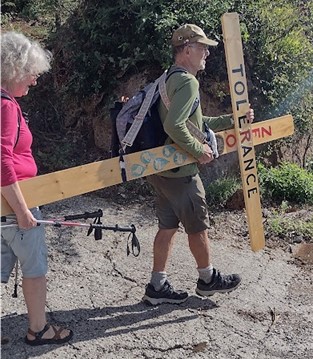
Our small group met a larger group of survivor lobbyists, folks from Jamaica, Canada, Peru, Mexico, Slovenia, Italy, Germany, Philippines, Costa Rica, Serbian, New Zealand, India, Congo, and Uganda. What courageous men and women, coming to Rome at their expense, demanding that Pope Francis do more to change Church law and practice to better protect minors and vulnerable adults from sexual exploitation.
There were press conferences (I was interviewed by Associated Press and Reuters, and Lori, though trying to stay in the background, got her picture in the Reuters newsfeed); protest rallies outside St. Peter’s; organizational meetings; letters presented to the papal commission on sex abuse; and planning for the next leg of the journey – taking this issue to the United Nations in Geneva. This part of the journey was for a select few.
As others went on to Geneva or returned to their homes, Lori and I stayed in Rome to participate in an ecumenical prayer service led by the Taize community for the upcoming Synod. Pope Francis participated in it as well as representatives from the major Christian denominations and Churches. In fact, a female Lutheran bishop who was on the podium with Pope Francis stayed at the convent where we also stayed. We had breakfast with her the morning following the service. The prayer service was attended by several thousand people including many, many young people from across Europe. It concluded with the veneration of the cross of San Damiano, a replica of the one from which Francis of Assisi heard the words, “Francis, go and rebuild my church for you see it is in ruins.”
Lori and I with Tim Law of Seattle and the End Clergy Abuse delegation are doing our part to continue the call given to St. Francis to “rebuild the church” that is in ruins due to the crimes and sins of clergy sex abuse and cover-up. We think we have had an impact. While we were in Rome, we read that the papal commission on sex abuse sent a statement to the delegates at the upcoming Synod insisting that the issues of sex abuse of minors and vulnerable adults be at the center of their deliberations. We are grateful to Tim Law for including us to be a part of this effort. Please keep Tim and the good work of ECA (End Clergy Abuse) in your prayers.
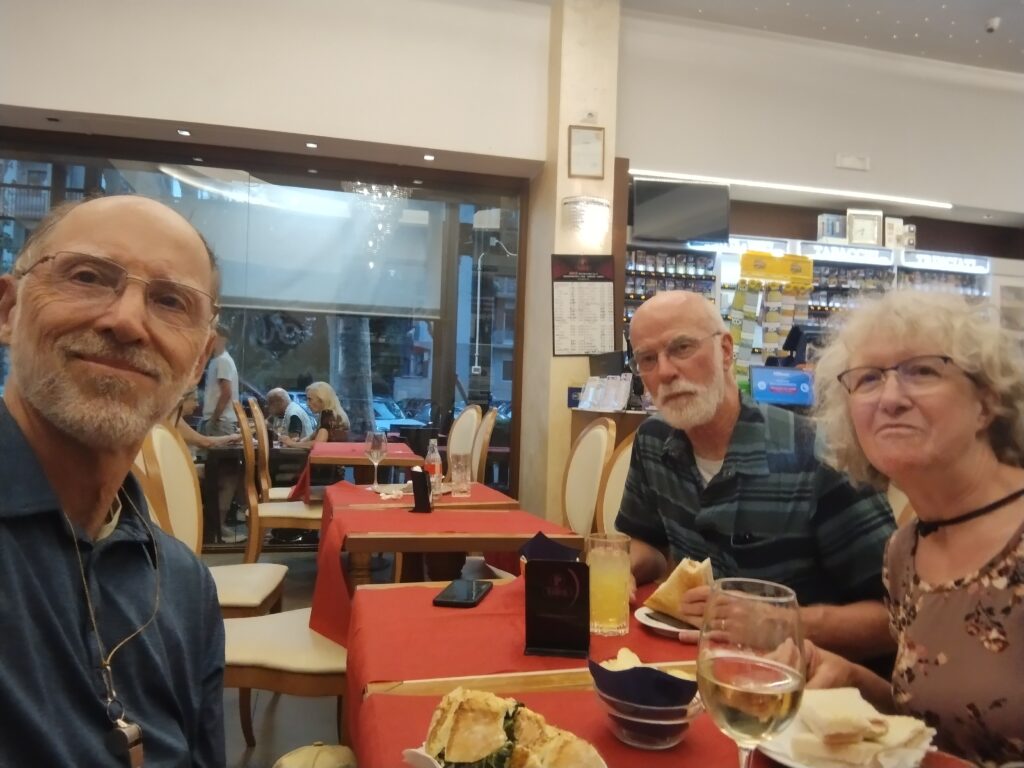
Pope Francis: Changing Catholic Culture but not Catholic Doctrine
By Robert Fontana
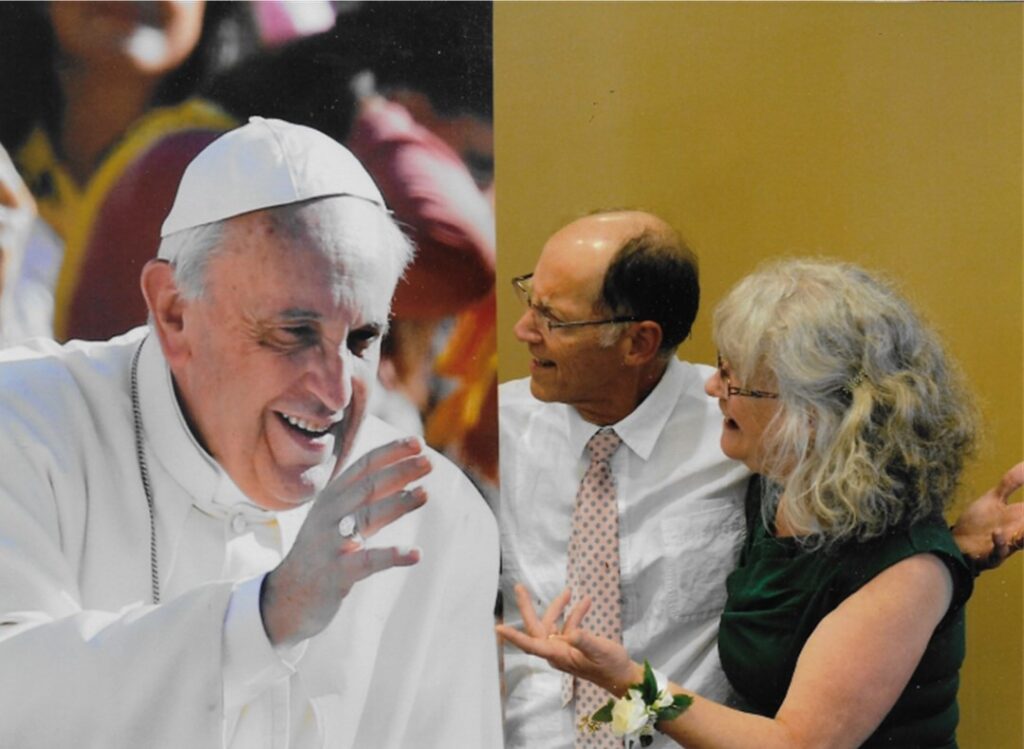
Pope Francis has a pretty good approval rating among Catholics in the United States. According to Pew Research, 83% of Catholics in the US have a favorable opinion of the Argentine Pope. However, there is a very vocal minority which includes high-ranking clergy who are very unhappy with the current pope and do not mind saying so. Commentators for EWTN, The Catholic Register and First Things and prominent prelates have called his papacy “a catastrophe,” “leaderless,” and “a betrayal.”
Advocates for greater protection of children, youth, and vulnerable adults and whistleblowers in the current crisis of clergy sex abuse and coverup are extremely disappointed in Pope Francis (Lori and I include ourselves in that camp). He says the right words but these often do not turn into effective action. A case in point is the very bizarre and sick story of Father Marko Ivan Rupnik, a celebrated Jesuit preacher and artist whose mosaics grace churches and basilicas around the world. Close to a dozen women, including Catholic sisters, have come forth accusing Rupnik of sexual, psychological, and spiritual abuse. The allegations were deemed credible by Jesuit investigators; yet Rupnik, who had been removed from ministry, was allowed to return. The public outcry was so great that just recently Pope Francis was pressured to reopen his case. (See: https://www.seattletimes.com/nation-world/pope-orders-vatican-to-reopen-case-of-priest-accused-of-adult-abuse-but-allowed-to-keep-ministering/)
In light of all this criticism, I think it is important to keep in mind that Pope Francis has not changed one Catholic doctrinal teaching or moral teaching. He is working to change Catholic culture, how we understand ourselves as a Catholic people and how we express this self-understanding in worship and mission. In doing this he is being faithful to the intent of the reforms of the Second Vatican Council which sought to transition from a Church that saw itself as a European monarchy (Council of Trent and Vatican I) to a Church that sees itself as the People of God from all the nations, sinful and holy, traveling through history. This People of God, clergy and lay, has a mission to be the mercy of God in the world as disciples of Jesus.
The following vignettes are examples of how I see Pope Francis changing Catholic culture without changing Catholic doctrine:
The new pope was introduced as “Francis,” a name no other pope has dared to take: Pope Francis said, “Francis is also the man of peace. That is how the name came into my heart: Francis of Assisi. For me, he is the man of poverty, the man of peace, the man who loves and protects creation; these days we do not have a very good relationship with creation, do we?” …Francis of Assisi “gives us this spirit of peace, the poor man who wanted a poor church,” the pope said. “How I would love a church that is poor and for the poor.” (https://www.ncronline.org/blogs/francis-chronicles/pope-francis-i-would-love-church-poor )
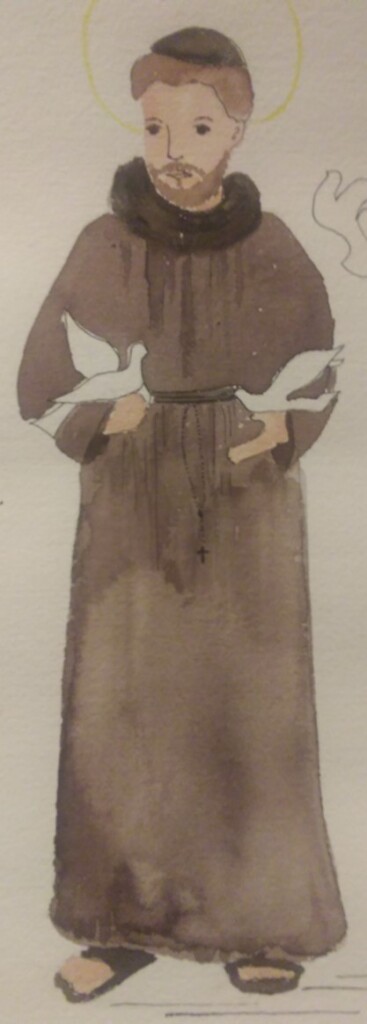
Pope Francis on the Sacraments: The Catholic Church is a “field hospital,” where the Eucharist is understood as medicine for the sick instead of a prize for the perfect…” (http://www.icatholic.org/article/the-church-as-a-field-hospital-6836071)
Remember when he said to priests… [be] shepherds living with “the smell of the sheep”, shepherds in the midst of their flock…” (https://www.catholicworldreport.com/2013/03/28/full-text-pope-francis-chrism-mass-homily/) There is that spirit of clericalism in the Church, that we feel: clerics feel superior; clerics distance themselves from the people. Clerics always say: ‘this should be done like this, like this, like this, and you – go away!’” It happens “when the cleric doesn’t have time to listen to those who are suffering, the poor, the sick, the imprisoned: the evil of clericalism is a…is a new edition of this ancient evil [of the religious ‘authorities’ lording it over others].” But “the victim is the same: the poor and humble people, who await the Lord.” ~ (https://aleteia.org/2018/08/23/5-of-the-many-times-pope-francis-has-railed-against-clericalism/)
Francis’ first trip as pope: Pope Francis has said Mass for migrants on Italy’s tiny island of Lampedusa, condemning the “global indifference” to their plight…Lampedusa, about 80 miles (120km) from Tunisia, is one of the nearest gateways to Europe for Africans fleeing poverty and conflict. (https://www.bbc.com/news/world-europe-23224010)
Francis changing the College of Cardinals Pope Francis created 21 new cardinals (Sept 2023) from across the world… created from 15 different countries… The pope also created cardinals representing Catholic communities in non-majority Christian countries: … Jerusalem; …Hong Kong; … Malaysia. In total, 16% of all cardinal-electors are now from Asia, compared with 9% before Francis’ pontificate…The pope has now created cardinals from 66 different countries…In contrast to the increase in cardinals from the global South and East, the percentage of cardinals from Europe has fallen from 53% in 2013 to 39% today…(https://ww.catholicnewsagency.com/ news/255528/pope-creates-21-new-cardinals-continues-expansion-of-college-s-geographic-diversity)
What he spoke about homosexuals: Italian journalist Andrea Tornielli asked the pope how he might act as a confessor to a gay person in light of his now famous remarks in a press conference in 2013, when he asked: “Who am I to judge?” “On that occasion I said this: If a person is gay and seeks out the Lord and is willing, who am I to judge that person?” the pope says. “I was paraphrasing by heart the Catechism of the Catholic Church where it says that these people should be treated with delicacy and not be marginalized.”
“…”I prefer that homosexuals come to confession, that they stay close to the Lord, and that we pray all together,” says Francis. “You can advise them to pray, show goodwill, show them the way, and accompany them along it.” (https://www.ncronline.org/francis-explains-who-am-i-judge)
Francis and a “synodal church:” In a certain sense, what the Lord asks of us is already contained in the word “synod.” Walking together – Laity, Pastors, the Bishop of Rome – is an easy concept to put into words, but not so easy to put into practice…A synodal church is a listening church, knowing that listening “is more than feeling.” It is a mutual listening in which everyone has something to learn. Faithful people, the College of Bishops, the Bishop of Rome: we are one in listening to others; and all are listening to the Holy Spirit, the “Spirit of truth” (Jn 14:17)… (https://www.thetablet.co.uk/texts-speeches-homilies/4/849/pope-francis-address-at-commemorative-ceremony-for-the-50th-anniversary-of-the-synod-of-bishops-17-october-2015)
(Post your comments. You are welcome to agree or disagree.)
Homespun Homily by Lori: Puzzle Wisdom for Marriage
“How do I love thee? Let me count the ways.”
So begins a famous poem, Sonnets from the Portuguese 43, by Elizabeth Barrett Browning. These lines came to mind as Robert and I completed a 1000-piece puzzle depicting the city of Seattle. 1000 pieces! There were many moments when we sighed and said to each other, “Look how many pieces we still have to do! This is hopeless. We’ll never get this done.” One thousand pieces – let me count them!

But after six weeks of working on the puzzle, we finally pushed in the last piece. At the end, it looked as if we were missing two pieces, but we found them, one under the table, and the last one hidden in the sofa cushions, as the sofa was pushed up against the table on which we had spread out those thousand pieces.
Why do I write about our completing a big puzzle? Because working a puzzle is good for marriage. Think about it. Putting a puzzle together requires many of the same skills as building a strong marriage: teamwork, patience, awareness, creativity, and checking in with each other: innumerable times I asked Robert, “What do you think this piece with a little red splotch and squiggly dark lines looks like?” Together, we also frequently consulted the picture guide that came with the puzzle – our puzzle roadmap, so to speak.
A successful marriage requires teamwork because marriage is a team effort. If our marriage is healthy, we will have many shared goals and use our gifts to help each other reach those goals. When Robert succeeds / wins, so do I. When Robert fits one or three or a dozen more pieces into the puzzle, it helps me to see where some of my puzzle pieces go. Our marriage has give and take, times when I support Robert, times when he picks up the slack for me. So I applaud each time he fits a puzzle piece in; he cheers me on when I finally discover where that piece with the red splotch goes.
Patience – now there’s a big one.
Countless times, I picked up a puzzle piece, sure that I knew where it went, only to set it back down again in the jumbled pile of loose pieces because it just didn’t quite fit there. Patience is essential in marriage. Why? Because nobody’s perfect. Life is entirely a learning experience from start to finish, and we are learning as we go. We shift life’s puzzle pieces this way and that until finally, alleluia, one settles perfectly into place. Ahhhh, what a good feeling that is. But if we give up too soon, we won’t discover where that darn piece goes.

Each puzzle piece is small and only a tiny part of the whole. Sometimes we have to step back to see the whole picture. Thus, awareness is invaluable. With this puzzle, we grouped pieces into “sky,” “buildings,” “boats,” and “water.” That helped. Looking at the whole scene, we had a better idea about where each piece might fit. At times in our marriage, we have to stop and take in a larger view. The day-to-day routine of work, family, activities, cooking, shopping – these are the building blocks of life, essential but not the whole picture. It is so helpful to take a breath and see the whole of our marriage.
For this, prayer is invaluable, our own personal prayer and prayer as a couple. Especially when the pieces of life aren’t fitting together very well, when the routine is too hectic, too boring, too exhausting – awareness, nurtured by prayer, reminds us that there is a greater reality guiding our relationship and giving meaning to our lives.
I readily admit that between Robert and me, he is the creative one. And putting a puzzle together does require some creativity. He is very good at looking at the “squiggly lines” on a one-inch puzzle piece and zeroing in on the area of the puzzle picture where it will fit. Interestingly, only recently did Robert decide he enjoyed puzzles. I think the isolation of the Covid quarantine nudged him to try a puzzle; and he ended up being quite adept at it and actually appreciating the challenge. Working a puzzle together has shown us that each of us brings gifts “to the table” to help accomplish the task. While I notice the tiny features of a color, shape or squiggle, Robert can see the overall design. In this case, my attention to detail complements Robert’s creativity.
Finally, back to the aspect of checking in: it is vital to a relationship and requires clear and kind communication. We asked each other for advice. We shared ideas and observations. I even let Robert put in the final puzzle piece.
But perhaps the greatest gifts for us as we worked the puzzle were how it fostered closeness, and it was fun! For some time each day, over weeks, we sat side-by-side at the puzzle table. We rubbed shoulders (literally) and reached around and across each other. We chatted and laughed as we worked toward a common goal. It was a sweet time together, time that nurtured our marriage.
Try a puzzle together!

But if puzzles just aren’t your thing, find an activity to do with your spouse that builds your loving relationship – riding bikes; walking in the park or hiking in the mountains; fishing or crosswords or refinishing furniture or cooking.
And, of course, remember to pray together. Couple prayer is the foundation of your relationship in Christ. These activities foster “togetherness” and fun, drawing out your gifts and strengthening your marriage.
Homespun Homily: Being a power for good with my limitations and diminishments
By Lori Fontana
We’re all on the road “home” to God. We all want to get to heaven…though not today, Lord. But we’re not just in a holding pattern here. What are we doing “while we wait” for entrance into our eternal home? The chorus from a 60’s church song contains my two main thoughts:
Love one another; love one another, as I have loved you.
Care for each other; care for each other, as I have cared for you.
And bear one another’s burdens, and share each other’s joys.
Love one another; love one another, and bring each other home.
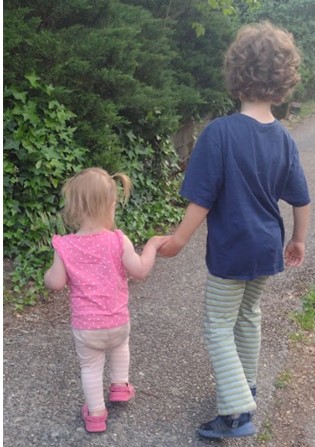
First, I recognize and embrace that I am a beloved child of God; and in this love, God gives me gifts and talents. None of us has ALL the gifts, nor are our gifts perfect; but each gift is valuable. It’s important that I not measure my worth according to a false hierarchy of gifts. When St Paul talks about the parts of the body, each part has a different function, but all parts are valued and needed. 1 Corinthians 12: 14 – 22
Secondly, who I am and the gifts I have – these are meant for me and for others, for the community. The Christian life is not just God and me.
The Christian life is a shared life. All love, including God’s love, is made real in the giving and the receiving. In the famous Rublev Trinity icon, the figures representing God the Father, God the Son – Jesus, and God the Holy Spirit are arranged in a circle, acknowledging each other. They are depicted in relationship with each other!
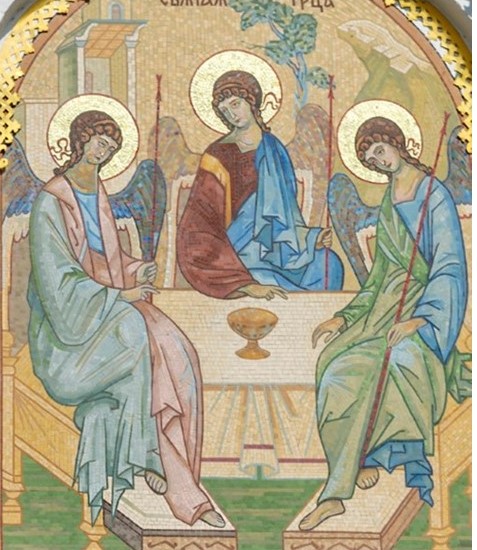
Each of us is created and loved by God. But from the moment we are born, we are diminishing, whether through illness or injury, external calamities such as job loss or natural disasters, or simply by aging. Where do we draw purpose and hope in light of diminishment? St. Paul offers a hopeful message: that even while we may appear to be “wasting away,” we are growing closer to our eternal glory in God. But we’re not called to retreat to a private corner and waste away. In the time we are given here, we are called to use our gifts to build up the reign of God, to be a power for good in the world. 2 Corinthians 4:7 – 10, 16 – 18
Our Catholic tradition offers the saints, people who, even though suffering limitations, were a power for good. Plus, there are saintly people all around us – “saints-in-the-making.” Here are a few examples.
Sr. Thea Bowman was an African American woman, born in rural Mississippi in the 1930’s. Hers was a loving family, but being a woman and an African American, in the rural south – these were challenges. Taught by Franciscan sisters, she was inspired to join their convent in Wisconsin – a group of all white women, some of whom had never seen a black person. Sr. Thea’s strong confidence in God’s love and purpose for her life carried her forward. She was a natural teacher, using all the gifts of her black Christian culture – song, dance, a deep faith honed through persecution – to guide her students. Until the end of her 50-some years of life, she remained hope-filled and faith-filled until finally succumbing to a painful cancer. In the midst of her illness, Sr. Thea famously said: “Part of my approach to my illness has been to say I want to choose life. I want to keep going. I want to live fully until I die.” Sr. Thea – a power for good!
My mom just turned 93 which brings with it the diminishment of physical and mental abilities and energy. In Mount St Vincent assisted living, she is welcoming and kind to everyone, a “missionary” for the love of Jesus. Though hard of hearing most of her life, she is otherwise quite healthy and gets up each morning with purpose. Even though she is shy, she reaches out to the people around her because she knows the challenges people face when moving into assisted living, and she wants to help. My mom – a power for good!
Joey K – Our friend Joey is a young adult who has Downs Syndrome. Some might say Joey has a difficult challenge. However, Joey doesn’t see it that way. He lives a full, successful life, energized by his desire to help – in his family, community, church, and workplace. From a very young age, he visited the elderly with his family. Now, Joey works at the retirement home. He does his job with great love and care, and he is a friend to all! Outside of work, Joey is a lead usher at Our Lady of Guadalupe Parish, and he always serves at funeral Masses. He is a member of the board of directors for the local Downs Syndrome Community organization. Joey is positive, outgoing, generous in sharing his gifts, and confident that he is loved by God. In that confidence, he loves others. He recognizes others’ gifts and draws them out. Joey – a power for good!
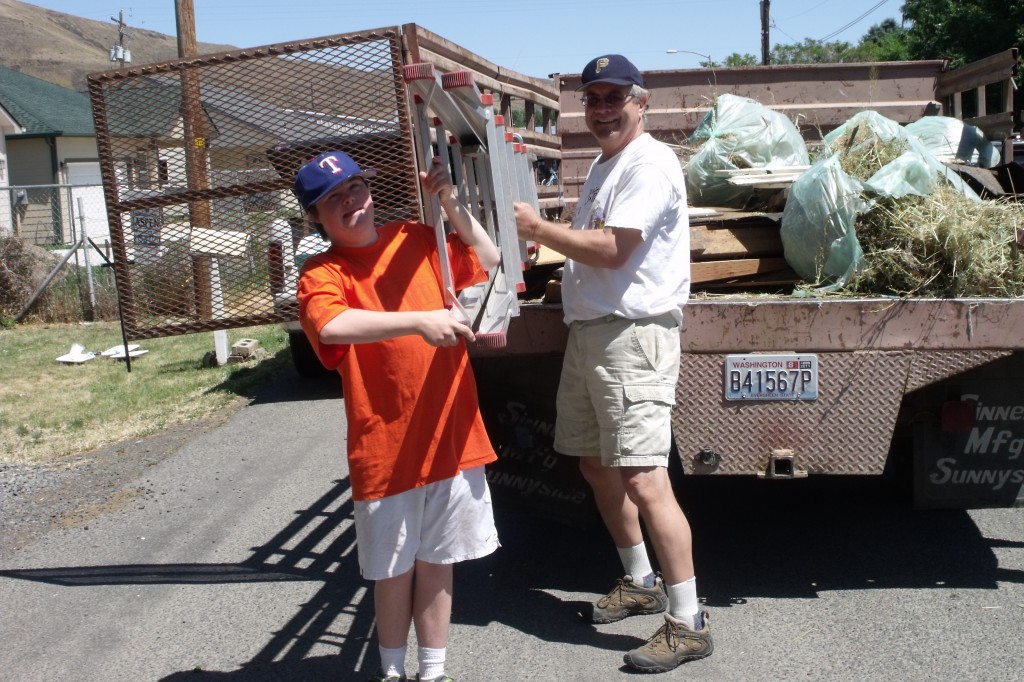
Each of you, I’m sure, knows many folks who, though dealing with their own challenges, use their gifts to help others. Each is a power for God’s goodness in the world. Every one of us is called to be a power for good. Even while, as St Paul says, we are “wasting away” in this life, we can be the hands and feet, heart and voice of Jesus in our world, as our own circumstances allow. We can be a power for good within the providence of our everyday life. What we do and how we do it will look different for each person; but we all can do something!
Mother Teresa encourages us with, “Not all of us can do great things, but we can do small things with great love.” And as Erma Bombeck, an author, humorist and devout Catholic, said:
“When I stand before God at the end of my life, I would hope that I would not have a single bit of talent left, and could say, ‘I used everything you gave me.’”
That’s being a power for good!
Saving democracy is a Catholic imperative
By Robert Fontana

By RsVe, corrected by Barliner. – File:Reichsadler Deutsches Reich (1935–1945).svg, Public Domain, https://commons.wikimedia.org/w/index.php?curid=27421526
Catholicism does not have a long history of supporting democracy as a national government. The Catholic preference for centuries was a Catholic king who would support Catholic life throughout the country. If a Catholic king was not possible, popes and bishops worked with whatever dictator or monarch would allow the Catholic Church to function with as little government interference as possible. This practice came crashing down on the Church and the world with the agreements (concordats) popes signed with Italy’s Benito Mussolini in 1922, and with Germany’s Adolf Hitler in 1933.
Initially, the Catholic Church benefited from these agreements. In Italy, Mussolini recognized the Vatican as a sovereign state, Catholicism was re-instated as the national religion, and clergy salaries were subsidized by the government. In Germany, Hitler recognized the Pope’s authority to appoint bishops. He also agreed to have the state financially support Catholic schools and provide for religious education of students in state schools.
 What did the Fascists and Nazis receive in return? They got exactly what they wanted: international legitimacy. Also, in Germany, bishops made a loyalty oath to the Reich, and Catholic social organizations agreed to refrain from political activism and do only charitable work. In time, because of the increasingly oppressive policies of the Italian and German governments, this arrangement diminished Catholicism’s impact in civil society. Catholic leaders exacerbated the situation by being too narrowly focused on their own institutional functions: Catholic sacramental and liturgical life, seminary education, support of the clergy, and support of religious education of children. They paid little attention to broader social issues, especially the growing state-sponsored violence against Jews and other minorities, aggressive preparations for war, and the barrage of propaganda produced to legitimize both. During this time, human rights, social justice, and the dignity and rights of all groups of people were not the focus of Catholic thinking.
What did the Fascists and Nazis receive in return? They got exactly what they wanted: international legitimacy. Also, in Germany, bishops made a loyalty oath to the Reich, and Catholic social organizations agreed to refrain from political activism and do only charitable work. In time, because of the increasingly oppressive policies of the Italian and German governments, this arrangement diminished Catholicism’s impact in civil society. Catholic leaders exacerbated the situation by being too narrowly focused on their own institutional functions: Catholic sacramental and liturgical life, seminary education, support of the clergy, and support of religious education of children. They paid little attention to broader social issues, especially the growing state-sponsored violence against Jews and other minorities, aggressive preparations for war, and the barrage of propaganda produced to legitimize both. During this time, human rights, social justice, and the dignity and rights of all groups of people were not the focus of Catholic thinking.
The bishops of the Second Vatican Council recognized this failure and, in a dramatic and revolutionary move, redirected the course of Catholic theology and pastoral behavior. For the first time in its history, the bishops of the Church recognized religious freedom as a fundamental right. They also committed the followers of Christ to full and active participation in the problems of the human family: The joys and the hopes, the griefs and the anxieties of the men of this age, especially those who are poor or in any way afflicted, these are the joys and hopes, the griefs and anxieties of the followers of Christ. Indeed, nothing genuinely human fails to raise an echo in their hearts. For theirs is a community composed of men.” (Pastoral Constitution of the Church in the Modern World, Art 1)
At the end of the 19th-and beginning of the 20th-centuries, the Vatican considered the United States an enemy of religion (see Americanism and Syllabus of Errors in Wikipedia). Today, however, the Vatican views the United States as a model of how religious communities, such as Christians, Muslims, and Jews, can co-exist in a pluralistic society without government interference. Each religious community can rise or fall on its own merits within a democratic government that protects the religious freedom of all. Therefore, what is essential to protecting religious freedom is protecting the democratic government that makes religious freedom possible.
Religious freedom is under threat in the United States today because democracy itself is under assault. Recently, some Catholic leaders have contradicted Catholic teaching by declaring it a mortal sin to vote for a specific candidate or anyone in that candidate’s political party. Many of these same Catholic leaders have remained silent during the maelstrom of controversy around the validity of the election itself and the attack on the United States Capitol building.
Since the attack on the US capital, many leaders of the Republican party have continued to undermine the democratic process by repeating what has been described as “the big lie:” that the 2020 presidential election was stolen. This continues even though 60 lower court decisions, three supreme court decisions, and the-then US Attorney General, Bill Barr, a Catholic, concluded that the election of 2020 was free and fair.
Joseph Goebbels, Hitler’s propaganda minister, once said, “If you tell a lie big enough and keep repeating it, people will eventually come to believe it. The lie can be maintained only for such time as the State can shield the people from the political, economic and/or military consequences of the lie. It thus becomes vitally important for the State to use all of its powers to repress dissent, for the truth is the mortal enemy of the lie, and thus by extension, the truth is the greatest enemy of the State.” (Inspiringquotes.us)
In the Catechism of the Catholic Church, lying is defined as a sin, and the gravity of a lie is measured by the “truth it deforms, the circumstances, the intentions of the one who lies, and the harm suffered by its victims.” It follows that a lie that “does grave injury to the virtues of justice and charity” is a mortal sin (Art 2484). The “big lie” that the 2020 election was stolen does such “grave injury” because it greatly undermines “justice and charity,” thereby eroding trust in democracy. Catholic bishops, clergy, and lay leaders must condemn this lie and definitively speak out the truth.
Saving democracy is a Catholic imperative. Our democratic society is the best hope for religious practice and freedoms. Safeguarding our democracy requires condemnation of the “big lie” and a clear statement of the truth. Only thus can we preserve what Winston Churchill called “the worst form of government except for all those other forms”: democracy.[i]
[i] Many forms of Government have been tried, and will be tried in this world of sin and woe. No one pretends that democracy is perfect or all-wise. Indeed it has been said that democracy is the worst form of Government except for all those other forms that have been tried from time to time.…’ https://winstonchurchill.org/resources/quotes/the-worst-form-of-government/
The Story of the Universe, of Earth, of Humans, and the Easter story
by Robert Fontana
“O God, you have been our refuge from all generations. Before the sun was born, before the galaxies came forth, and the Great Beginning, you are God from eternity and forever.” (Adapted from Psalm 90:1)

I remember the first time I saw photos from the Hubble telescope. THEY WERE STUNNING! Hubble captured images of stars, galaxies, nebulas and so much more, thousands of light years from Earth.
Hubble scientists focused its lens on a dark section of space and saw an astounding 50,000 galaxies. THAT’S GALAXIES NOT JUST STARS! Our own Milky Way Galaxy has an estimated 100-400 billion stars. EGADS! Our sun is a star. Imagine 400 billion of them times 50,000 that makes…wait let me ask one of my grands… “Ty, compute this for me!” There are unimaginable numbers of stars in the universe which is incomprehensibly vast.
Scientists estimate the universe to be 13.79 billion years old and Earth to be about 4.55 billion years old, give or take a few hundred million years.
Keep in mind that the “stuff” that makes up the stars and the planets, including Earth and all the creatures that inhabit the Earth, have a common origin in the beginning of the universe. Fr. Thomas Berry, who described himself as Geologian (Geologist + Theologian), wrote,
“To tell the full story of a single particle we must tell the story of the universe, for each particle is in some way intimately present to every other particle in the universe.” (The Universe Story – https://thomasberry.org/quotes/)
And…
“It takes a universe to bring human beings into being.” (Evening Thoughts – https://thomasberry.org/quotes/)
We humans emerged on earth only about 300,000 years ago. We are latecomers to life on the planet. According to Astronomy Workshop, if one could compress “the time the Universe existed into the span of a single day, with the Big Bang occurring at the stroke of midnight…humans crash the party at 11:59:56 pm, just four seconds before the end of the day.” (See https://janus.astro.umd.edu/front/pages/links/Time1.html)

In universe time, Jesus lived and died a nano-second ago.
As I marvel at the vastness of the universe story, I feel a tension between science and the Easter story, the Paschal Mystery: that God’s beloved son died for our sins, rose from the dead, was seen by a handful of his companions, ascended into heaven, and will come again at the end of time. All who are faithful to Jesus will live forever in paradise, and the unfaithful, well…
WHOA! It’s a story that sounds too good to be true. Too neat, too convenient. Why do only the followers of Jesus get to see the Risen Jesus? Why does he not show himself risen to all people? Can we really trust their story? No one can see him now, but don’t worry, he’s coming back. And when he does, he is going to wield a sword to strike down all the ungodly and bring everlasting life to his faithful followers. In the meanwhile, we try to live lives guided by the Holy Spirit as we wait for Jesus to come again.
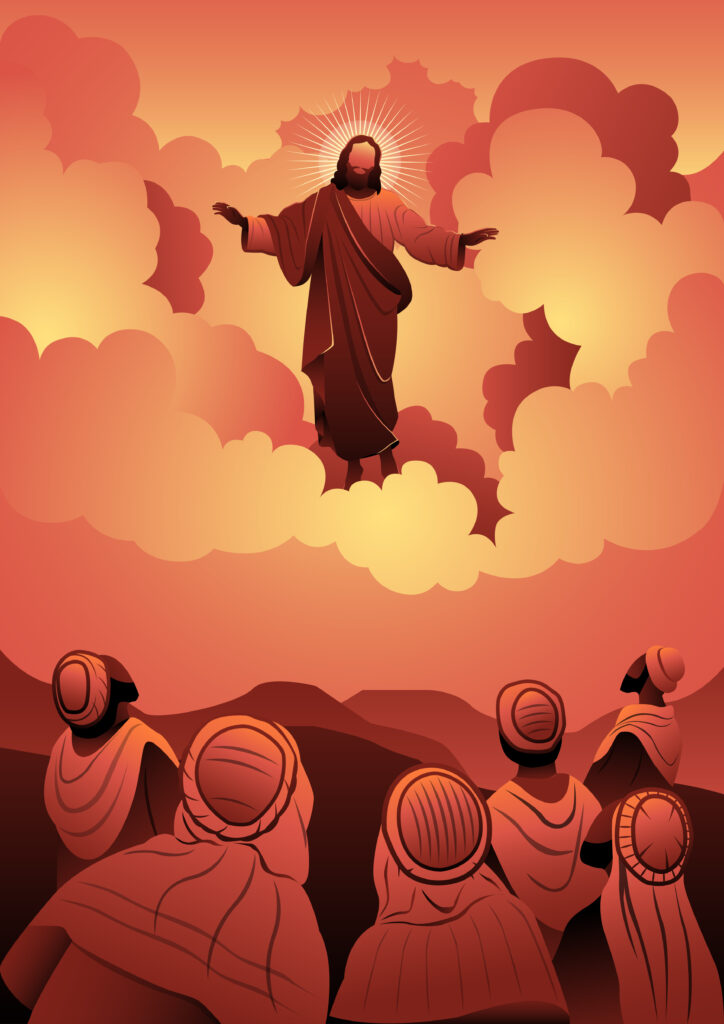
AND HOW DOES ALL THAT MESH WITH THE EVIDENCE FROM SCIENCE ON HOW THE UNIVERSE BEGAN, THE GALAXIES CAME FORTH, THE EARTH WAS FORMED AND HUMANS EMERGED?
I can just hear my agnostic college roommate saying, “With the evidence you have from science about the age and formation of the universe, do you believe this S**T?”
And, YES, I do believe, but it is not without some doubt and uncertainty.
Why do I believe the Easter story as presented in the Scriptures, proclaimed by the Christian community, and embraced by the saints? I think the primary reason is that I have experienced God’s love and forgiveness through my faith long before I began to grapple with the evidence from science. Initially, when I first saw the images of deep space taken by Hubble, I felt really scared. How could the story of Jesus and the story of the universe both by true? I felt like Moses when he was confronted by God in the burning bush. Do I throw water on the bush? Do I run away? Or do I follow God’s command to Moses: “Take off your sandals, for the place where you are standing is holy ground.” (Exodus 3:5) I chose the Moses route. And, yes, it was, and still is, a choice.
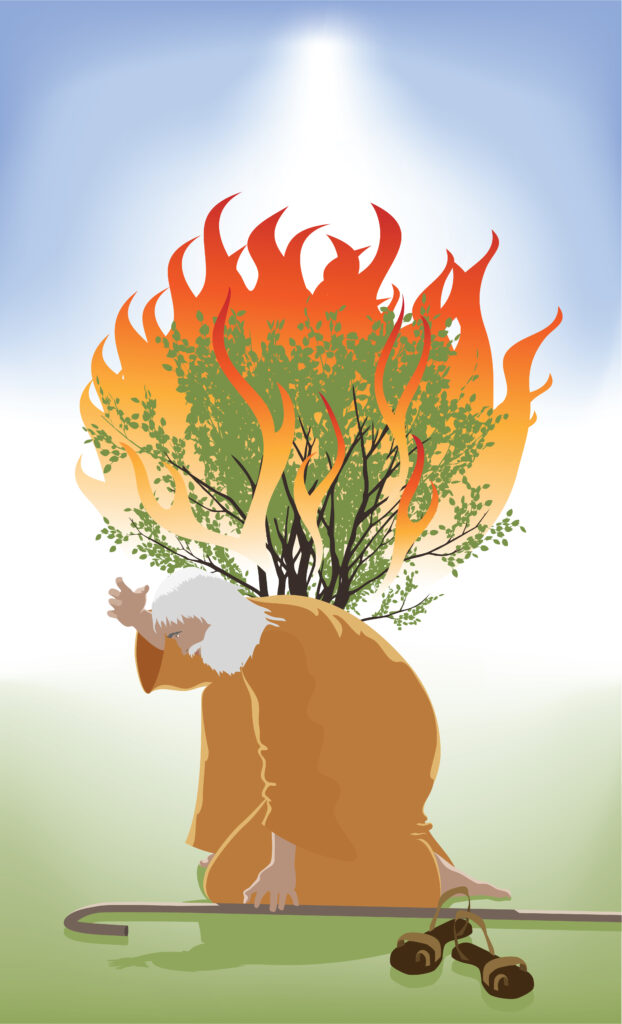
I also take my doubts to St. Paul. Reading his description of the appearances of Jesus gives me great comfort. Paul wrote his first letter to the Corinthians some 25 years after the death and resurrection of Jesus. It is the earliest written account that we have of the resurrection appearances, 15-20 years earlier than the written Gospels:
For I handed on to you as of first importance what I also received: that Christ died for our sins in accordance with the scriptures; that he was buried; that he was raised on the third day in accordance with the scriptures; that he appeared to Cephas, then to the Twelve. After that, he appeared to more than five hundred brothers at once, most of whom are still living, though some have fallen asleep. After that he appeared to James, then to all the apostles. Last of all, as to one born abnormally, he appeared to me. (1 Cor 15:3-9)
Paul’s summary of the appearances of Jesus is remarkable. Do I trust what he says? Do I trust what the Christian community has continued to say about Jesus for the past 2000 years even if Jesus’ life on Earth is just a nanosecond in universe time? YES!
During this Easter season I hold onto both remarkable stories as true: the story of the unfolding universe on which the human story is radically dependent, and the story of the saving work of Jesus through his life, death, resurrection, and sending of the Holy Spirit, on which the Christian story is radically dependent.
Alleluia! Happy, holy Easter!

A head scratcher: Hebrews 5:8 – “Son though he was, he learned obedience through suffering.”
By Robert Fontana

No, no, no! Jesus was the perfect child. He was naturally obedient to his parents, at least except for his little escape to the temple without telling Joseph and Mary, when they were in a tizzy not knowing where he was. Then how would he have needed to learn obedience to God through what he suffered?
Our faith teaches us that Jesus suffered for our sins through his death on the cross. As St. Paul writes:
We proclaim Christ crucified, a stumbling block to Jews and foolishness to Gentiles, but to those who are called, Jews and Greeks alike, Christ the power of God and the wisdom of God. 1 Cor 1:23-24
Indeed, the entire sacramental life of the Catholic church is based on this conviction that we participate in the meaning of Christ’s death whenever we celebrate any of the Sacraments, but especially the sacraments of Eucharist and Baptism:
For as often as you eat this bread and drink this cup, you proclaim the death of the Lord until he comes. 1 Cor 11:26
…are you unaware that we who were baptized into Christ Jesus were baptized into his death? We were indeed buried with him through baptism into death, so that, just as Christ was raised from the dead by the glory of the Father, we too might live in newness of life. Rom 6:3-5
The New Testament writers understood that Jesus is the Suffering Servant written about by Isaiah (Isaiah 52:13 – 53:12):
But he was pierced for our offenses, crushed for our sins; upon him was the chastisement that makes us whole, by his stripes we were healed. We had all gone astray like sheep, each following his own way; but the LORD laid upon him the guilt of us all.

The letter to the Hebrews teaches us that suffering for Jesus had a purpose, to teach him to obey God’s will for his life. This didn’t happen just in the garden of Gethsemane when he prayed that the suffering that lay before him be taken away. No, Jesus was being trained from childhood to bear a variety of different forms of painful events that enabled him to literally take up his cross at Calvary. The ancient Christian hymn cited by St. Paul in his letter to the Philippians underscores this very point:
…though he was in the form of God, he did not regard equality with God something to be grasped. Rather, he emptied himself, taking the form of a slave, coming in human likeness; and found human in appearance, he humbled himself, becoming obedient to death, even death on a cross. Philippians 2:6-8
How did Jesus during his lifetime learn obedience through suffering? This is what I think.
(1) Jesus learned to say “yes” to God by saying “no” to temptation. Jesus was not just tempted when he encountered the Devil during his 40-day fast in the wilderness. He was tempted throughout his entire life with real temptations, as we all face. We have a glimpse of how Jesus was tempted when we read how he struggled in the garden to face the suffering and death that were coming: “Abba, Father, take this cup from me.” Mark 14:36
Did Jesus struggle in a similar way with other temptations? Why not? He was fully human in all ways but sin. He must have had to wrestle with the seven deadly sins – pride, anger, greed, envy, gluttony, lust, and laziness – as we all do.
For we do not have a high priest who is unable to sympathize with our weaknesses, but one who has similarly been tested in every way, yet without sin. Hebrews 4:15
(2) Jesus learned obedience to God by saying “no” to family expectations. His family and relatives from Nazareth were good Jews. They were just as offended by Jesus’ behavior as were the religious leaders, so much so that family members tried to remove Jesus from circulation, and the synagogue leaders of Nazareth had him expelled:
When his relatives heard of this, they set out to seize him, for they said, “He is out of his mind.” Mark 3:21
He came to Nazareth, where he had grown up, and went according to his custom into the synagogue on the sabbath day. They rose up, drove him out of the town, and led him to the brow of the hill on which their town had been built, to hurl him down headlong. Luke 4:16-29
I don’t think we can overstate how difficult this was for him in a kinship culture in which family relationships dominated Jewish life. Loyalty is expected, even demanded. Yet Jesus must break through family expectations to truly listen to his Father’s will for his life.

(3) Jesus learned obedience to God’s will by suffering through opposition from Jewish religious leaders. These leaders watched what Jesus was doing and were outraged by it: breaking Sabbath regulations; eating and drinking with tax collectors and prostitutes (sinners); including women as his disciples; healing servants of the hated Romans; and insisting that God’s love was breaking into the world through him. Their only explanation for such scandalous behavior was that Jesus must be possessed:
The scribes who had come from Jerusalem said, “He is possessed by Beelzebul,” and “By the prince of demons he drives out demons.” Mark 3:22
(4) Jesus learned obedience to God by suffering through the departure of many of his disciples who lost confidence in him. This loss of confidence began before the great betrayal of Jesus by his disciples on the night he was betrayed. John records that after Jesus finished a series of teachings, many of his disciples found what he said was so hard to take; and they left him. It got so bad that Jesus turned to the Twelve and said, “Do you also want to leave?” John 6:67-71 The Twelve, led by Peter, decided to stay.

(5) Jesus learned obedience to God as he confronted the reality that the “Good News” he was preaching will get him killed. As Jesus set his eyes on Jerusalem (Luke 9:51), it became clear to him that his Gospel message of the Kingdom of God would not find a home among his Jewish listeners. This clarified things for him. He knew that if he continued doing what he was doing, his future path was one of suffering and death. He was ready for it. He had been training for this moment his entire life. This is echoed in the letter to the Hebrews:
In the days when he was in the flesh, he offered prayers and supplications with loud cries and tears to the one who was able to save him from death, and he was heard because of his reverence. Son though he was, he learned obedience from what he suffered; and when he was made perfect, he became the source of eternal salvation for all who obey him. Hebrews 5:7-9
Jesus’ suffering as the “Suffering Servant” did not begin with Good Friday. He was being trained for his passion and death, for his Good Friday, throughout his entire life, as he learned to obey God’s will for him despite temptations, the opposition of religious leaders, the rejection by family and relatives from Nazareth, and the abandonment by some of his disciples and friends.
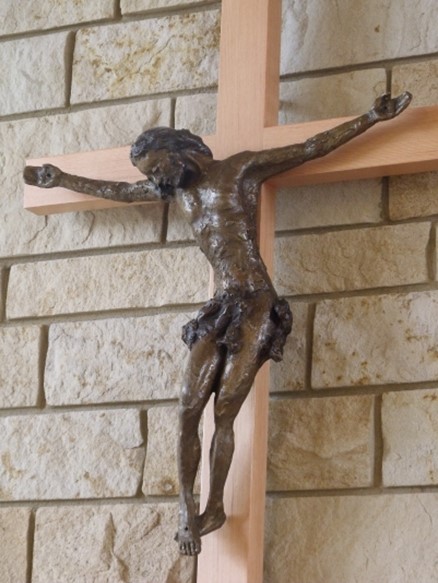
Perhaps the same is true for us. We too learn to do what is right, to do God’s will for our life, through our struggles with temptations, bad religion, and inadequate expectations from family and friends. The “Serenity Prayer” has a line that reads, “Suffering is the pathway to peace.” Jesus shows us the truth of that wisdom. He learned obedience through suffering; so do we.
A woman bishop, a president, and a solution to the migrant and refugee crisis
By Robert Fontana
You may have never knowingly met men and women who are living in the United States without documentation, but you have certainly benefited from their presence. As Episcopal bishop Mariann Edgar Budde reminded the newly elected president on inauguration day, these are…
“…the people who pick our crops and clean our office buildings, who labor in poultry farms and meat packing plants, who wash the dishes after we eat in restaurants and work the night shifts in hospitals. They may not be citizens or have the proper documentation, but the vast majority of immigrants are not criminals. They pay taxes and are good neighbors. They are faithful members of our churches and mosques, synagogues, and temples.”[1]

There is no accurate method for determining the precise number of people who are unauthorized immigrants. In 2022, the Office of Homeland Security estimated the number to be about 11 million.[2]
Keep in mind that the wealth of this nation is built on the backs of these hardworking, good and humble people. And the MAGA world led by Trump, many who are farmers, ranchers, contractors, hospital managers, CEOs and CFO’s of companies, and also ordinary citizens who directly benefit from the labor of migrants, have embraced the Trump scapegoating of them as “rapists, murderers, and criminals.” A few may be, but the vast majority of them are not!
(See: https://www.factcheck.org/2018/06/is-illegal-immigration-linked-to-more-or-less-crime/)
Bishop Mariann pleaded with the new President: rather than treat them as criminals, could he honor their dignity and show them mercy:
Let me make one final plea, Mr. President,…I ask you to have mercy…on those in our communities whose children fear that their parents will be taken away and that you help those who are fleeing war zones and persecution in their own lands, to find compassion and welcome here. Our God teaches us that we are to be merciful to the stranger for we were all once strangers in this land. May God grant us the strength and courage to honor the dignity of every human being, to speak the truth to one another in love, and walk humbly with each other and our God for the good of all people. The good of all people in this nation and the world.[3]

I completely agree with Bishop Mariann. However, I don’t think she went far enough. Rather than simply asking for mercy for migrants and refugees, Bishop Mariann ought to have proposed a solution that would benefit the country and probably give President Trump a new constituency of supporters: citizenship for all migrants and refugees who seek it and have no criminal record.
While in the seminary in 1976, I was part of a community of students who welcomed refugees from Vietnam, one who became my roommate. Lori and I helped resettle refugees from Cambodia in the 1980’s. The individuals we helped, and the thousands helped by non-profits across the country became good citizens, excellent employees, owners of small businesses, and taxpayers. The same happened after the passage of the Immigration and Reform Act of 1986 under President Reagan, giving men and women living in the US without documentation a path towards citizenship under certain conditions. Did some commit crimes? YES, but very few. Did most settle in, they and their children quickly integrating into American life? A resounding YES!
With Biden’s executive action on June 4, 2025, the southern border was tightened up and essentially closed. Border and migration tension have intensified under Trump. Now is the time to change direction. Stop deporting migrants and refugees who are here doing the grunt work that few native-born Americans want to do.
Lori and I and two of our daughters have worked on the border. We have seen firsthand the young, hardworking, resilient, courageous, creative, and intelligent men and women, many with their children, who have made the long journey from their home country to the USA. Their home countries are losing the best and the brightest, their greatest assets and talents, their youth, to migration.
The US is not being “overrun” by these migrants, we are benefiting from them! In giving the undocumented migrants and refugees a path to citizenship, Trump would succeed in keeping the harvest picked; the elderly and infirm well cared for; meat cut, packaged, and sent to stores; and small migrant-owned businesses continuing to serve the local community. After these welcomed migrants become citizens, they will remember at the next election which party cared for them and acted on their behalf.

Mass deportation of migrants and refugees is not the answer to their undocumented status. Citizenship is. Citizenship is in the US’s self-interest. It is also the just and Christian thing to do. It is how the Gospel mandate to welcome the stranger, feed the hungry, clothe the naked, care for the sick could be implemented nation-wide.
[1] https://carmenmccain.com/2025/01/22/transcript-of-bishop-mariann-budes-sermon-during-the-2025-us-inaugural-prayer-service/
[2] https://ohss.dhs.gov/sites/default/files/2024-06/2024_0418_ohss_estimates-of-the-unauthorized-immigrant-population-residing-in-the-united-states-january-2018%25E2%2580%2593january-2022.pdf
[3] https://carmenmccain.com/2025/01/22/transcript-of-bishop-mariann-budes-sermon-during-the-2025-us-inaugural-prayer-service/
The Lenten season that changed my life
By Robert Fontana
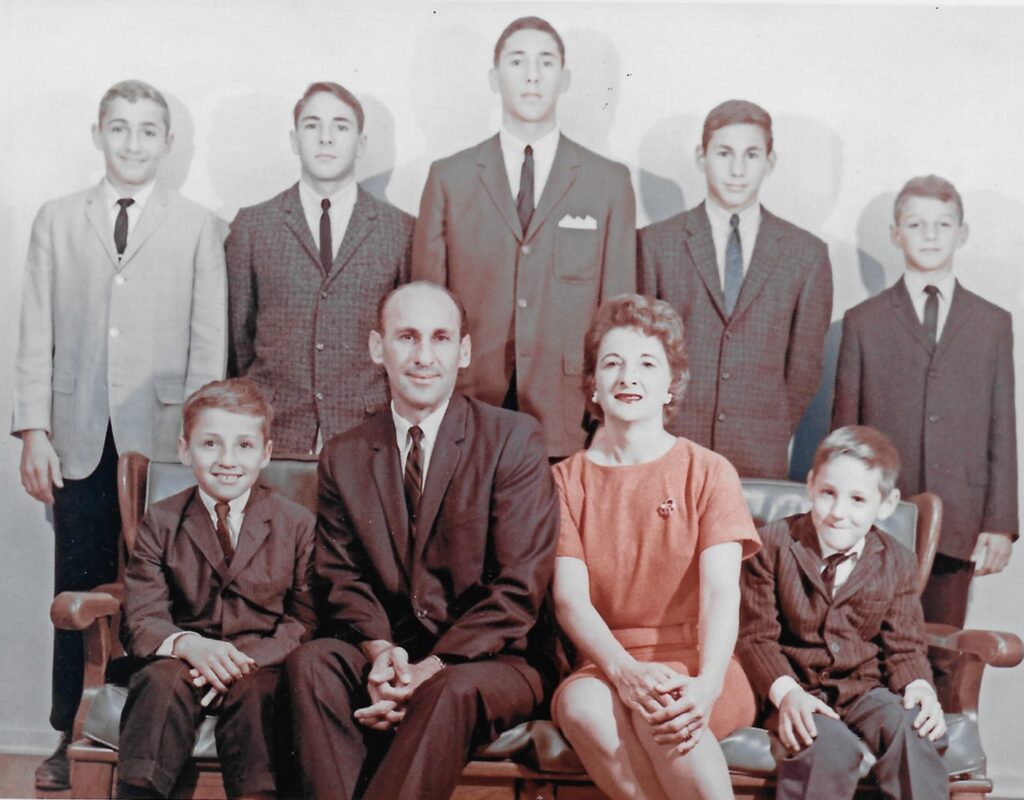
I was raised in a conventional Catholic family. Faith in God was tied to being part of a community of people that shared a culture based on specific practices: Mass on Sunday and holy days; praying the rosary, abstaining from meat on Fridays, etc. We were raised like the comedian Kathleen Madigan, who remembers how the nuns taught her,
“DON’T BOTHER JESUS! You have a guardian angel who’s with you 24/7; go to your him if you have a problem. You can turn to one of the saints; there’s one responsible for every facet of life. You can try Jesus’ mother – ask her for help. But DON’T BOTHER JESUS.”
Ok, maybe that’s a slight exaggeration.
We had a family Bible but never read it. Our only family review of Scripture was while praying the “mysteries” of the rosary which focused on Jesus’ birth, death, and resurrection. His life and teachings were assumed, I suppose, to be part of cultural Catholicism.
That all changed for my parents when, after 20 years of marriage, they weren’t getting along. Rather than going to a divorce court, they went to a Catholic Charismatic prayer meeting. Their lives were turned upside down. They met Jesus and the Holy Spirit in a surprising and beautiful way. They discovered God’s love for them and God’s will for them: to love one another. Their transformation became my transformation.
Throughout high school I struggled with all the things teenagers struggle with but what helped me to cope was daily Bible readings, prayer, and a desire to do God’s will. By the time I was a high school senior, I started hearing an inner voice that said, “Why don’t you become a priest?” I remember fighting it. “NO! I DON’T WANT THAT! I want to go to college, to watch football games, to date girls.”
God won that argument. I went to a college seminary situated on acres of pine woods north of New Orleans. It was my first experience of being in such a quiet environment with all boys and with NO GIRLS! I hated it.
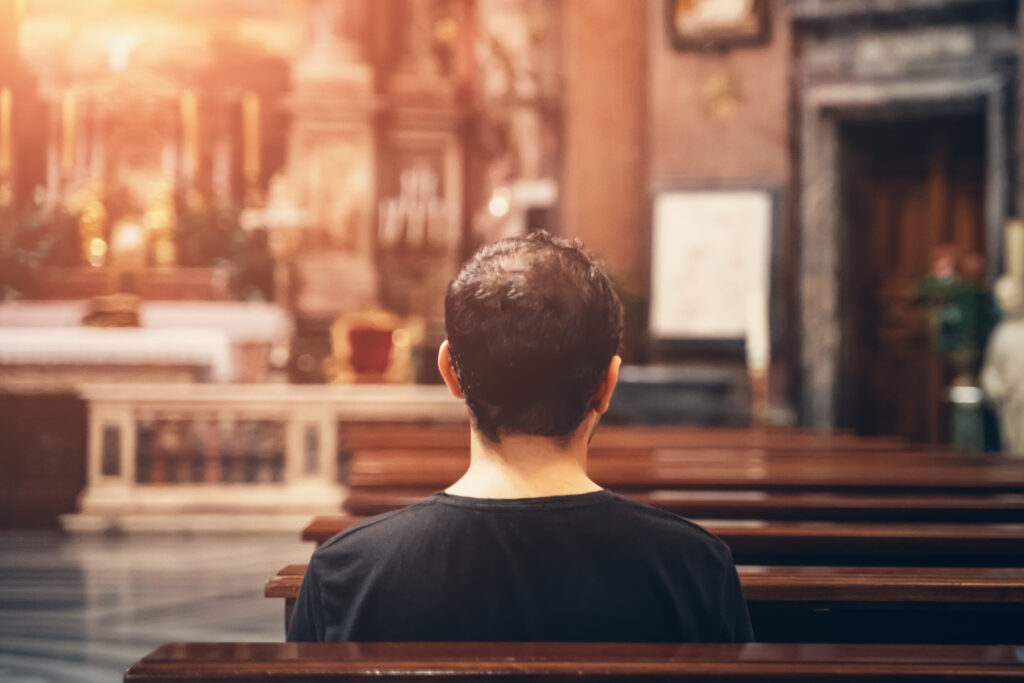
It took me a good month to transition to the rhythm of life offered by the Benedictine monks at St. Joseph Seminary. That life began with sung prayer of the Psalms at 6:15 in the morning, class beginning at 8:30 or 9 am, Mass at 11:15, more class, free time, and work study in the afternoon, evening prayer with the monks at 5:30 pm and night prayer with the seminarians at 9:30. I was being disciplined into a new way of being a Catholic follower of Jesus.
During a fall day of prayer, the retreat director, Fr. Ambrose, said something that seems simple and “duh” now, but at the time was very new to me. He suggested that we spend a lot of time outdoors and listen to “nature.” Many of my classmates laughed at his suggestion. Fr. Ambrose was a man who would not swat a mosquito sucking blood out of his arm because he wanted to learn something from the insect. Yet, for me, what he said struck me as truth.
I tried to tune in to nature during the day. The beautiful, natural surroundings touched me, had a calming effect on me. I would occasionally get up early before morning prayer and spend time alone at the nearby river.
When Lent came around the following Spring, Fr. Ambrose again gave us students a recommendation that I took to heart. He suggested that during these 40 days we remove one item from our room as an outward sign of removing an attachment in our heart that might be keeping us from loving God and loving my neighbor. That very night I resolved for Lent I would remove one item each day from my room, and I would begin each day with a half hour of silence at the river before morning prayer.
Something very profound began to happen to me. I became aware of the beauty, peace, and healing balm that nature had to offer me. By the time Holy Week came, my room was completely emptied of all items on my wall, bed, and bookshelf. My heart had become still, quieted by nature’s touch. I felt so close to God, at peace with myself and the world around me.
I learned from that Lenten journey what Moses, the prophets from the Hebrew Scriptures, Jesus, and the saints all knew from their life with God: nature is a primary place of encounter between God and humans.

In Catholic language, nature is a “Sacrament.” It is an “outward sign, something one can experience through the senses – seen, touched, and heard – instituted by God, that gives grace.” In fact, it is the original “Sacrament” upon which all other Sacraments are built. Without nature, there is no “burning bush” before Moses, no “cloud by day” leading the Hebrews from Egypt, and no Word of God becoming “flesh” in baby Jesus.
Once while praying in a nearby park whose trees and shrubs were left to grow wild and free, I felt like I was in the womb of love. I wrote a poem about my relationship with the Sacrament of Nature inspired by the words of St. Augustine and an old Catholic hymn. I share it with you below. May you take time this Lent to cultivate a deeper life with God by allowing nature that you have access to – from your garden or nearby park to a mountain stream or the vast ocean – quiet your soul and draw you into a beautiful encounter with God.
“How late have I loved thee, O Nature, ever ancient and ever new.
O Sacrament most holy, O Sacrament divine, how late have I reverenced you, bowed before your beauty, knelt before your mystery like Moses before the burning bush.
You give life and death. You water, plant seeds, grow forests, birth creatures, including me, and receive us in death.
I played in your fields, ate from your fruits, stole from your treasures, always thinking you and I are different, separate. I had forgotten that I came from you, and I will return to you. As the Scriptures write, “For you are dust, and to dust you shall return.” (Gen 3:19) Clearly, I am nature too.
Forgive me, O sacred friend, forgive me for loving you too late, way too late, and having caused you so much harm. Late have I loved thee, O Beauty ever ancient and ever new, but it is not too late for me to change.

As you begin Lent, Remember to “Bury the Alleluia”
By Robert Fontana
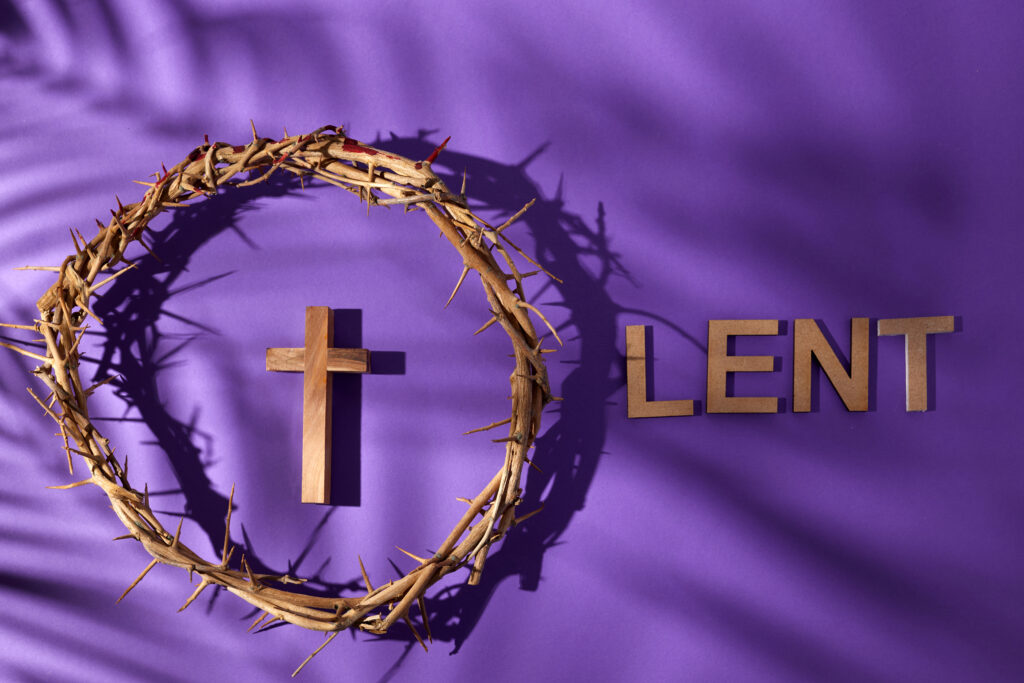
During Lent we walk with Jesus to the cross. We walk with the Messiah who had to suffer for our sake and our salvation; and we join in his work of redemptive suffering. We do penance and acts of self-denial, which train us to bear suffering for the love of God. And if we are going through a time of actual suffering because of difficult life circumstances, such as illness or confronting real evil and injustice in society, we carry the cross of that suffering because it too can become life-giving and redemptive through Christ.
Let us especially carry in our hearts the suffering people in the Ukraine, the suffering people in Gaza and Israel, the suffering people escaping violence and migrating for a safer life, the suffering people who live on our streets, the suffering people in difficult marriages and unhealthy relationships, the suffering women and couples and their unborn child in a crisis pregnancy, and…(you add your list).
Such a somber and serious season needs a party, one last “hurrah,” to help us enter into it properly. Thus in Catholic countries all over the world the season of “Carnival” and “Mardi Gras” is celebrated before Lent. A very appropriate way to bring closure to Carnival and Ordinary Time and transition into the penitential season of Lent is literally to bury the word “Alleluia.” That word, usually sung before the reading of the Gospels at Mass, is not sung during Lent. It will not be heard again until the Easter vigil when the Church celebrates the resurrection of Jesus, who is God’s “Alleluia” to the world.
So, sometime this weekend, gather with your family and friends to transition into the Lenten season and bury the “Alleluia” using the following prayer service, or something similar.

Bury the Alleluia in Preparation for Lent – A prayer service to help you and your family, prayer group, office, and/or parish prepare for Lent. You can do this any day during the week of Ash Wednesday to the first Sunday in Lent.
Materials: Take a legal size sheet of paper and, using a marker, write in large print “Alleluia.” Have other markers of different colors available. You will also need a shovel.
Leader Lent is upon us. It is the time we remember when God’s “Alleluia,” Jesus, took away the sins of the world through his death on the cross.
All Alleluia! Alleluia! Alleluia!
Leader The word “Alleluia” is a Hebrew word which means “Praise the Lord.” It is appropriate to call Jesus “God’s Alleluia” because his entire life was an act of praise and worship of God.
R1 Jesus is the word of God who is fully human and fully God.
All Alleluia! Alleluia! Alleluia!
R2 Jesus was obedient to Mary and Joseph, and from them he learned to do his Father’s will.
All Alleluia! Alleluia! Alleluia!
R3 Jesus preached the Kingdom of God. He invited women and men to repent and believe in the good news of God’s immense love breaking into human history.
All Alleluia! Alleluia! Alleluia!
R4 Jesus gathered together a community of disciples, women and men, and taught them the Beatitudes.
All Alleluia! Alleluia! Alleluia!
All Our Father…
Lent, “The White Rose,” and These Troubled Times
By Robert Fontana

I do love Lent, which begins on Ash Wednesday (March 5), but I resist it as well. Lent invites me to consider what is at the heart of being a disciple of Jesus – love of God and neighbor, especially those who are poor, marginalized, and scapegoated. I resist because, well, I don’t always want to be challenged to correct a fault or engage an issue that might take time, energy, and money.
I have also come to suspect the surface piety of Lent – adding fast days, praying the rosary every day or attending daily Mass – when it doesn’t also reach down to one’s heart. We become complicit in the sins of the culture when we just reinforce a cultural Catholicism that keeps us focused on our personal salvation (and that of our family members) but ignores the suffering of “my neighbor” in society.
Christian on the outside, but opposite on the inside. This is not new to Catholicism specifically or to Christianity in general. I’m reading the biography of the abolitionist and formerly enslaved Frederick Douglas. He writes bitingly against the slaveholders from the South who got on their knees at night in prayer, read the Scriptures daily, and faithfully attended church on Sunday. Yet these same men and women enslaved human beings, fed them starvation diets, beat them on a whim, raped the women, ignored their own children born from rape, and worked all the enslaved people, children to old people, from dawn to dusk.
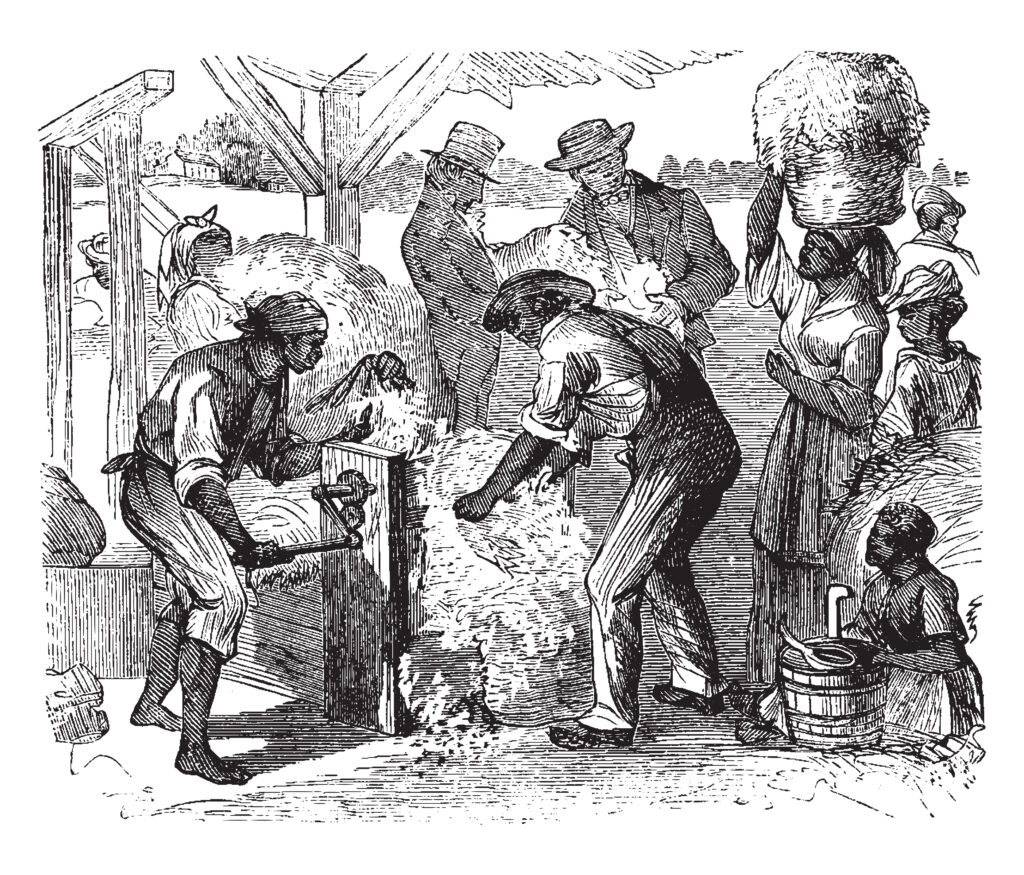
Douglas writes, “I can see no reason, but the most deceitful one, for calling the religion of this land Christianity. I look upon it as the…boldest of all frauds, and the grossest of all libels. Never was there a clearer case of ‘stealing the livery of the court of heaven to serve the devil in.’ I am filled with unutterable loathing when I contemplate the religious pomp and show, together with the horrible inconsistencies, which every where surround me.”[1]
Among these Christian slaveholders were many Catholics including Jesuits who enslaved hundreds of men, women, and children on their farms in Maryland.[2]
One of the critiques of the Catholic Church in Europe following World War II was that it was more concerned with self-preservation than about the general welfare of the people being persecuted by the Nazis, especially the Jews, but also communists, Protestant intellectuals, Roma people, and homosexuals.[3] In a sobering response to the failure of the Catholic Church to respond to the social crisis created by the Nazis, the bishops at the 2nd Vatican Council, in a deliberate effort to be faithful to the Gospel, committed the church to advocate for and stand in solidarity with suffering humanity:
The joys and the hopes, the griefs and the anxieties of the men of this age, especially those who are poor or in any way afflicted, these are the joys and hopes, the griefs and anxieties of the followers of Christ. Indeed, nothing genuinely human fails to raise an echo in their hearts.[4]
Five outstanding Nazi opponents from within Germany were university students : Hans and Sophie Scholl (brother and sister), Alexander Schmorell, Willi Graf, and Christoph Probst, led by their philosophy professor, Kurt Huber. They formed an anti-Hitler group called The White Rose, a reference to all that was beautiful, good, and Christian about their Germany before the Nazi takeover. (see https://jetsettimes.com/countries/germany/munich/the-white-rose-movement/}

“The group wrote, printed and initially distributed their pamphlets in the greater Munich region. Later on, secret carriers brought copies to other cities, mostly in the southern parts of Germany. In July, 1943, Allied planes dropped their sixth and final leaflet over Germany with the headline “The Manifesto of the Students of Munich”…They denounced the Nazi regime’s crimes and oppression, and called for resistance…they openly denounced the persecution and mass murder of the Jews.” (https://en.wikipedia.org/wiki/White Rose)
They were captured in 1943, humiliated at a public trial, and three were sentenced to death by guillotine: Hans and Sophie Scholl, and Christoph Probst. What courage!
That brings me to these “Troubled Times.” Chaos reigns from the White House. Federal workers are being fired on a whim. Federal agencies that serve the American people, from its national parks, to disease prevention, education and even Medicaid, are being undermined. Our closest neighbor nations are being threatened, American allies are being bullied, and dictators are being embraced. And tragically, men, women, and children, fleeing their home countries because of poverty and violence are scapegoated as rapists and murderers who need to be rounded up and deported. (At least the Catholic bishops have gained a spine to speak out against this travesty.)
Every Christian, Catholic and Protestant, shaped by the ethics of the prophets from the Hebrew Scriptures and by the example and teachings of Jesus, cannot help but be outraged at the injustices coming from the White House. This is not a partisan issue. Conservatives like former vice-president Mike Pence, Liz Cheney, and Adam Kinzinger, all fully committed to the president’s agenda in his first term, are severe critics in his second.
Ask yourself, is this the path that I want the United States of America to travel? Consider the courage of the Munich martyrs when they did their part to stand up to Hitler. What will you and I do to confront the areas of darkness unfolding before us now?

During this Lent I pray that you and I will take moments to meditate on the Scriptures especially the writings of the prophets and the four Gospels. One passage that stands out for me is Micah 6:8:
He has shown you, O mortal, what is good. And what does the Lord require of you? To act justly and to love mercy and to walk humbly with your God. (New International Version)
[1] Douglas, Narrative of the Life of Frederick Douglass, an American Slave. p. 107-108, Modern Library, NY, NY © 2000.
[2] https://en.wikipedia.org/wiki/1838_Jesuit_slave_sale
[3] https://en.wikipedia.org/wiki/Reichskonkordat
[4] Pastoral Constitution of the Church in the Modern World, Article 1
Join us this Lent for “Holy Week with Jesus and his Disciples in the Cenacle” (Ash Weds – Mar 5)
By Robert Fontana
The word “Cenacle” refers to the “Upper Room” where Jesus gave his disciples the Eucharist, washed their feet, and taught them of the Father’s love and the gift of the Holy Spirit. It is also the place where Jesus regathered the disciples following his resurrection to “breathe” on them the Holy Spirit and send them out as missionaries.
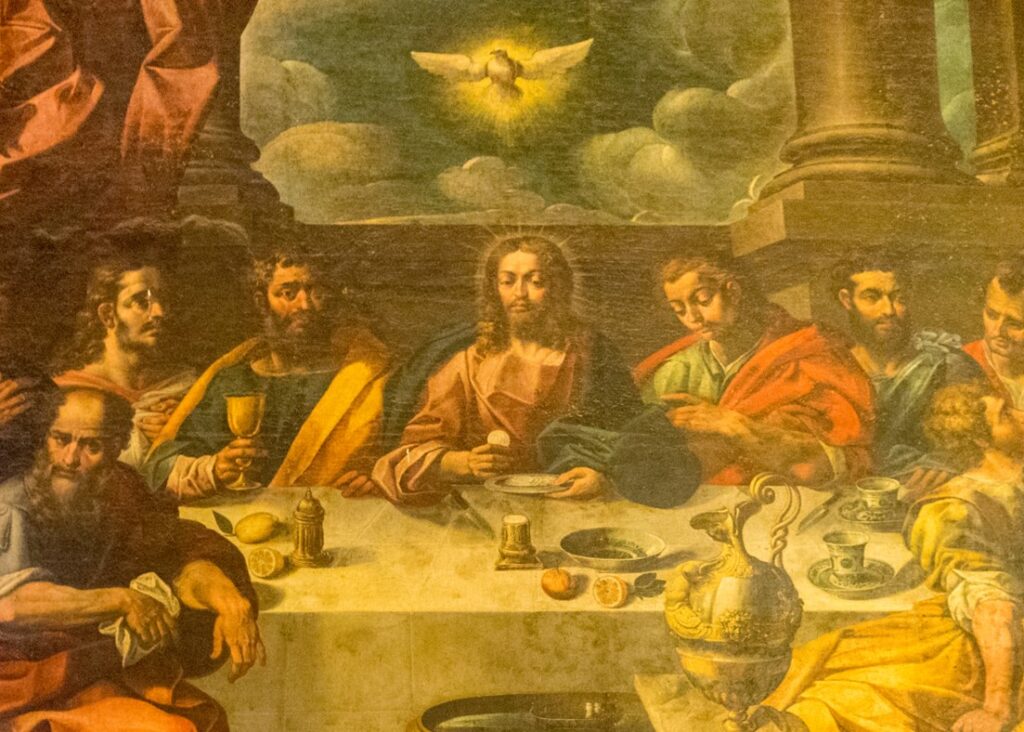
During Lent, we will be hosting a weekly small group Scripture study and faith-sharing series called Holy Week with Jesus and His Disciples in the Cenacle. It will be held at Assumption Parish. This Lenten series begins on Wednesday, March 12 (7:00 – 8:30 pm) for in-person sessions (also offered via Zoom); and will be repeated on Thursday mornings via Zoom only, beginning March 13, 9:00 – 10:30 am.
To register, or if you have any questions, write Robert and/or Lori at roblori.fontana@gmail.com. Once you have registered I will send you a pdf of the booklet that we will be using so you can print it out yourself. If you are not able to print out your copy, let us know and we will mail you one.
Here’s the introduction to the booklet.
Introduction: The Gospel of John, more than the other Gospels, tells the unique experience of the disciples of Jesus during the days before and after his death, while they were gathered in what is called in Greek the “Cenacle,” meaning the upper room. The “Cenacle” refers not only to the upper room; it refers to the community of disciples who were privileged to be with Jesus during this time.
While in the upper room, Jesus sealed his relationship with his followers, the Cenacle, by:
1) giving them the Eucharist;
2) leaving them an example of service by washing their feet;
3) revealing to them the Father’s love and the gift of the Spirit;
4) leading them to the cross;
5) and, after his death, regathering them in the Cenacle, the upper room, to mission them by breathing on them his Spirit.
These intense moments with Jesus gave the first Cenacle the core dimensions of faithful discipleship that are essential for Christians in all generations.
Fr. Thomas Judge, a Vincentian priest (1868-1933), recognized this early in the 20th Century when he began the modern Cenacle movement in the United States. It became clear to him that if the Church was going to make a difference in the lives of people, especially the immigrant poor, who were at that time coming to the United States in great numbers from Italy and Eastern Europe, it was essential for Catholics to become the Cenacle of the New Testament. He desired that every Catholic become an apostle, and he knew that would only happen if Catholics participated wholeheartedly in a Cenacle, in which the Eucharist, service, love of the Trinity, solidarity with the cross, and empowerment by the Holy Spirit were lived realities.
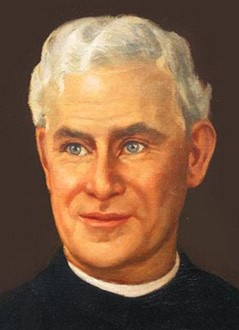
Father Judge formed Cenacles in different parishes in which he preached retreats. He taught these Cenacle missionaries to be a power for good within the providence – relationships and commitments – of their everyday lives. By instructing Cenacle associates in the lived experience of the New Testament Cenacle, Fr. Judge inspired these lay apostles to “be the Church” in their homes, neighborhoods, and workplaces. They would then come together as a Cenacle to respond to the local needs of the parish and /or civic community, especially by serving the poor.
The Cenacle Family was begun by Fr. Judge, who then recruited the assistance of Mother Boniface Keasey and Dr. Margaret Healy. This movement eventually developed into four different communities: the lay branch – the Missionary Cenacle Apostolate (MCA); the women religious – the Missionary Servants of the Most Blessed Trinity; the men religious – the Missionary Servants of the Most Holy Trinity; and laity under private vows – the Blessed Trinity Missionary Institute.
Yet each of these branches shares the same charism and mission: to help every Catholic (and Christian from any faith tradition) to become an apostle.
Lori and I were introduced to the Cenacle through the Cenacle priests serving at the campus ministry we attended while in college. Fr. Dennis Berry, ST, recognized in us the same sort of apostolic spirit that Fr. Judge sought to instill in the laity and invited us to enter the Missionary Cenacle Apostolate (MCA). We made our act of consecration in the mid 1990’s and have lived out our Catholic life as Cenacle missionaries ever since. We have been joined by friends and supporters of CLM. Together we form the Magnificat Cenacle in Seattle.

The purpose of this faith-sharing booklet is to help you reflect on the intimate and transformative experience that the original Cenacle had with Jesus during the days before and after His death. We pray that, in your own study, reflection, and prayer, you will experience similar intimacy and transformation in your life as you deepen your vocation as an apostle, also helping others to become apostles of the Father, Son, and Spirit.
Send me an email at robert@catholiclifeministries if you would like to participate.
Grieving Orca Mom, Pro-life, and the Culture War
By Robert Fontana

I often hear from my liberal friends who are Christian how confounding it is for them that conservative Christians, including Catholics (my faith tradition), support Donald Trump, whom the Christian Left considers the most un-Christian president in US history. The Christian Left does not seem to understand that they helped create the MAGA Right in which many conservative Christians find a home (and, of course, Christians on the Right do not understand that they helped create the Progressive Left).
This was vividly illustrated for me recently in a Seattle Times opinion article entitled, “How we can honor the orca Tahlequah’s grief.” The article highlights the plight of the orcas whose food source, the chinook salmon, is in decline and whose way of life in the Salish Sea (Puget Sound) is continually challenged by commercial shipping and the ever-present whale-watching tourist boats. I share the author’s concern about the stress orcas are enduring and the sad plight of this mother orca who, for the second time in the past few years, has carried her dead calf weeks after the calf’s death.
However, what struck me about the headline is the vivid reminder to Christians on the Right that their brothers and sisters on the Left care more about the plight of orcas than about the unborn. One will never see in the Seattle Times a headline grieving the loss of the unborn child through abortion. The Left insists that a woman’s right to her body is absolute. “My body, my choice.” End of discussion!
The Christian Right is equally unwilling to dialogue. “We have science on our side; human life begins at conception:” this is not simply a religious conviction, it is a scientific fact. The fetus in the womb is a baby with the inalienable right to life. Oh, and, yes, it’s your body, but you don’t have an absolute right over how you treat your body. If you are pregnant, there is a baby whose rights outweigh yours. End of discussion.

Other issues push each side further into its corner with no option for compromise, for example, racism, transgenderism, and immigration. The immovable stances fuel a culture war in a zero-sum game which creates only winners and losers. Democracy demands uncomfortable compromises so that we do not actually end up with another shooting war like the one in 1861.
Long before I joined “Braver Angels,” an organization dedicated to dialogue between the Left and the Right, I had an extended conversation with a liberal friend that convinced me that dialogue, listening for understanding, and compromise were the only paths forward to end the culture war in our church and country on abortion. Here’s what happened:
Me: Pro-choice and pro-abortion. They’re the same.
Friend: NO!! I’m pro-choice, but I’m not pro-abortion.

Me: C’mon. You constantly use the phrase “fetus” when talking about an unborn baby. You know the science of conception as well as I do. The fetus in the womb is a baby from the moment of conception. Pro-choice means abortion on demand and the death of a baby.
Friend: If you would listen to me, I’ll explain. Yes, I agree with the science, and I also admit that I refer to the baby in the womb as a fetus and not a baby. I want to honor the dignity of the woman who has a crisis pregnancy. You seem to care little about her. (Pause)
Friend: I abhor abortion. To be pro-choice means to offer her (and her husband/partner if she has one) two options for saving the baby’s life, raising the child herself or giving the child up for adoption. The third option is tragic, but it is not the government’s call to prevent should a woman with a crisis pregnancy choose it. She knows her situation.
[My friend went into detail about a young white woman from a very conservative family who was secretly dating a young black man. When her father found out about this relationship, he hit his daughter and threatened to kill the young man if she didn’t break it off. Shortly after this she learned that she was pregnant; immediately she had an abortion.] I don’t want a woman in her situation to have a back-alley abortion.
Me: No, I don’t want women to have a back-alley abortion either…I don’t think I have given enough consideration to the woman with a crisis pregnancy. So, there are two lives that must be considered, protected. Would you agree to that?
Friend: Yes, that’s why I say I am not pro-abortion. Abortion is a tragic choice especially as the fetus, the “baby” develops. Pro-choice means, in the end, the choice does rest with the mother. I will do whatever I can to help her choose life for the baby, but I will not throw a guilt trip on her either.
Me: Where do we have unity?
Friend: I suppose we can both agree that two lives must be valued and protected if possible.
Me: And I have a better understanding that pro-choice is not pro-abortion. And I also agree that the mother’s situation really needs to be honored and respected, though I do not agree with the idea that the government can not regulate abortion. (Our conversation ended peacefully there.)
We did not solve the abortion debate with this conversation. But we did stop seeing each other as adversaries on this issue. We learned from one another, which allowed each of us to soften our positions. We both changed. Our next conversation might find some common ground on the legal boundaries of abortion that either of us may not like but could live with for the sake of peaceful coexistence.
I think dialogue and a search for common ground is the only path forward for ending the culture war between the Left and the Right. What do you think?
(Please post your thoughts and comments.)
Consider Joining Braver Angels. Its mission is to bring Americans together to bridge the partisan divide and strengthen our democratic republic. Go to: braverangels.org

YEAH, A Week to Celebrate Marriage (Feb 7-14)
By Robert Fontana
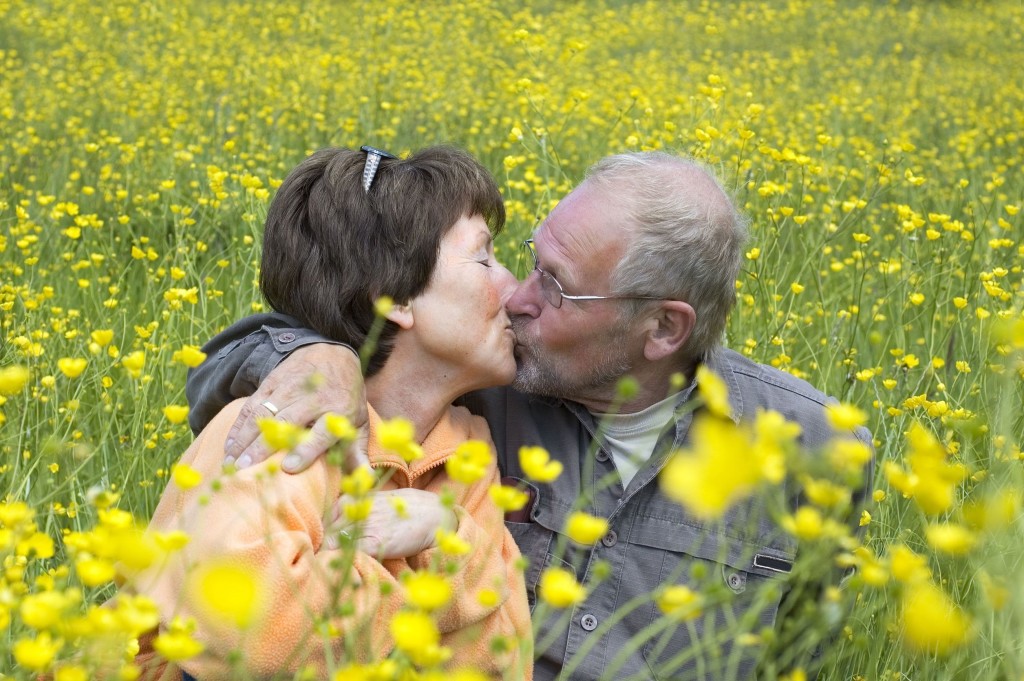
NATIONAL MARRIAGE WEEK is February 7-14! I find it a little discombobulating to write about something so positive while the country dissolves into chaos over Trump’s dismantling of democracy. Still, it is NATIONAL MARRIAGE WEEK, and I’ll keep my focus on this important civic and religious institution. I’m a believer in the institution of marriage and will do whatever I can to help couples of all stripes – religious, secular, straight, gay – to succeed in marriage.
THERE ARE NO LOSERS WHEN MARRIAGE SUCCEEDS! Everybody wins, from the couple to their children, should they have some, to their extended family and friends, to the workplace, and to the civic and faith communities.
To be successful in marriage does not mean to be perfect in marriage because perfection does not exist. But success does. We know from research what a successful marriage looks like and how to achieve it. In a nutshell, couples who succeed in marriage learn how to negotiate their differences so that the marriage wins. They remain the best of friends, work as a team, communicate reasonably well, share household duties, parent the children, meet regularly for mutually satisfying intimacy, are good neighbors, mature through conflict, and forgive one another for shortcomings.
This doesn’t mean that single people can’t do the same, especially single parents as was my grandmother who raised my mom and aunt. Single parents can succeed, but it is so much harder.
This also doesn’t mean that everyone should eventually marry. However, the trend today is that most men and women are going to “hook up” with one or multiple partners, especially when they are young. Many want the mirage of freedom that comes from “friends with benefits and no commitment.” As clients of mine, both men and women, have told me, after a couple of years of living this lifestyle, they are left feeling empty, hurt, used, and alone.
What they really need to help them grow up is traditional marriage as it has come down to us over the generations with its three vows of “fidelity, love, and honor,” and a supportive community that will stand with them in good times and bad, in sickness and health.
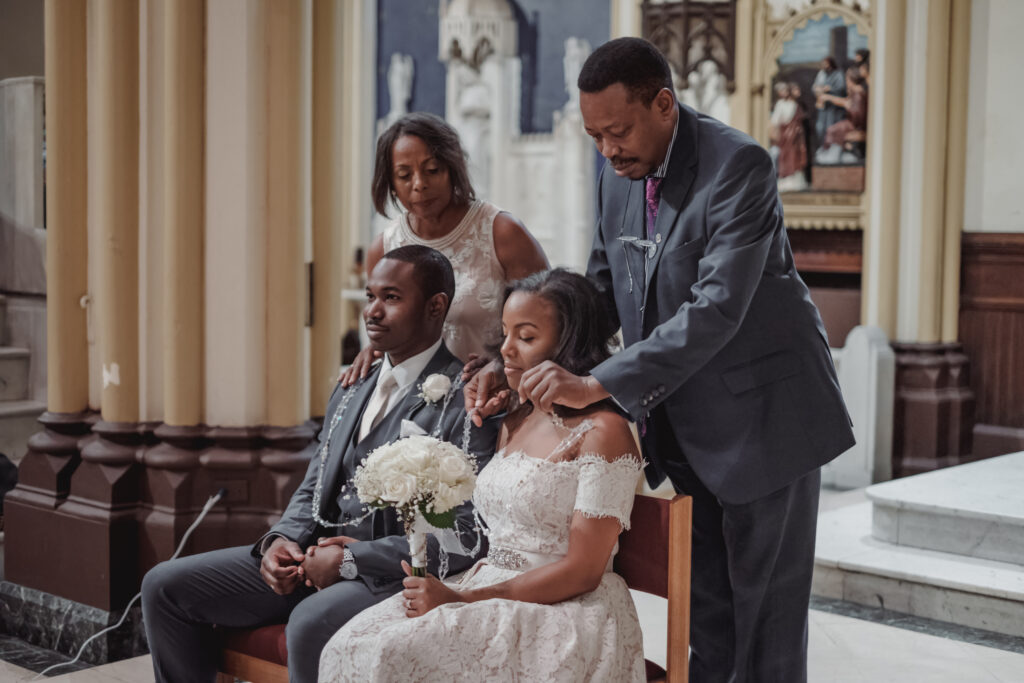
The vows provide the essential framework that disciplines spouses and fosters a mature love over a lifetime. The community of friends and family who believe in marriage offers positive examples of married life, peers and elders who share the joys and sorrows of married life, and single elders and peers who offer friendship and mutual support.
Not all marriages can be successful. Some people, for reasons stemming from childhood trauma, addiction, or irreconcilable hurt, must divorce for the sake of their sanity. But I’m convinced that most marriages can be saved and become successful if only spouses would make their marriage their primary commitment from the “get-go.” In doing so couples will take care of their relationship in the same way that they care for their garden or car or career; use whatever metaphor you like. Gardens need fertilizer, watering, and weeding; cars need gas, tune-ups, and repairs; and careers need internships, supervisors, and on-going training.
If you are married, it is important to determine how you are doing in married life. Take the quiz and find out! Indicate your level of agreement with each statement with 1=No, 5=Sometimes, and 10=Yes.
1. We approach our life together as a team.
No Sometimes Yes
1 2 3 4 5 6 7 8 9 10
2. We are aware of each other’s gifts and talents, and use them in the marriage.
No Sometimes Yes
1 2 3 4 5 6 7 8 9 10
3. Marriage has helped me to mature; it brings out the best in me.
No Sometimes Yes
1 2 3 4 5 6 7 8 9 10
4. We agree on our approach to money: saving some, meeting needs, and sharing.
No Sometimes Yes
1 2 3 4 5 6 7 8 9 10
5. We live a healthy balance of work, leisure, exercise, and sleep.
No Sometimes Yes
1 2 3 4 5 6 7 8 9 10
6. We take care of each other during illness and difficult times.
No Sometimes Yes
1 2 3 4 5 6 7 8 9 10
7. We agree on our approach to faith, family devotions, and service.
No Sometimes Yes
1 2 3 4 5 6 7 8 9 10
8. We are good friends and regularly make time for fun together.
No Sometimes Yes
1 2 3 4 5 6 7 8 9 10
9. We are very good at dealing with conflict.
No Sometimes Yes
1 2 3 4 5 6 7 8 9 10
10. I am very satisfied with our romantic, sensual life!
No Sometimes Yes
1 2 3 4 5 6 7 8 9 10
Tally individual numbers and place scores in the appropriate spaces below. Add the scores. The higher the score, the more successful the marriage. 70 + =Successful; 40-60 = needs work; 30 and under = HELP!
When I think about my marriage, I feel…____________ (select any of the feelings listed below that apply)
Positive emotions: Loved, happy, peaceful, connected, grateful, hopeful, other _______________
Difficult emotions: Uncertain, sad, hurt, restless, distant, regretful, despairing, other ___________
If you have a successful marriage or one that needs work, keep working on your marriage. Read books together, e.g. Gottman’s The Seven Principles for Making Marriage Work. You might even try the workbook Lori and I wrote, Hidden Treasure: Discovering the Amazing Gift of Your Marriage. (Both books can be ordered from your local book store.) I suggest you also attend a retreat for couples or a marriage enrichment weekend such as Marriage Encounter.
If you’re marriage needs HELP, don’t wait, contact a therapist trained in couple’s conflict right away. You will not regret turning a difficult marriage into one that fosters love and intimacy.
Spring cleaning on St. Brigid’s Day (Feb 1) and other non-essential Catholic practices that enrich faith
By Robert Fontana

St. Brigid is one of three patron saints of Ireland along with St. Patrick and St. Columban. Her feast day, February 1, also marks the first day of Spring in Ireland. A person could go all his or her life without having fun with a spring cleaning on St. Brigid’s Day, as we outline below, and still be a very fine Christian. Obviously the same is true for another unique event for Catholics coming up on March 5, Ash Wednesday. These events have some hands-on gestures and rituals that may seem odd to the casual observer. On Ash Wednesday we receive a cross of ashes on our foreheads. On the eve of St. Brigid’s Day (February 1), we use a kerchief to literally swipe our homes clean and symbolically remove it of “sin and selfishness.” Then we tie the cloth to a tree, where the spirit of St. Brigid and the Holy Spirit, come to take the sins away. These faith-based rituals can be somber, as in receiving ashes on Ash Wednesday, or fun as on St. Brigid’s Day. What they do is help us sanctify the day, making it special by allowing our entire body to participate in the meaning of the day. The actions and gestures of these events are an outward sign, a symbolic gesture, of our belief as disciples of Jesus, yet they are not essential to discipleship.
What are the essentials of being a disciple of Jesus anyway? Here are a few that come to mind: belonging to a community of faith that follows Jesus; encountering Jesus in a personal way and making a conscious decision to follow him by living out the Beatitudes; opening one’s life to the Holy Spirit; belonging to a small group where one is personally loved and held accountable as a disciple; participating in public worship and community rites; maintaining a consistent prayer life that involves the praying/studying of Scripture; engaging one’s faith within daily life; caring for the sick, elderly, poor, and for children.

These “essentials” are the “meat and potatoes” of following Jesus but, to continue the food analogy, without much seasoning or dessert. I think that it’s the addition of the non-essentials that adds spice and fun to one’s faith. For example, the liturgical year that divides up secular time into sacred seasons of Advent/Christmas, Lent, Easter/Pentecost, and Ordinary Times, is certainly not an essential feature of being a Christian. Some deeply Christian denominations function perfectly fine without a “liturgical year.” Yet we Catholics, joined by the Orthodox and mainline Protestants, find it extremely useful to organize the year around the major themes of Jesus’ life, death, and resurrection. In doing so, we think we are better able to tell the story of Jesus’ life and integrate His message in our lives today.
The “Sign of the Cross” is another non-essential and arbitrary practice that Christians do that has helped shape an identity that is deeply Christian and Catholic. In that one action, we remind ourselves of the saving work of Jesus through his death on the cross, and of our dependence on the Trinity, Father, Son, and Holy Spirit. Can a person be a good Christian and never make the “sign of the cross”? Most certainly. Some Christians bow their heads when they begin a prayer. Catholics (and Orthodox) make the “Sign of the Cross.” It summons us to quiet ourselves, and be attentive to what God is doing in the moment, whether it be followed by the blessing of a meal or the committal of a beloved family member to the grave.
I think a relationship with Mary, the mother of Jesus, especially manifested through the practice of praying the rosary, is a non-essential practice of Christian discipleship. One could go his or her entire life without ever praying to Mary, much less saying the rosary, and still be a deeply committed follower of Jesus. St. Paul makes no mention of Jesus’ mother except in one obscure text in Galatians (4:4). Certainly Paul never prayed to Mary and never thought that what she brought to the life of a disciple was important enough to write about. Protestants, taking their cue from Paul, also do not pray to Mary (or the saints) and yet are still following Jesus as committed disciples. Mary and the rosary are non-essentials to Christian discipleship. But I believe a devotion to Mary, so deeply imbedded in Catholic culture, is a wonderful gift from God that deepens faith, hope, and love.
Of course, there are many other non-essentials such as observing the feast days of saints, praying to St. Anthony for lost items, blessing pets on the feast of St. Francis, wearing religious medals and scapulars, lighting candles as a prayer offering, fasting on Wednesdays and Fridays, and “burying the Alleluia” on Mardi Gras, the Tuesday before Ash Wednesday. None of these practices is essential to Christian discipleship and, if done these are done apart from the essentials, they have little meaning. But when these rituals are done in conjunction with being an active follower of Jesus, they have the capacity to shape a Catholic Christian identity that gives a person deeper roots and brings joy and fun to the Christian life.
So add some spice to your faith life. On St. Brigid’s Day (Feb. 1), wipe your home clean of sin, and on Mardi Gras (Mar 4) bury the Alleluia (see rituals below). Then on Ash Wednesday (Mar 5), the very next day, go to the nearest Catholic Church and get your ashes.
______________________________________
St. Brigid’s Day “Spring Cleaning” (February 1)
Prayer: Saint Brigid, daughter of Ireland and lover of Jesus, draw us by your prayers into the living flame of God’s love. Help us to clean our hearts and homes of all that is selfish and self-centered. We forgive all who have hurt us and ask God to forgive our sins as well.
Pray for us, St. Brigid, that we will be attentive to the poor and spiritually abandoned, that we will practice the Beatitudes in good times and bad, and that the warmth of God’s love will animate all that we say and do.
Activity: Each member of the home takes a kerchief or handkerchief in hand and walks through the house dusting the furniture and books, and lamps, etc. singing “Alleluia, alleluia, alleluia.”
When the house has been thoroughly dusted, all go outside and tie the kerchiefs on the branches of a tree. The myth is that, on the eve of her feast day, St. Brigid, in the grace of God and the power of the Holy Spirit, travels through the land with her prayers to remove the dust and sin, and even ailments, from our lives.
Closing Prayer: St. Brigid, come this day, to our home and hearts, come by the power of God, and be our guest. And help us, dear Brigid, to wipe away the dust of “me, my, and mine” that we might love others with a selfless heart. Amen.
Our Father…
Leave the kerchiefs and handkerchiefs on the tree for a week or until Ash Wednesday.
BURY THE ALLELUIA on “Mardi Gras (Mar 4)” the day before Ash Wednesday (Mar 5)

All Alleluia! Alleluia! Alleluia!
Leader For the 40 days of Lent the Church “buries the Alleluia” by refraining from singing this sacred word in our liturgy. We do so to remember the Lord Jesus, God’s alleluia, the Lamb of God, who took the sins of the world with him to the grave so as to rob them of their power to destroy life.
What are the sins of the world today that destroy life? Say them aloud as you write them on a sheet of paper bearing the word “Alleluia.”
[After all have done so the “Alleluia” is placed in the ground and buried with dirt in the same way that Jesus who died for the sins of the world was placed in a tomb following his death.]
All Gracious God and Father, your beloved Son Jesus suffered death to give us life. Help us during this Lenten season to deny ourselves and serve others in imitation of Him who lives with you, and the Holy Spirit, one God forever and ever. Amen!
